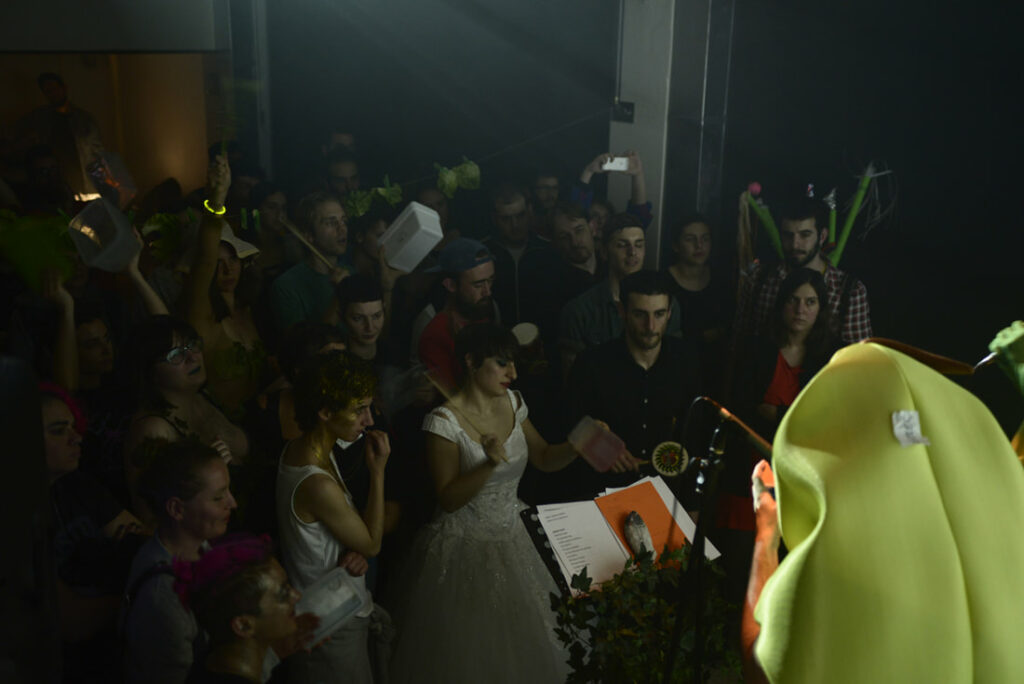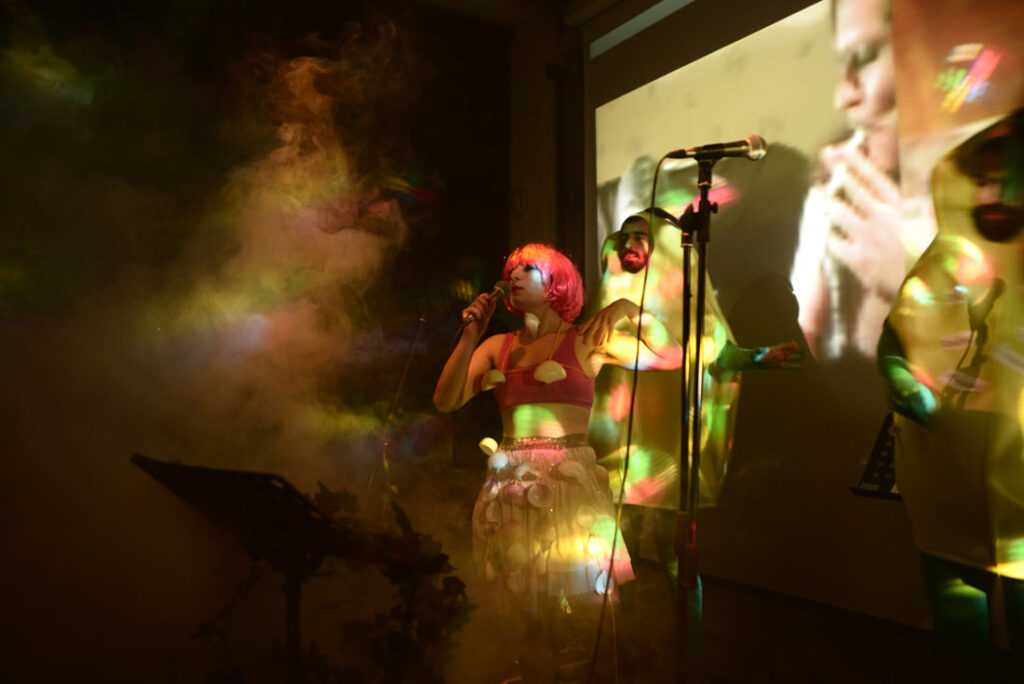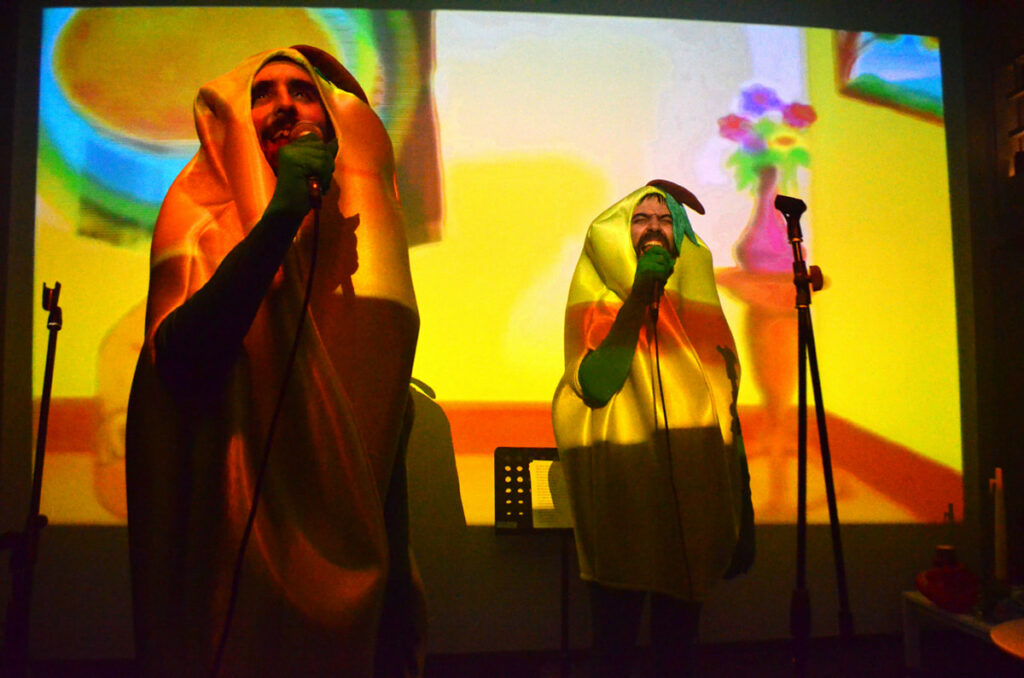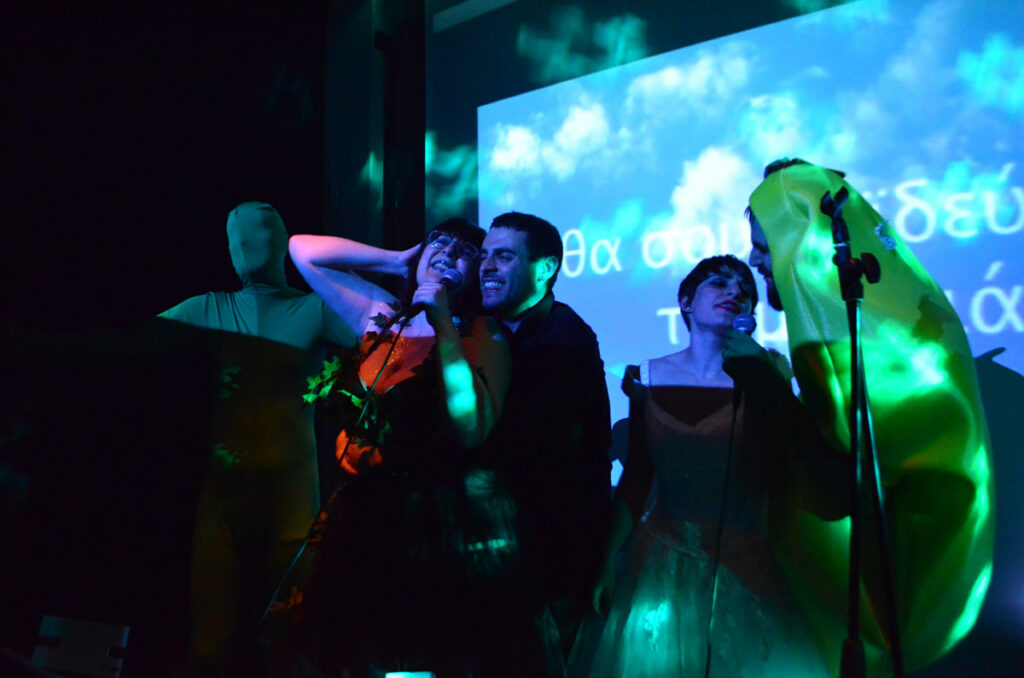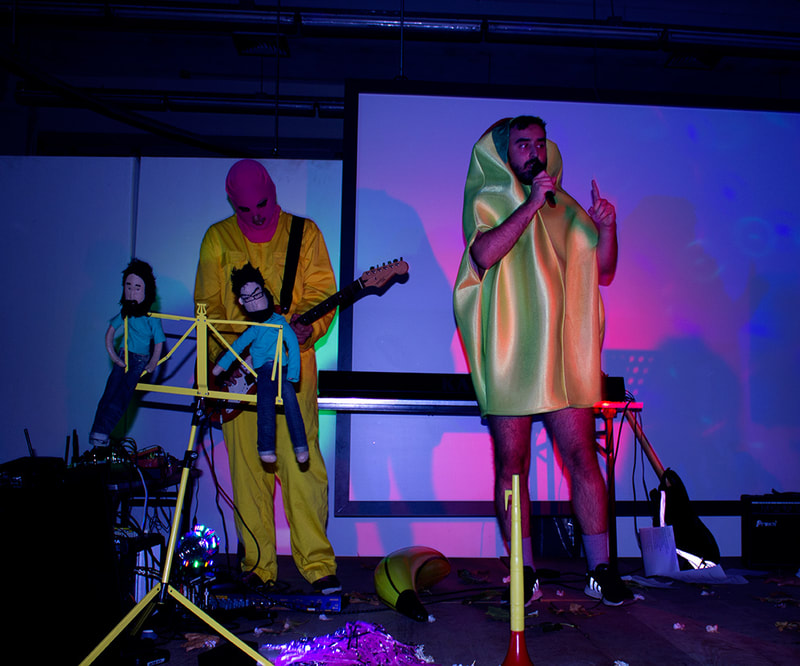Artworks
Foreskin Wariors
@Old Operating Theatre Museum, London [Sep 2022]
The performance took place in the context of the book launch of Jordan Osserman’s “Circumcision on the Couch”. FYTA staged an intervention during Osserman’s lecture. Two hooded men wearing anonymous masks interrupted the event while a video projection of their leader delivered their message against the ‘culture of circumsicion’. The performance drew inspiration from ‘intactivists’, a group of men’s rights activists that fight against the practice of circumcision, but who, over the years, have developed their discourse to encompass alt-right conspiracy theories, antisemitism, and MAGA rhetorics.
Taking intactivists as a starting point, FYTA introduced a bastardised version of their politics that superficially resembled conventional alt-right discourse but was interjected with eco-friendliness, so-called ‘social justice warrior’ leftisms and gender politics, challenging their audience to reflect on the current state of radical anti-authoritarian discourse. Their assemblage of contradictory political messaging problematised notions of nativism and the ‘natural’ state, while at the same time blurred the boundaries of ‘us’ vs ’them’ of established liberal orthodoxies.
With the participation of Robert Price.
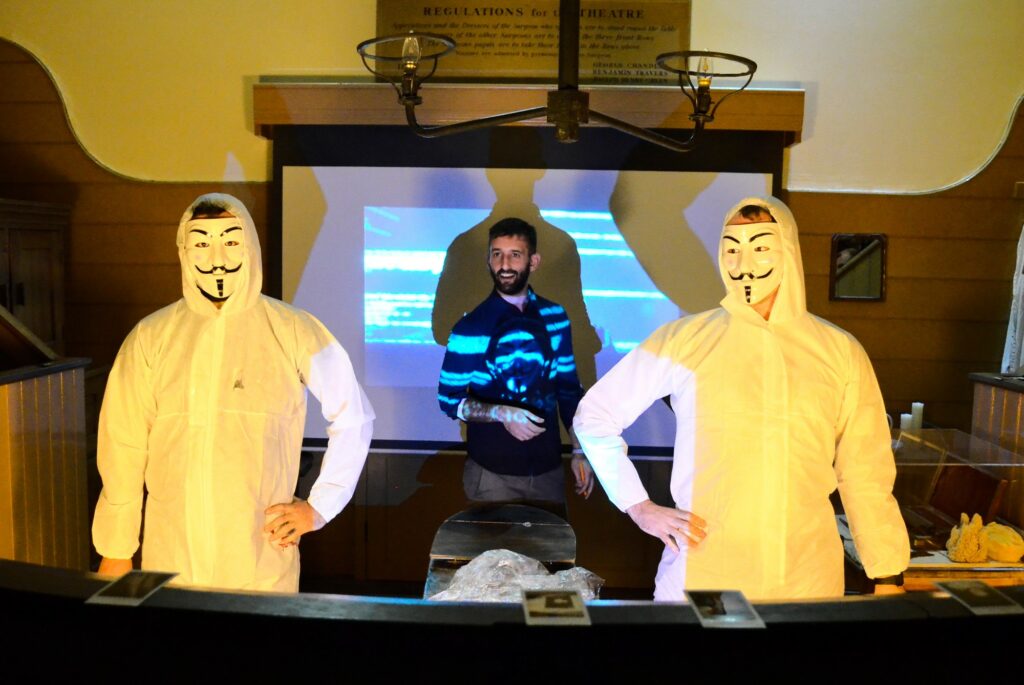
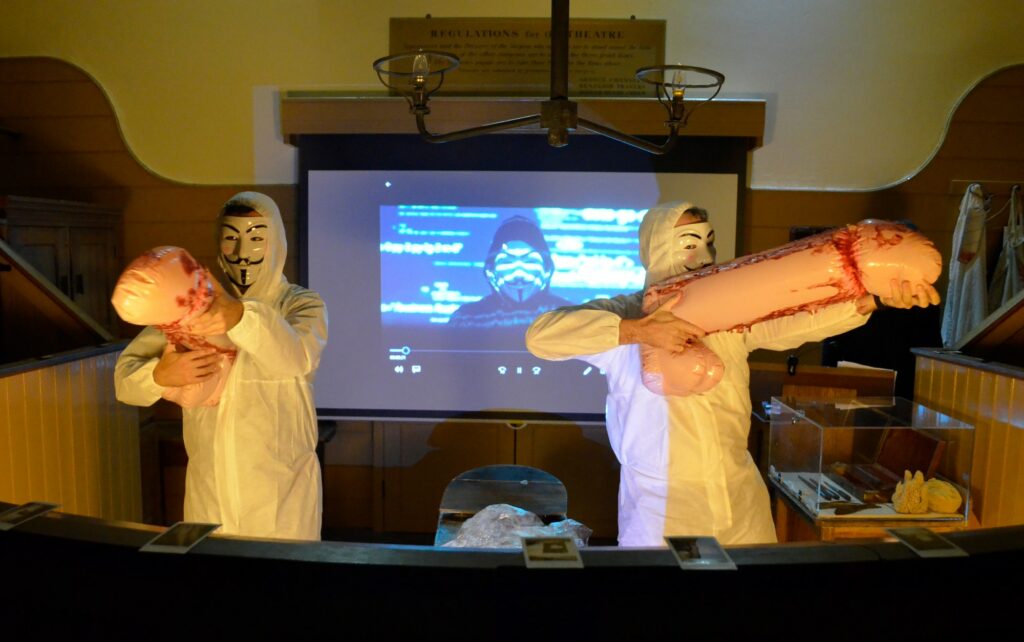
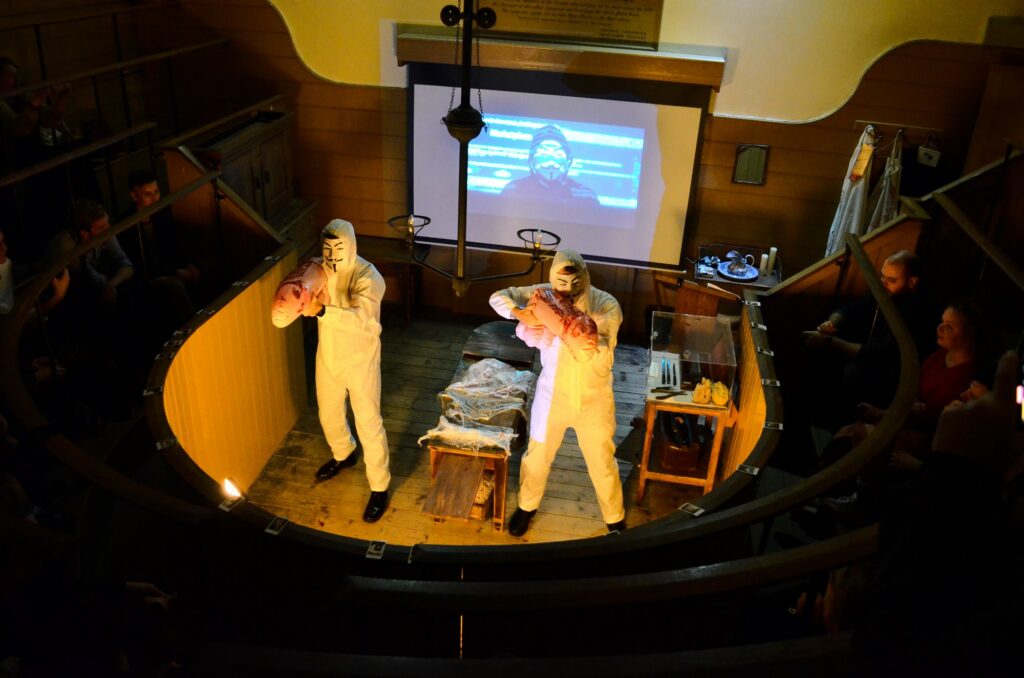
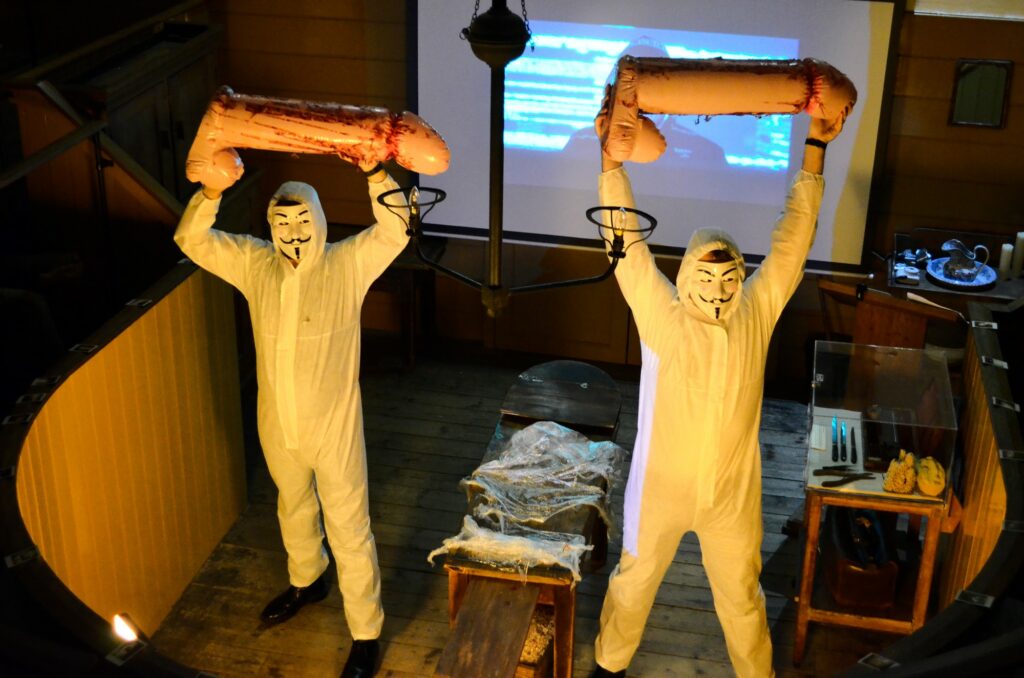
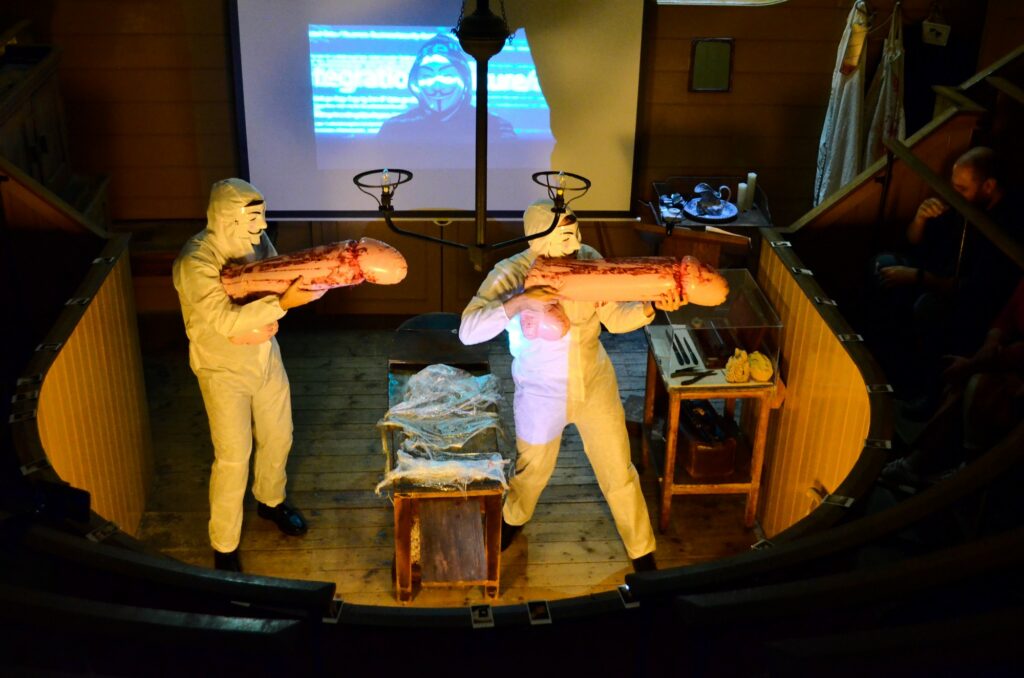
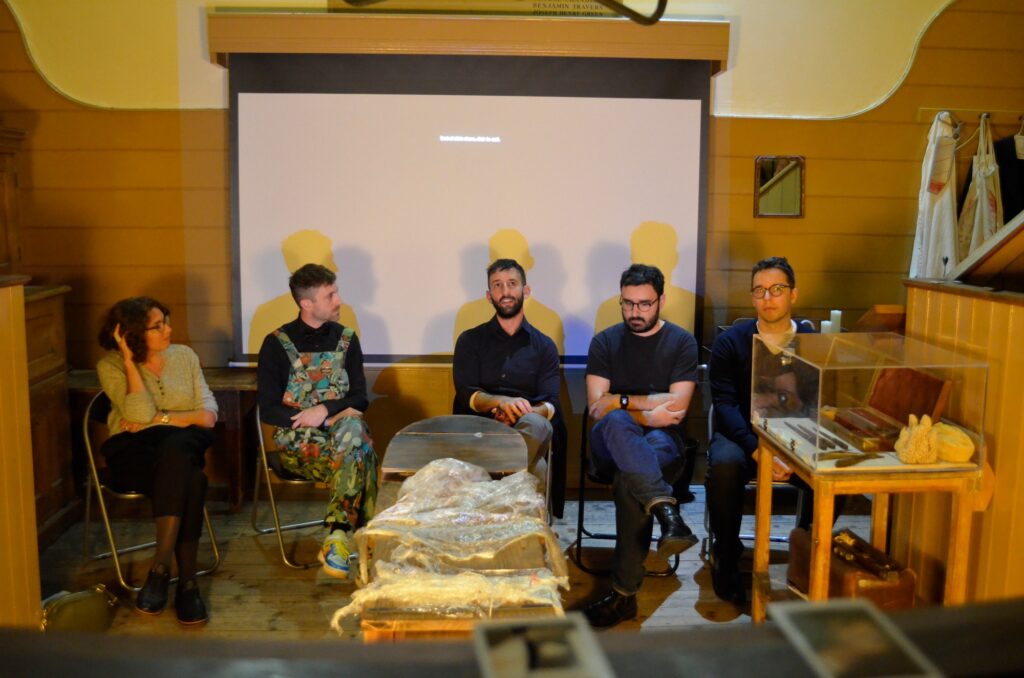
Art: Echo and Narcissus
@Sub Rosa Athens [Sep 2022]
Ιn celebration of their tenth anniversary, FYTA presented an exhibition / happening at Sub Rosa Space in Athens. In the event, FYTA reflected on the radical ambivalence generated by the iconoclastic and often narcissistic insistence of featuring themselves centrally in their artistic practice. In the intro text of the event, FYTA attempted a mapping of those who love them and those who hate them, but most importantly those who love to hate them including “far-right priests, conspiratorial fine artists, scandal-mongering yellow papers, antiquity-obsessed gatekeepers of ‘good aesthetics’, hurt frenemies, house-trained boytoys of the Onassis foundation, incel bots, pharisaic tenderqueers, (crypto?)homophobic modernist museum curators, and more” and invited the audience to reflect on what triggers these heterogeneous crowds so much.
On the walls, the visitors could engage with hundreds of different FYTA portraits generated through Artificial Intelligence algorithms re-working John Biebel’s FYTA portaits from 2013. The image of the duo seemed to be out of time and beyond meaning, welding together fragments of the global collective unconscious. As the duo stated at the beginning of the event, “FYTA persevere as the waves of history strip humans of their perishable flesh. FYTA are eternal; the HATE and LOVE of the world fuels their hearts.” The even also featured a series of performative homages to past FYTA songs, composed and performed by friends and collaborators.
On the walls: John Biebel, FYTA portraits, 2013, oil on canvas & DALL-E, 150 Studies on FYTA portraits by John Biebel, digital prints
On site: Kangela Tromokratisch, Metatheodosia, Prokni, Spyros Patsouras (Sphoenix), MaYo, YOTA5, Veronique Tromokratish, DJ Tsoli
Photos by Alex Kat, Mihalis Gkatzogias
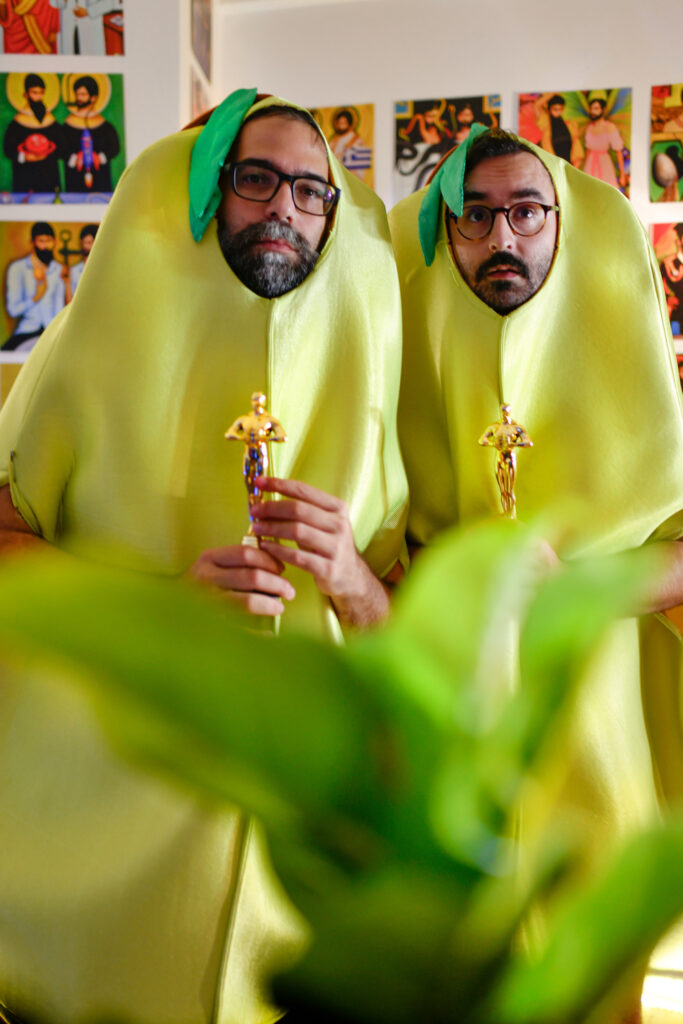
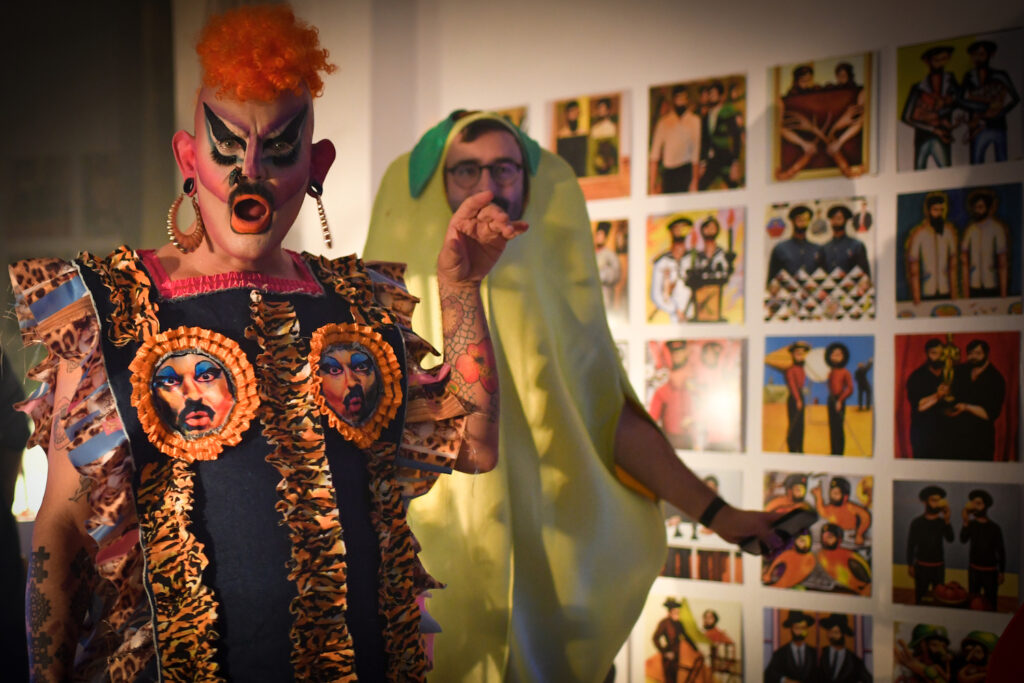
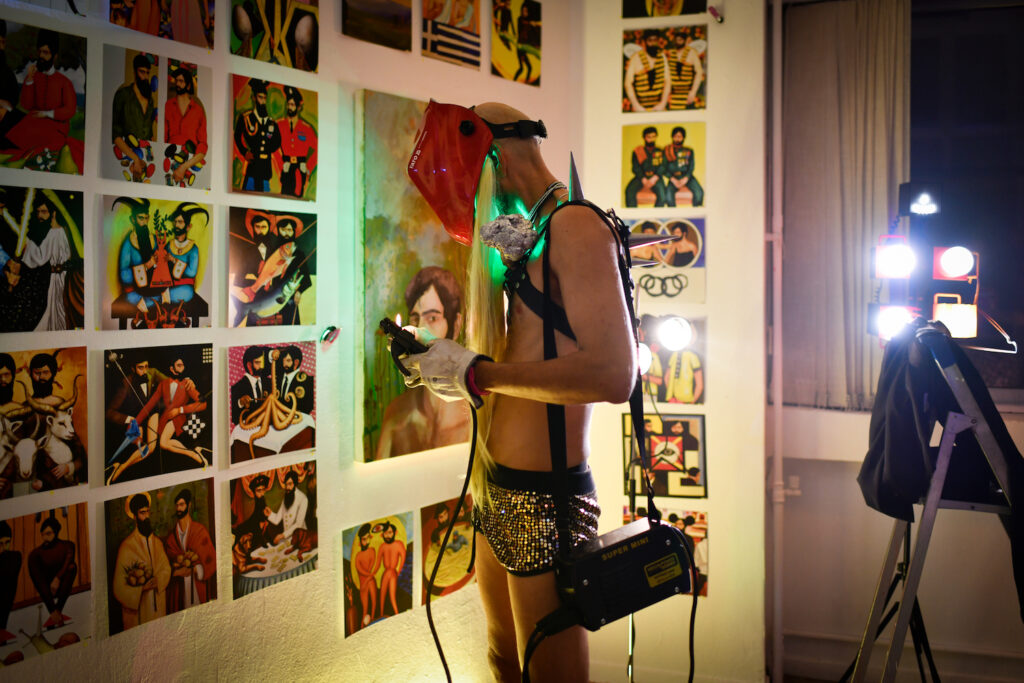
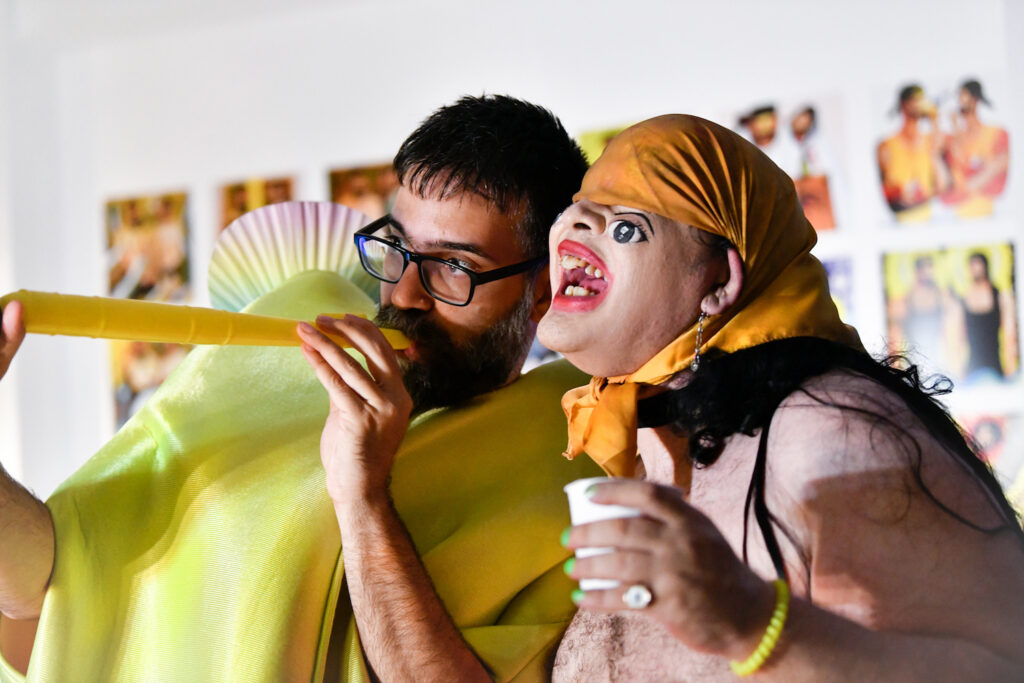
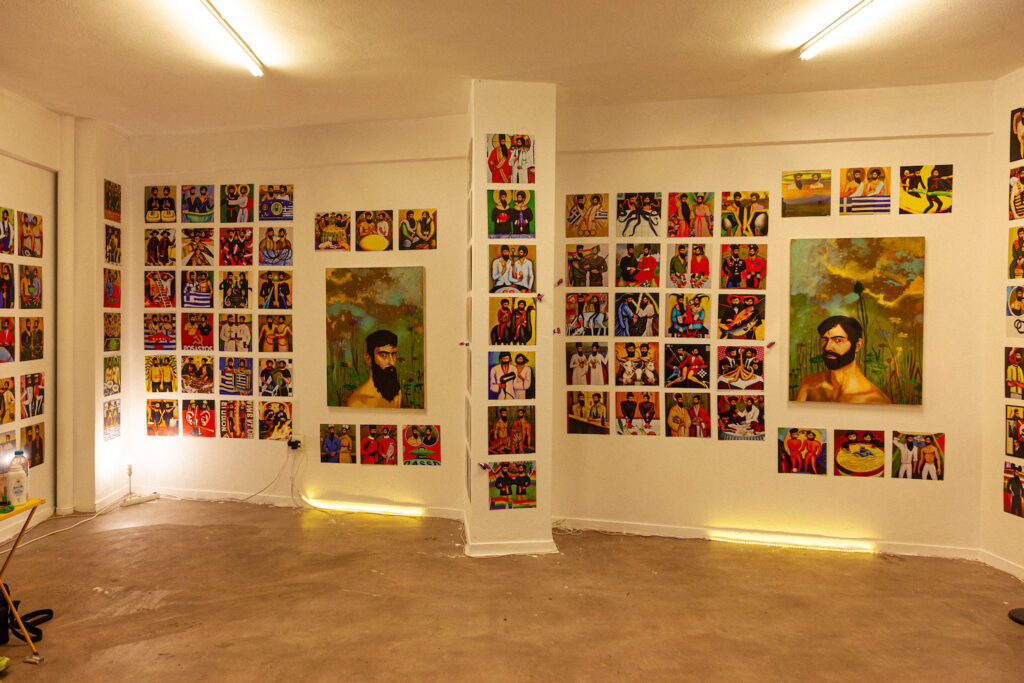
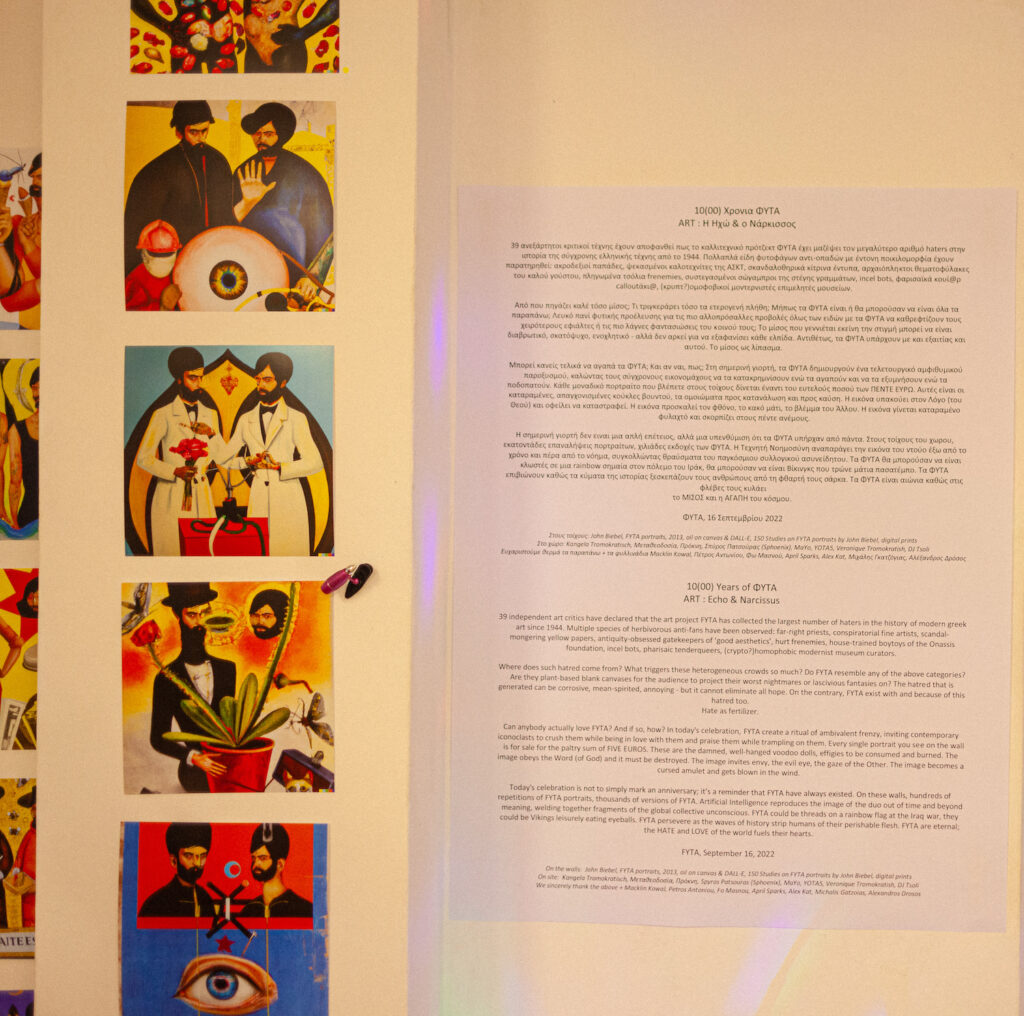
The Life & Times of Aphrodite, Queen of Beauty
@Movement Radio [2022]
In the audio play ‘The Life & Times of Aphrodite, Queen of Beauty’ FYTA employed the text-generating capabilities of contemporary AI to reflect on questions of beauty, art and materiality through a series of mythological genealogies, (anti-)humanist reflections and archetypal storytelling. The play follows goddess Aphrodite through the millennia and all the way to contemporary Athens, providing a philosophical account of the history of aesthetics. In this particular story, Aphrodite, the goddess of love and beauty, experiences multiple existential crises as historical definitions of love and beauty shift and collapse over time. In her attempt to stay relevant, Aphrodite has to re-configure her subjectivity and belief systems, a process of evolutionary adaptation that mirrors the function of AI’s generative networks.
The algorithm used to produce the text relies on a deep-learning model called a ‘recurrent neural network’ (RNN). This model is trained on a large corpus of text and can generate new text that is similar to the training data. In this work, we used Generative Pre-trained Transformer 3 aka GTP-3, which is trained on a vast number of online conversations and millions of digitised books. The model can learn the long-term dependencies in the text and can generate coherent and realistic outputs. As a starting point, it requires user-inputted prompts, in this case 10-15 word sentences. The prompts set the overall intention of the script, and the algorithm generated the different chapters based on them. For the audio composition AI generated noises were combined with stock compositions and folly FX, field recordings, 8-bit music, happy hardcore, a song by Dana International, and YouTube extracts.
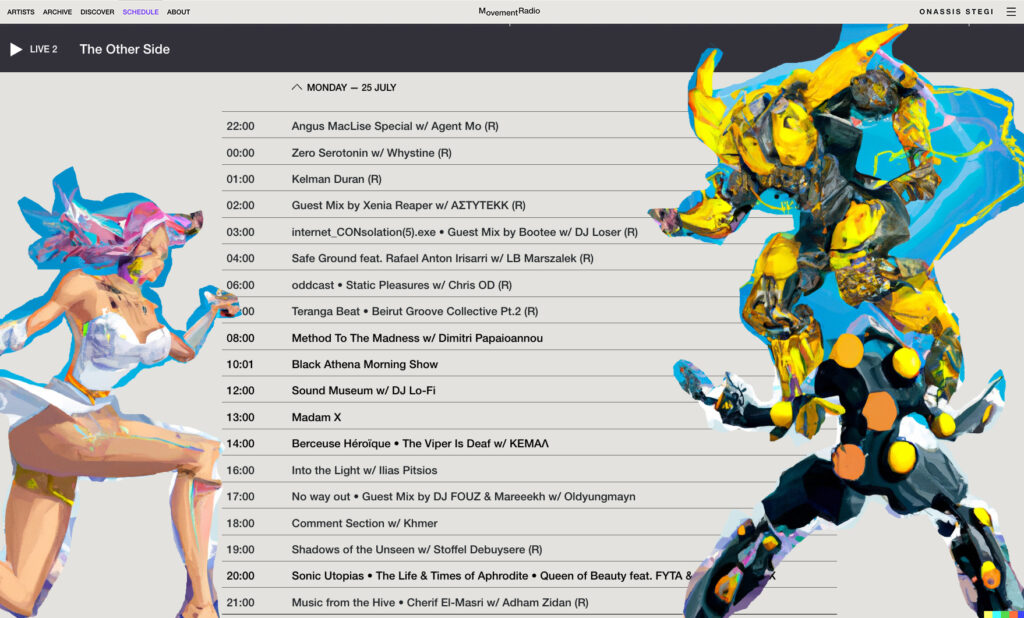
ORFEAS2021
@Thessaloniki Film Festival [Nov 2021]
ORFEAS2021 is the video version of the cancelled (due to Covid-19) stage opera ORFEAS2020. It is a sci-fi re-imagining of Claudio Monteverdi’s L’Orfeo as a parable for contemporary queer life. The film premiered at Thessaloniki International Film Festival and has since been shown at Wicked Queer (at the ICA Boston), Fringe! London Queer film festival (at the Whitechapel Gallery), The Greek Film Festival in Berlin (at Babylon Cinema), ART200 in Bucharest and other film festivals and art spaces in europe and north america. ORFEAS2021 journeys through utopian politics, ideological conflicts and supernatural leaders as it follows the first gay Prime Minister of Greece struggling to carry the legacy of LGTBQ+ rights in a post-truth dystopia. The work is dedicated to the memory of Zak Kostopoulos (Zackie Oh), an LGBT performer and activist who was murdered in a homophobic attack on the streets of central Athens in 2018.
ORFEAS2021 uses typical elements of opera – stylisation, emotional outbursts and gender-bending voice acrobatics – while it translates them into a contemporary spectacle creating a kaleidoscope of VR aesthetics, post-internet visuals, 80s-inspired hauntology and queer DIY collage. ORFEAS2021 invites us to reflect on the very idea of today’s “progressive” politics: What does progress mean in 2022? How can we create a progressive discourse that would appeal to and mobilize the majority? Is progress compatible with or contrary to populism, especially in the age of digital information? How can we talk about identity politics at a time when the notion of “freedom of speech” is hijacked to camouflage neo-reactionary culture wars? Could we design our own populist blockbusters that activate the critical capacity of an audience and not just satisfy a primal craving for the spectacle?
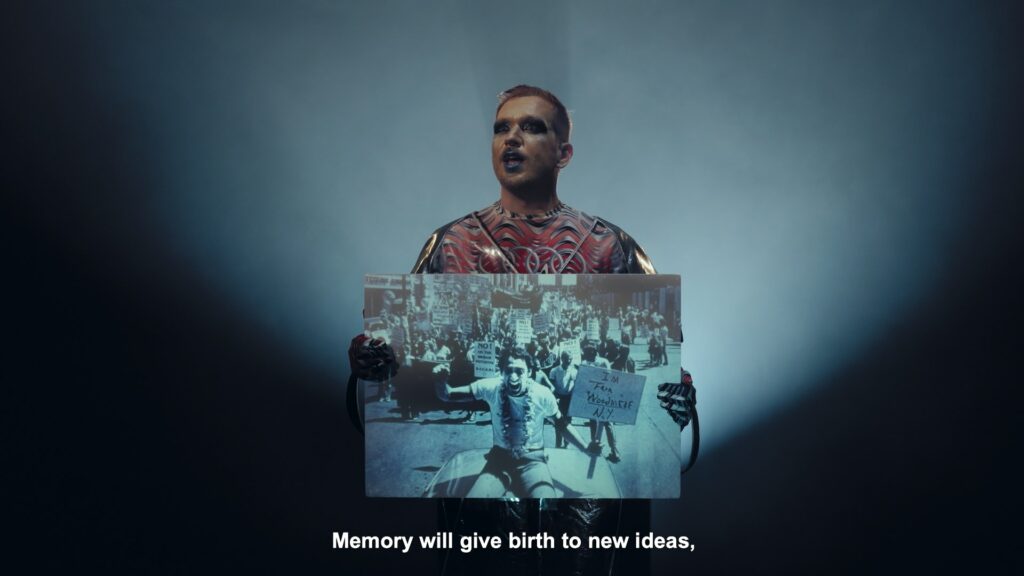
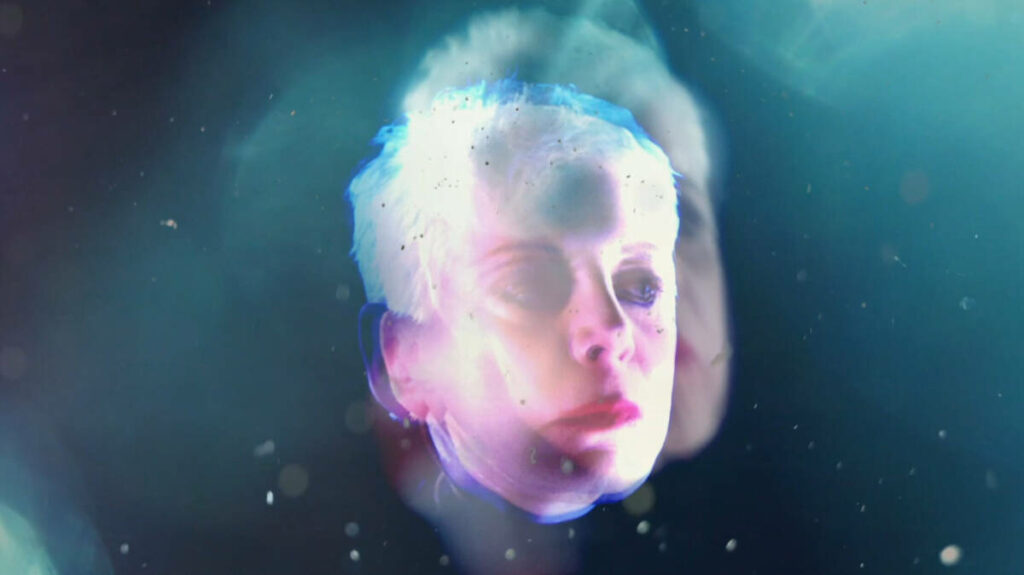
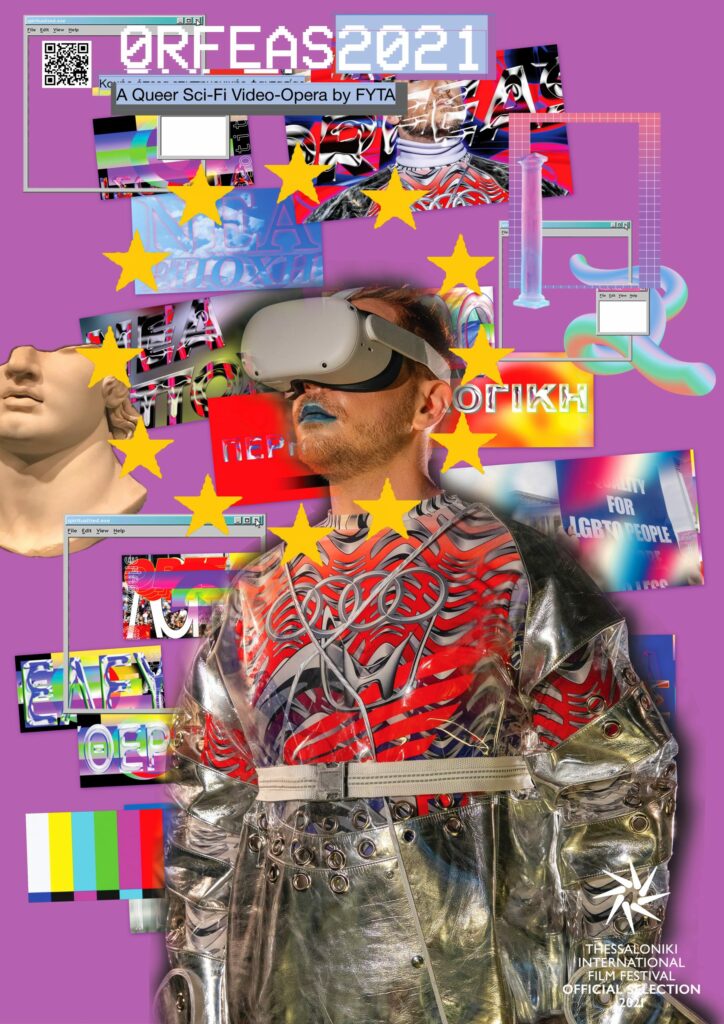
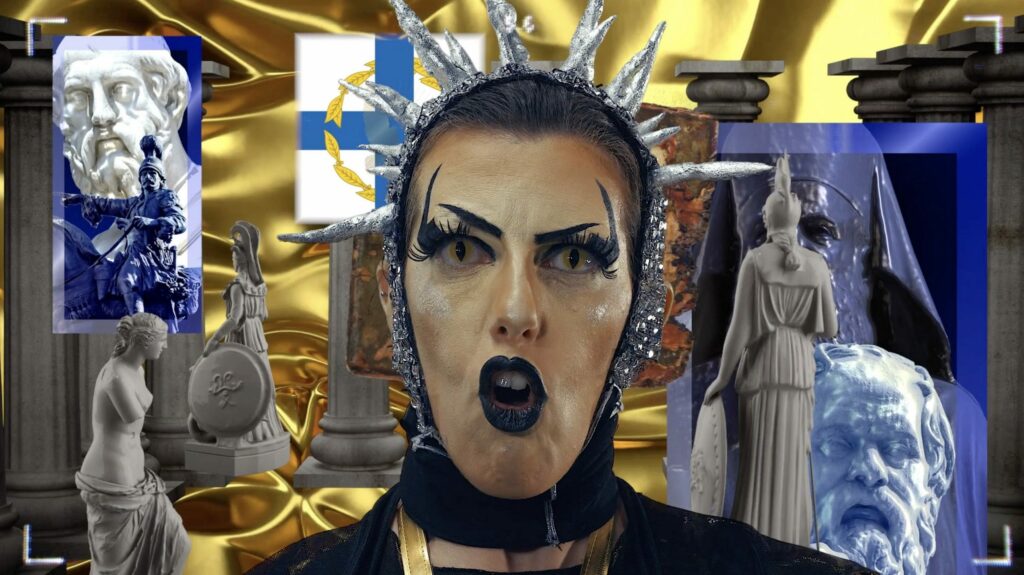


The Banana Lemon Impasse
@Zoumboulakis Gallery [Apr 2021]
The Banana / Lemon Impasse presents the biggest conceptual, poetic and philosophical disagreement between FYTA in their first ten years of their existence. How can one match a banana and a lemon, with the words ”banana” and “lemon” in the most interesting, funny, creative, intricate way? In two 60-second videos, each member of FYTA summarizes their argument in a fruitful testimony that touches on semiotics, hermeneutics, psychoanalysis and structural linguistics.
The interactive installation featuring the videos alongside electronically enhanced bananas and lemons was part of the exhibition ‘On Gardening’ at the Zoumboulakis Galleries.
We would like to thank Fo Masnou for the Nails and Veronique Tromokratisch for the Hands.
Watch on YouTube.
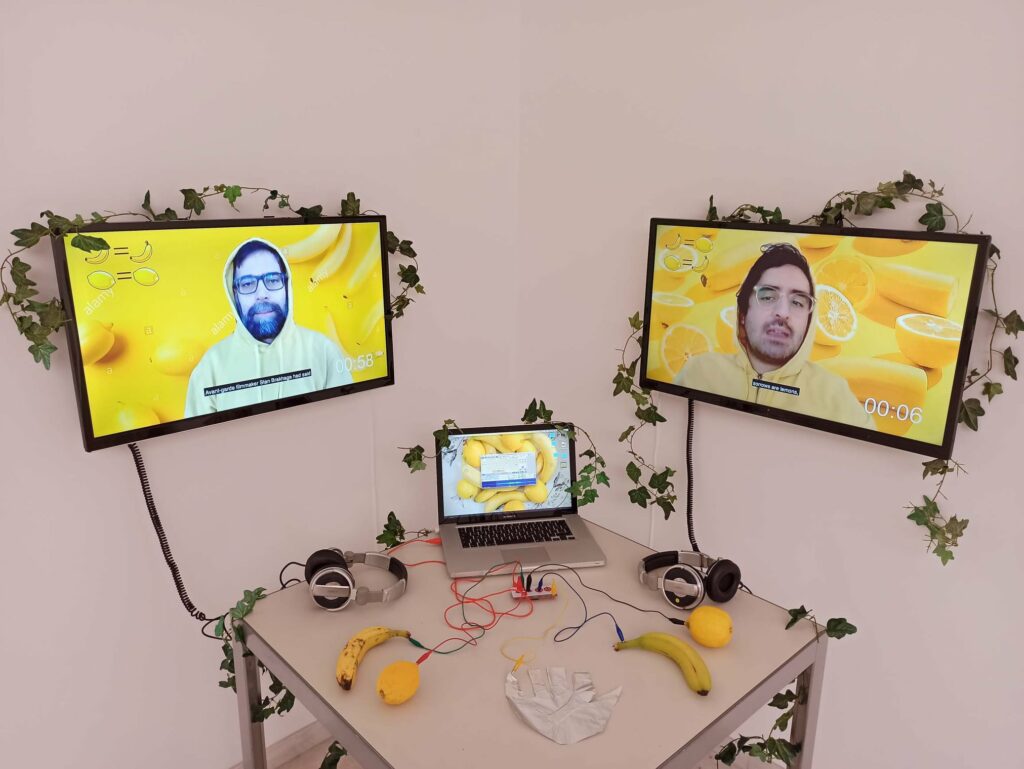
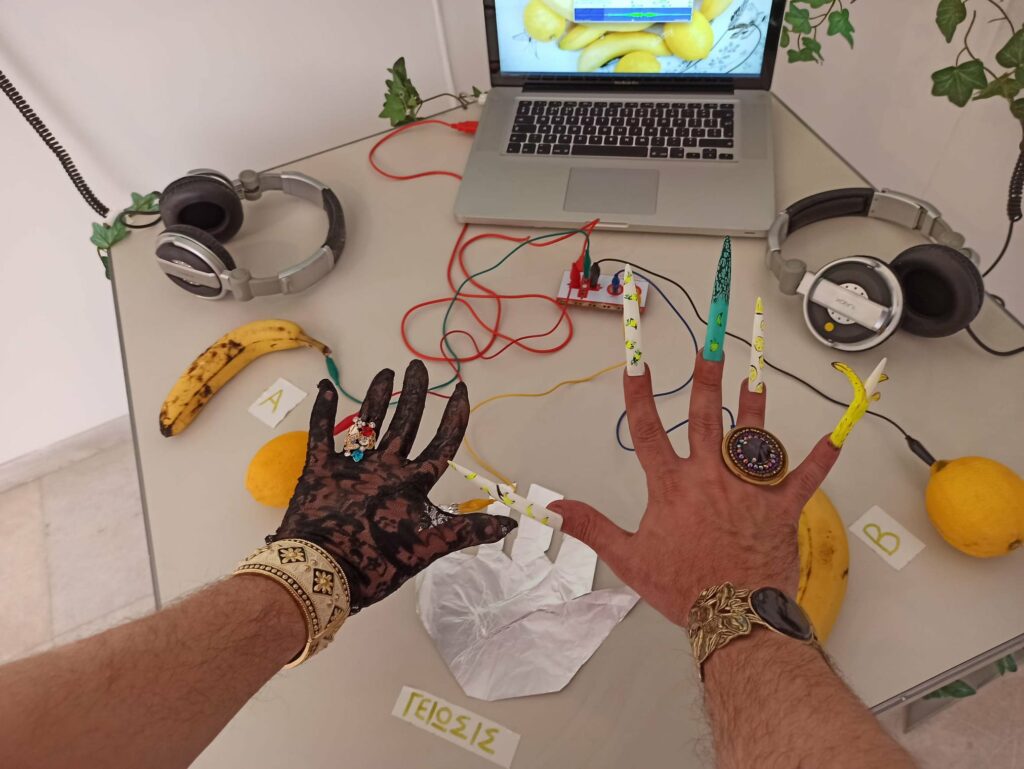
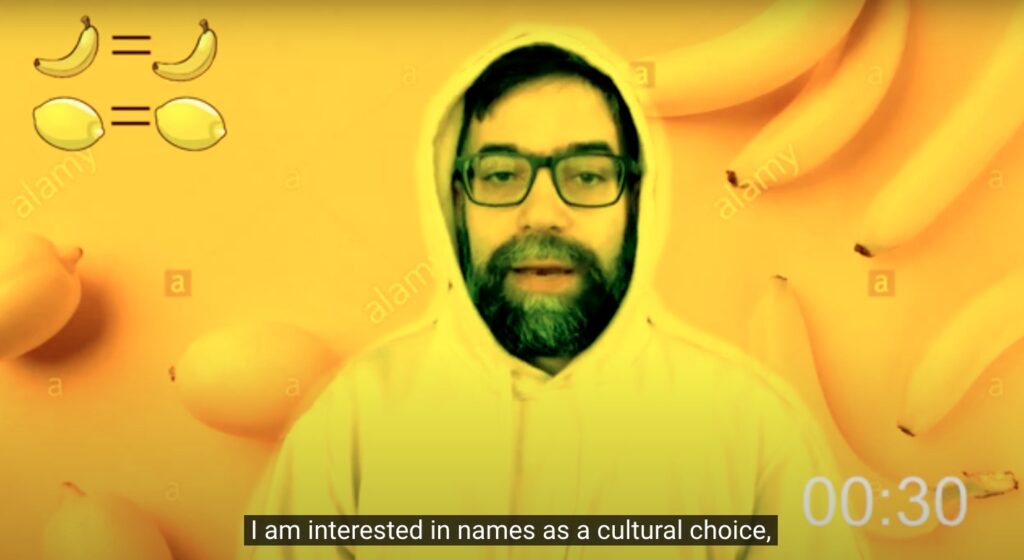
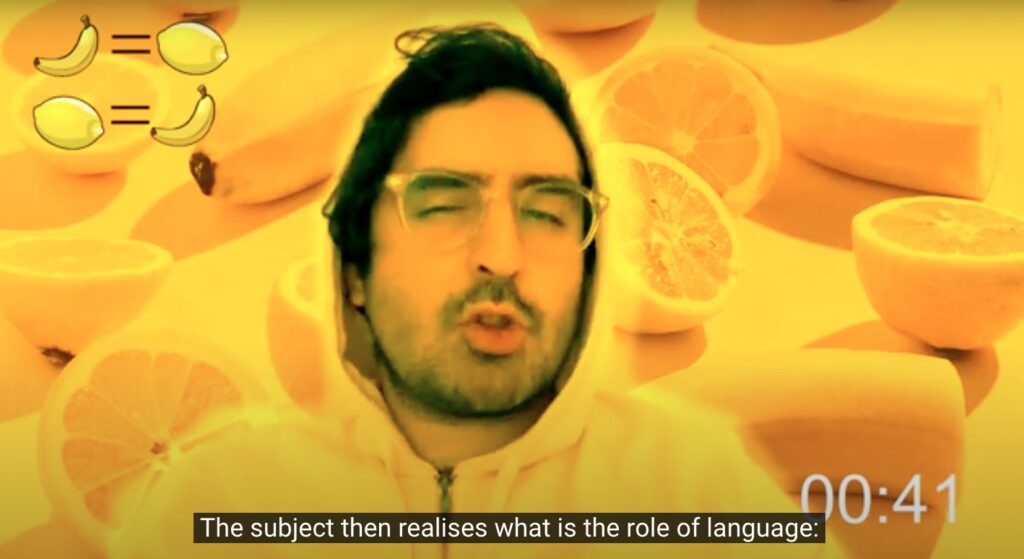
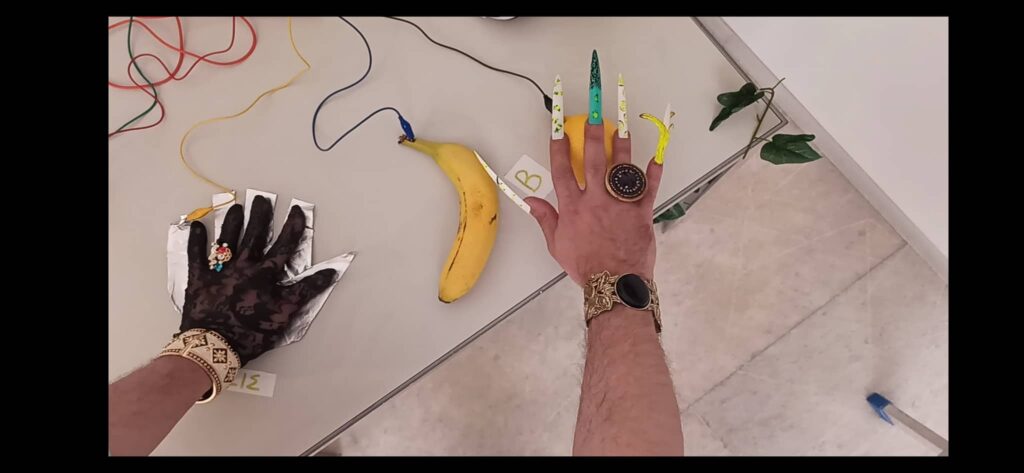
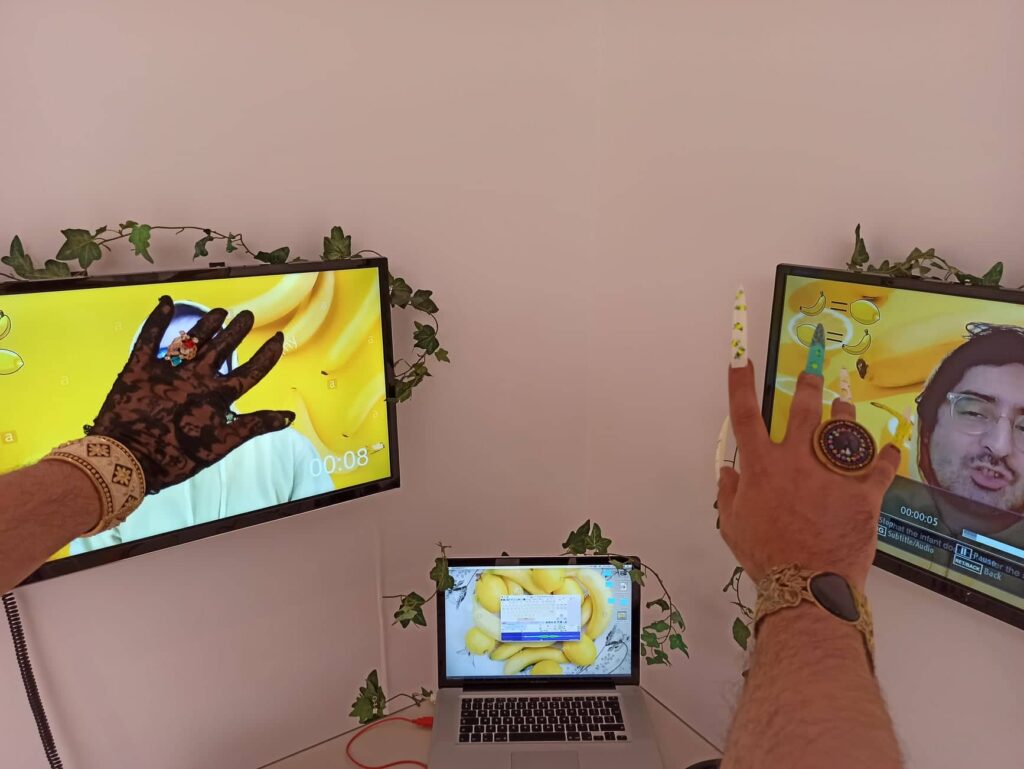
ORFEAS2020
@Greek National Opera [Sep 2020]
The alternative stage of the GNO commissioned FYTA to produce an adaptation of Monteverdi’s L’Orfeo. The reworking followed structural narrative elements of the original text, but set the action in the near future, raising issues such as radical politics and the notion of ‘revolution’ in late capitalism, East / West relations, the myths of Hellenism, as well as the ways in which neoconservative politics can appropriate the human rights discourse of LGBT communities. The cast consisted of opera singers and queer performers sharing the stage, while baroque musicians, video artists and fashion makers coexisted behind the scenes. A meeting place of varied practitioners, a work of delicate balance of politics and aesthetics.
And while one of the intentions of the work was to confront the myths of greek national history, exposing their internal contradictions, inherent exclusionary violence and pure absurdity, it seems like the gods of greekness had the last laugh. The play attracted controversy since its very announcement with conservatives hating its unapologetic gayness and radicals doubting our ‘good politics’ credentials – especially since we were willing to collaborate with big institutions. In the end, greece entered a lockdown one day before our premiere, leaving us with a fully-prepared work that would not be presented to an audience. The greek gods would withhold the edging key to our creative ejaculation once more.
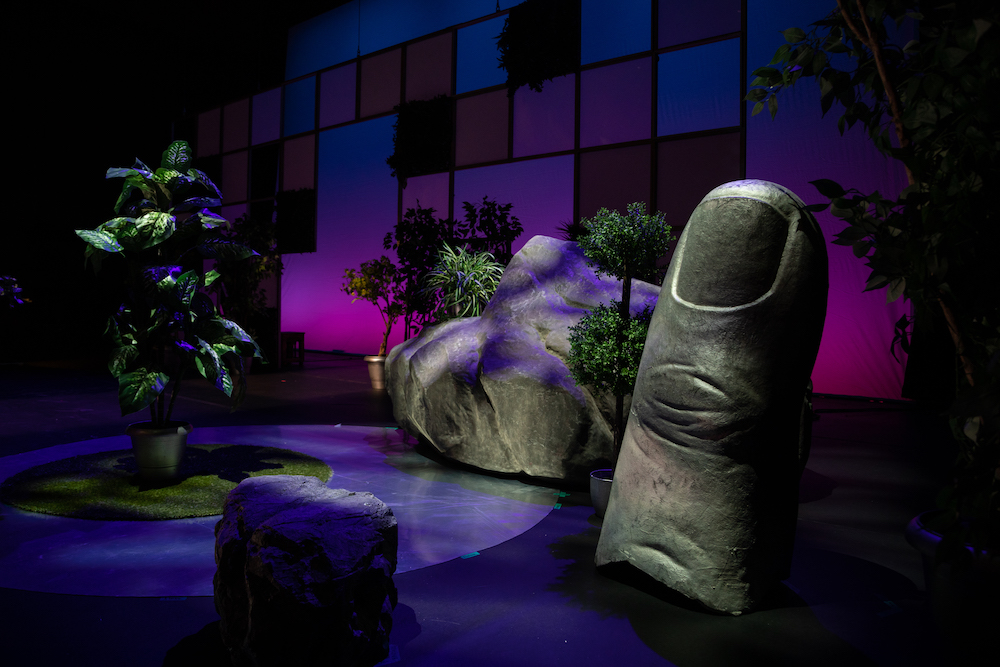
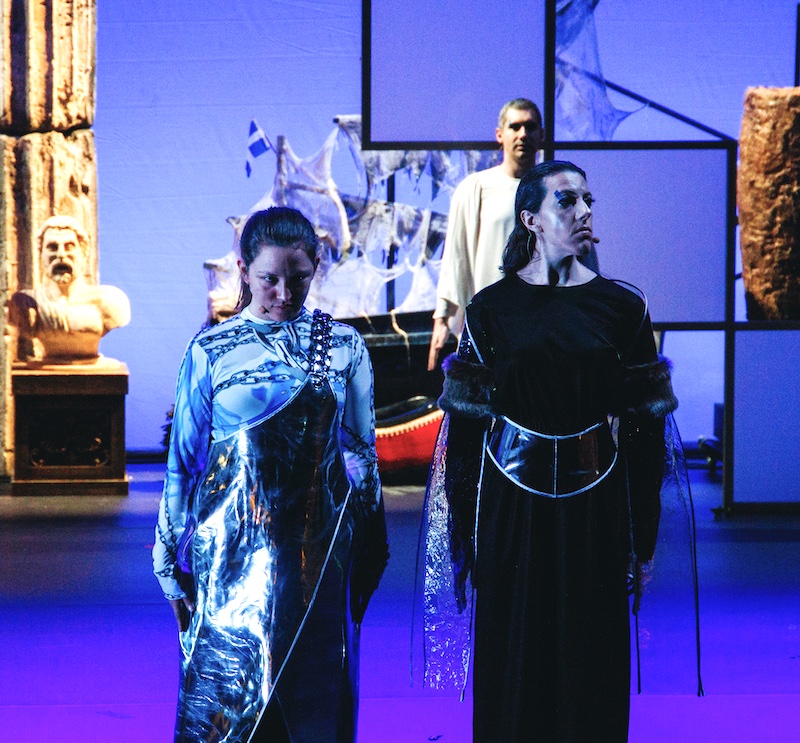
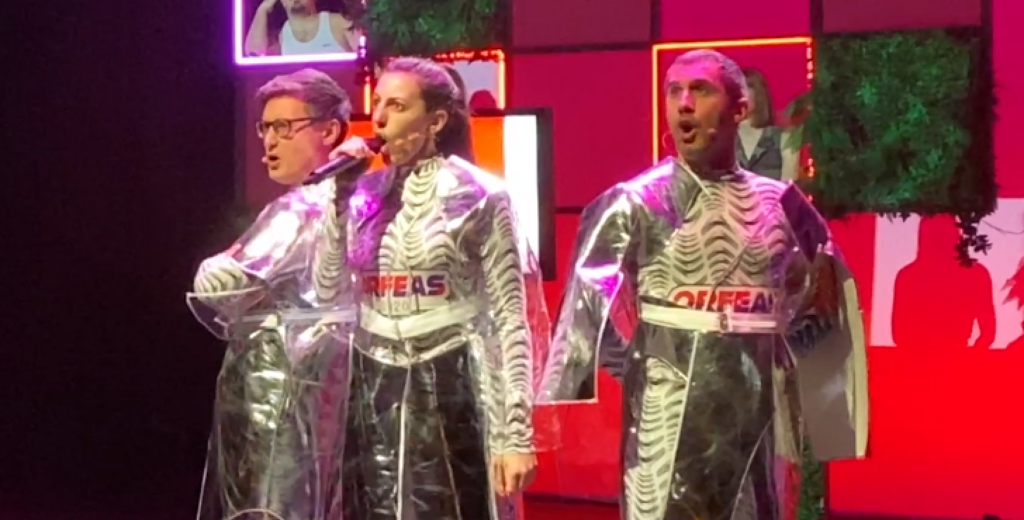
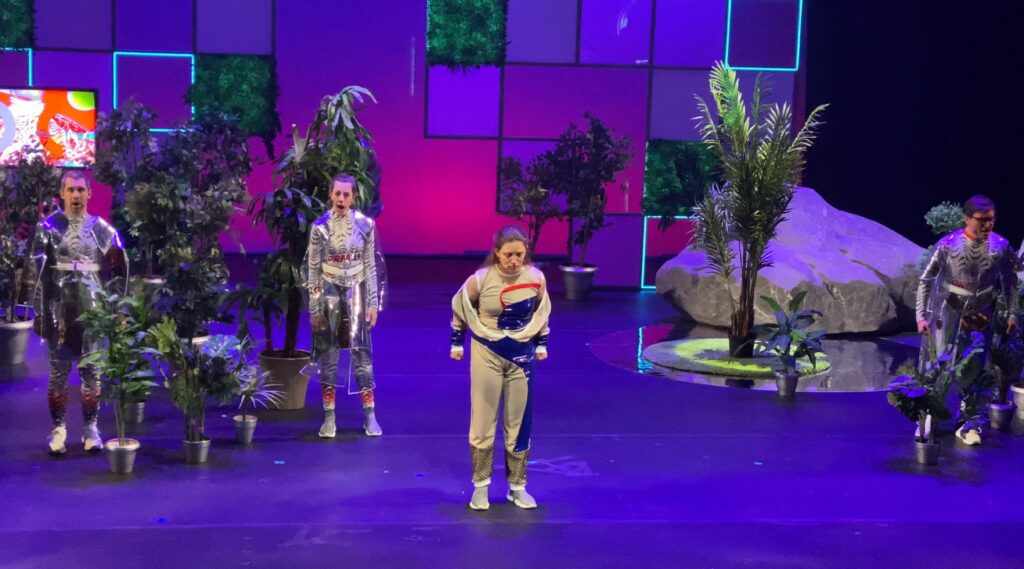
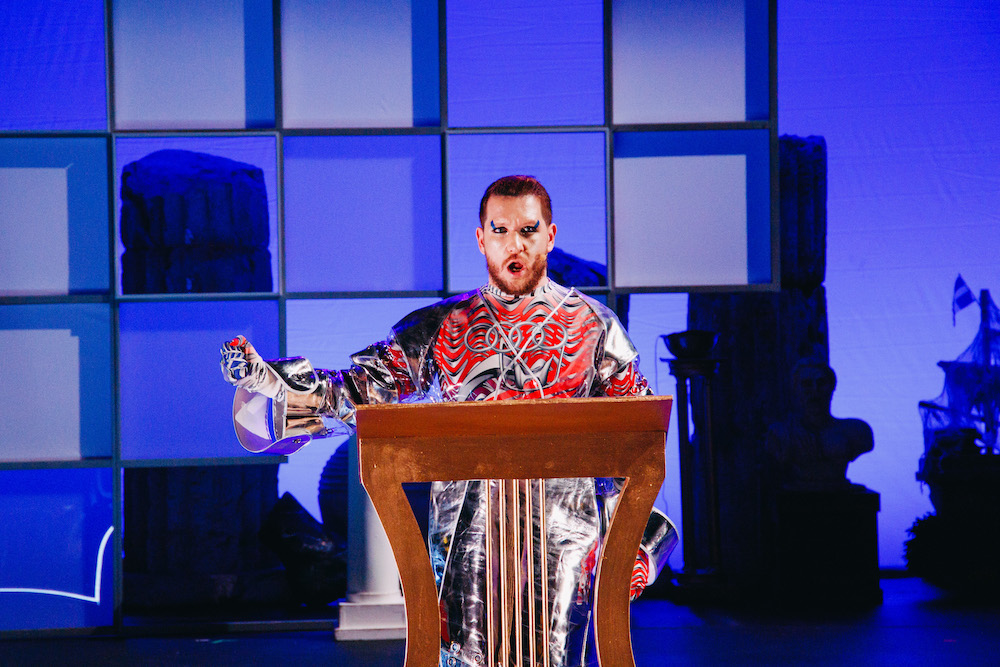

200 Thousand Years of Greece
@Euronoize, Scala, London [May 2019]
In 2019 FYTA were commissioned by Pil & Galia Kollectiv to create a video for their upcoming event called ‘Euronoize’ which was a spoof Eurovision event with an intention to critique the nationalist absurdity of a musical competition between European nation-states. As part of the live event that took place at the Scala (London) with DIY bands from different countries, Pil & Galia commissioned a series of short films by artists from the participating countries, responding to the event’s themes and questions. The film FYTA produced was called ‘200 Thousand Years of Greece’ and it was inspired by the short ‘national idents’ shown as part of the real Eurovision between songs – but with an anti-greek twist.
The video got a second life when it was used as a parody promo video for the celebrations of the 200 years from the greek revolution in 2021. As the official celebrations reeked of rancid patriotism, this was a prime opportunity for a creative détournement. Two days after the video was released on YouTube, the ‘Greece 2021’ committee requested its removal on a copyright infringement claim. FYTA fought against this decision (parody, after all, is considered ‘fair use’) and now the video is back online.
Voice over by Macklin Kowal

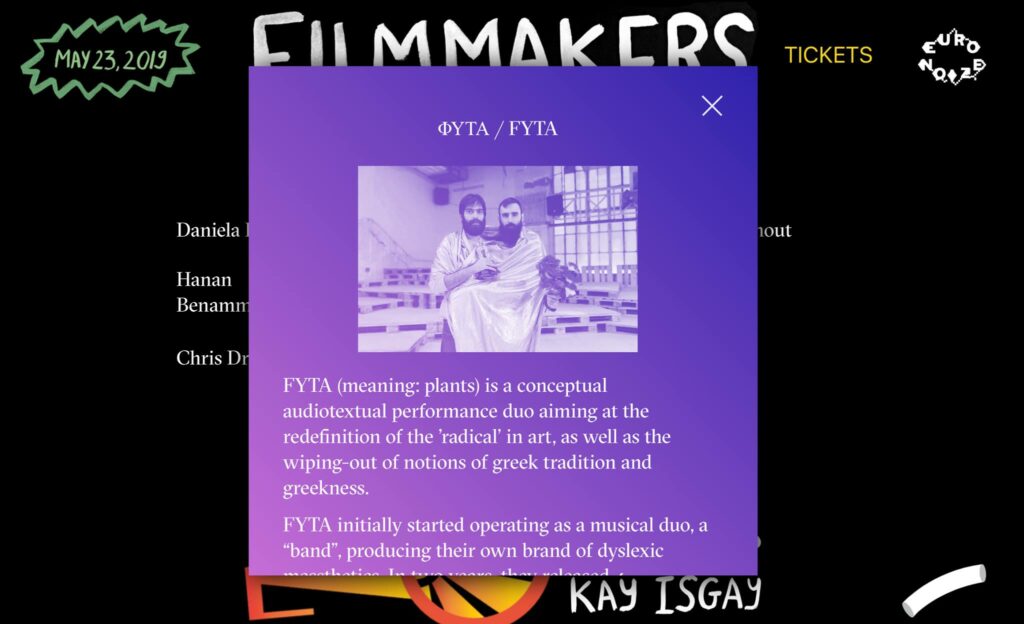
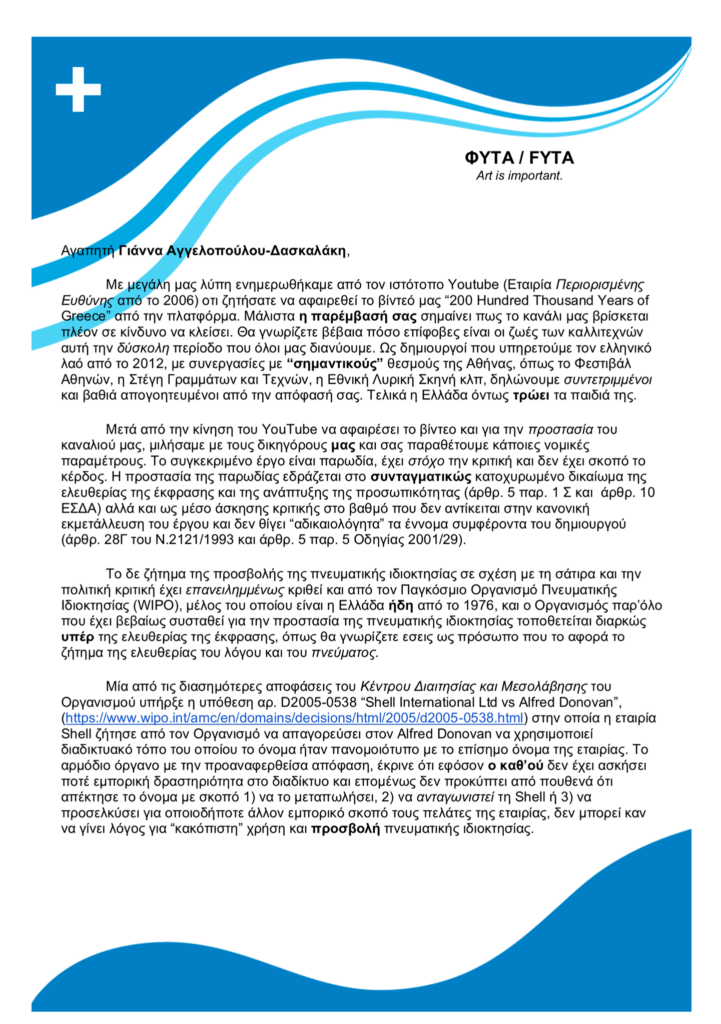
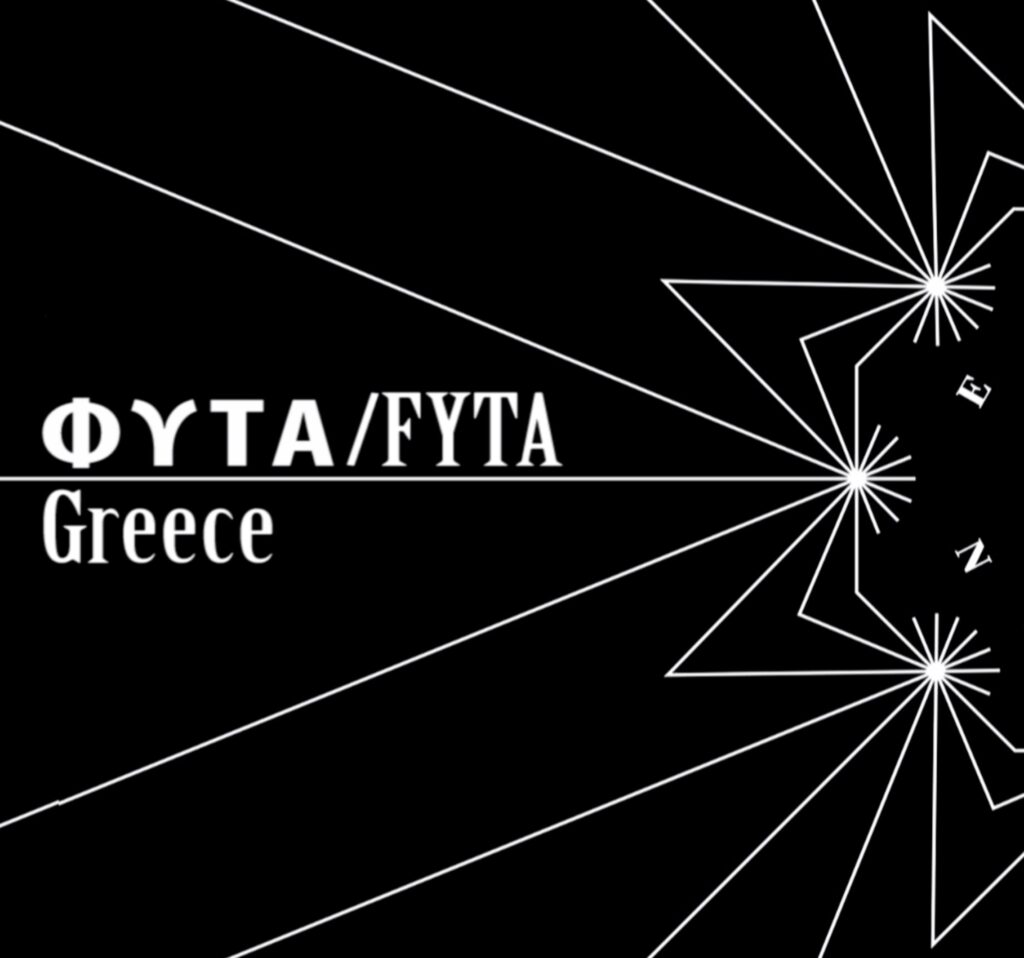
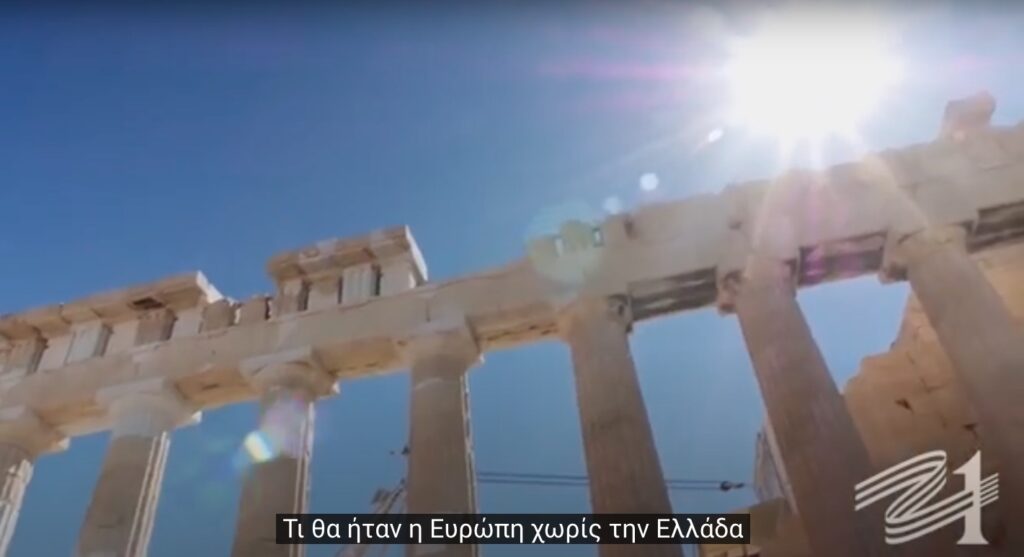
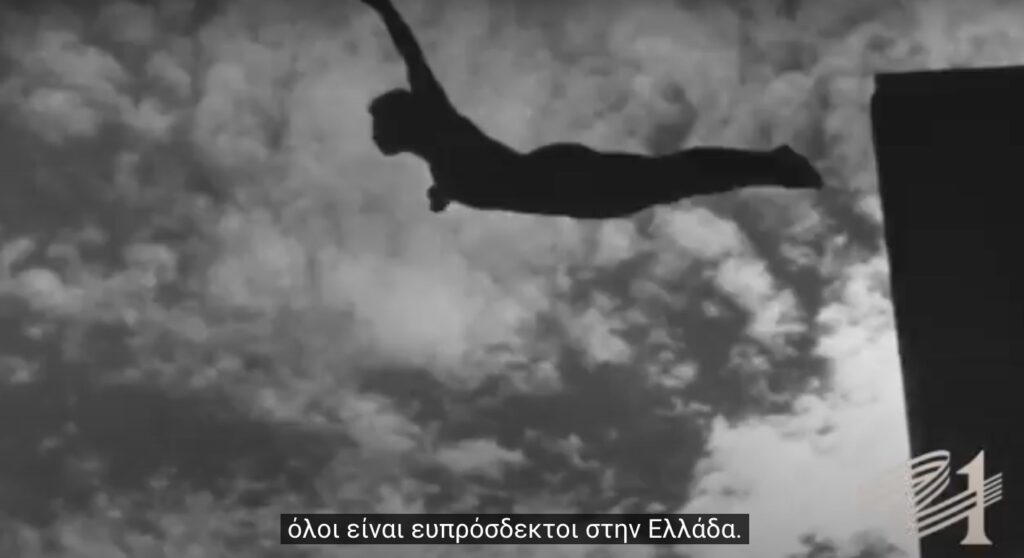
Plants on Holiday
@Berlin Porn Film Festival [Oct 2018]
Nature is often staged as a pre-linguistic, anti-human force. But as with all representations, the idea of ‘nature’ is constantly failing to engulf all human fantasies and nightmares that are aiming to it, ending up eternally reframing them within the domain of ideology. In this video, FYTA become plants dressing up as people staging a theatre play about plants. The mirroring of embodiment, fantasy and representation creates a series of surreal interactions where sexuality meets relaxation, impossible relationships find theatrical resolutions and an excursion to a deserted resort turns into post-human documentary on nature.
The film premiered at the Berlin Porn Film Festival in the programme “The real Athens queer DIY” curated by Alex Tsoli.
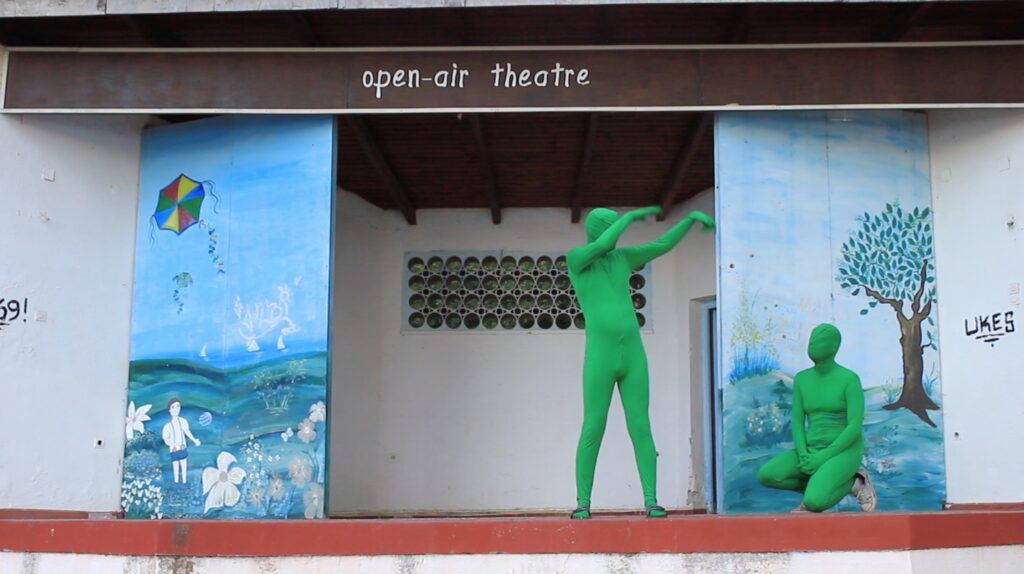
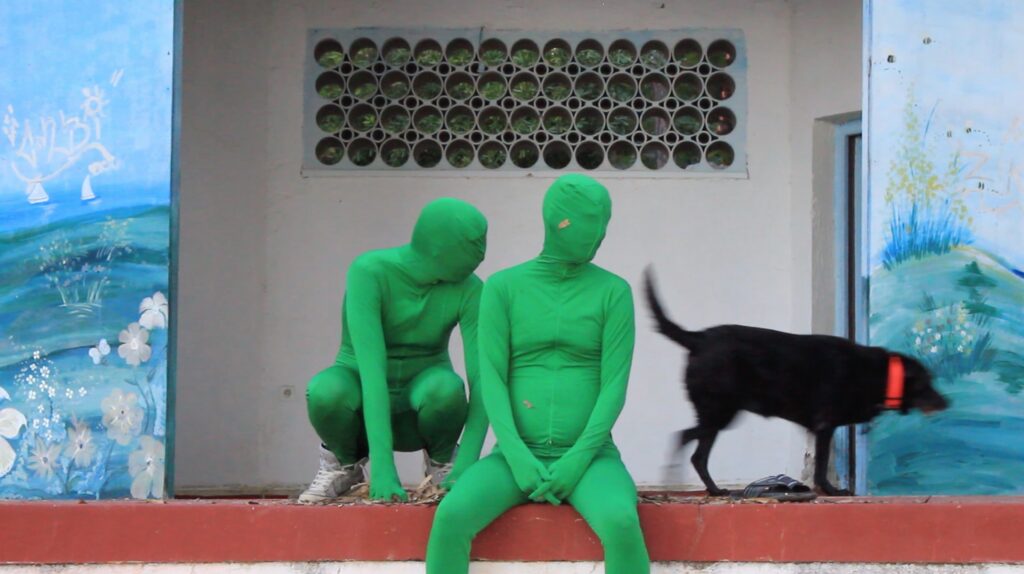
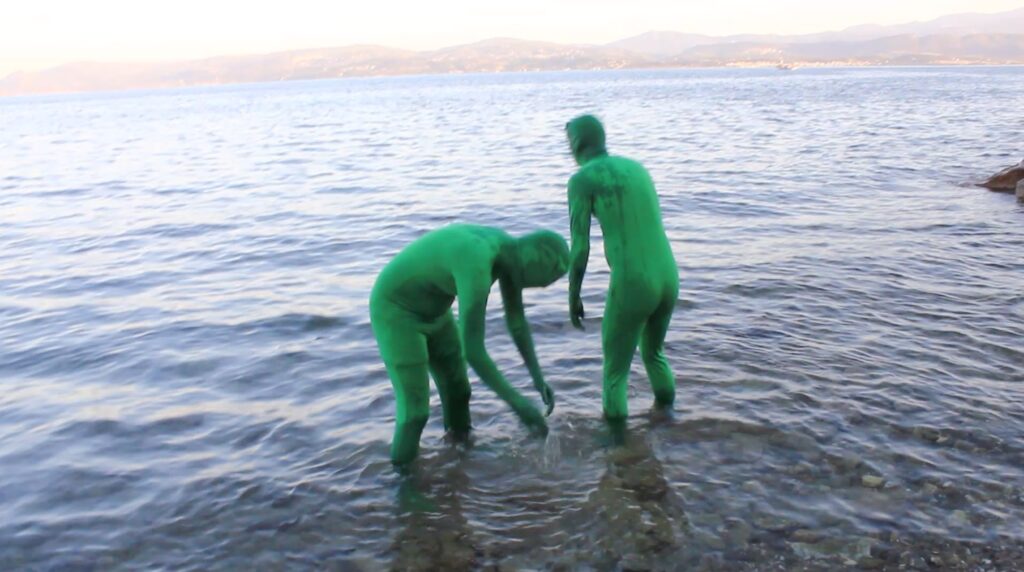

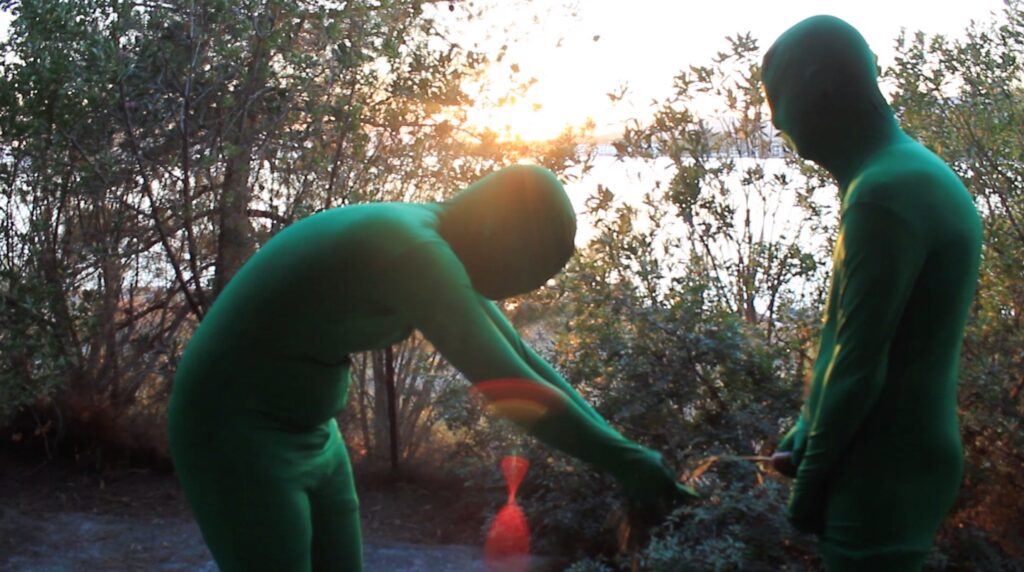
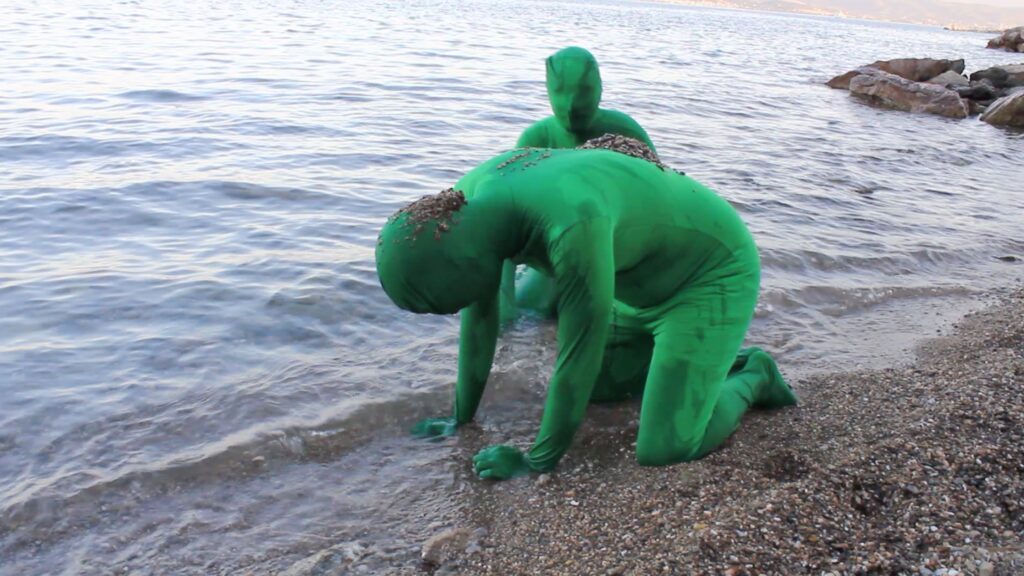
The Death of Queer
@Athens & Epidaurus Festival [May 2017]
A Performance about the limits of queer politics and the risk of assimilation of identity policies from mainstream culture and institutions, as well as the mainstreamisation of queer scenes. Five years after having been involved with queer arts, politics and the relationship between the two, the family around FYTA and FYTINI pays a farewell to Queer, in a performance that in hind sight feels like an opening act for the discussions around pink-washing that were to follow amongst members of the local queer scene later.
Part of the third instalment of Sound Acts at the Athens & Epidaurus Festival.
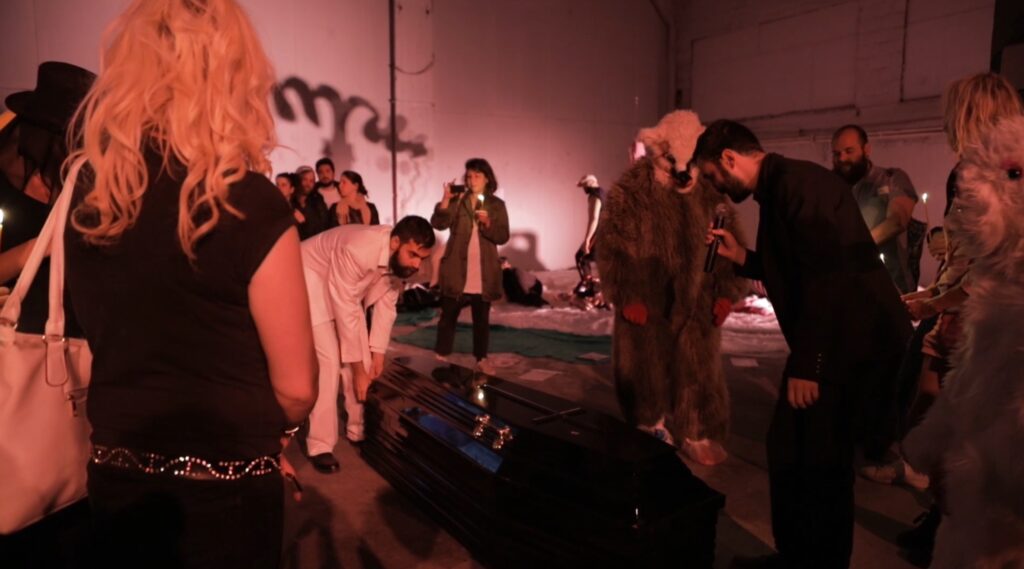
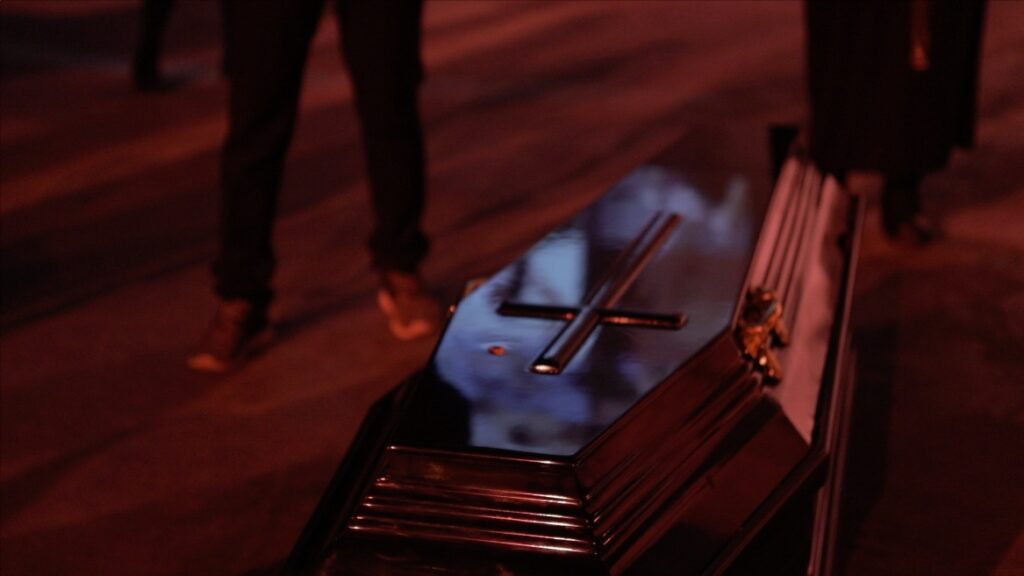
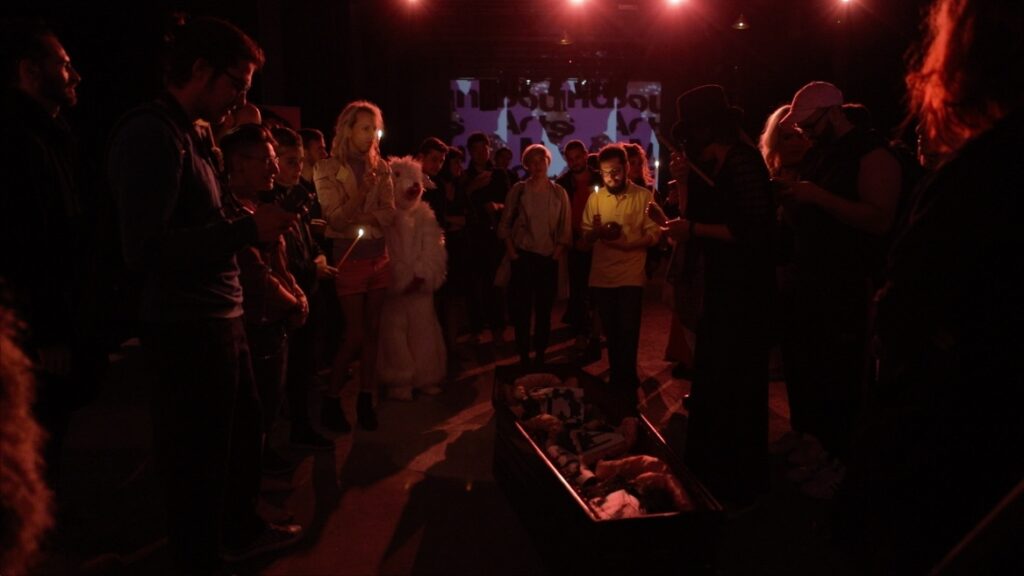
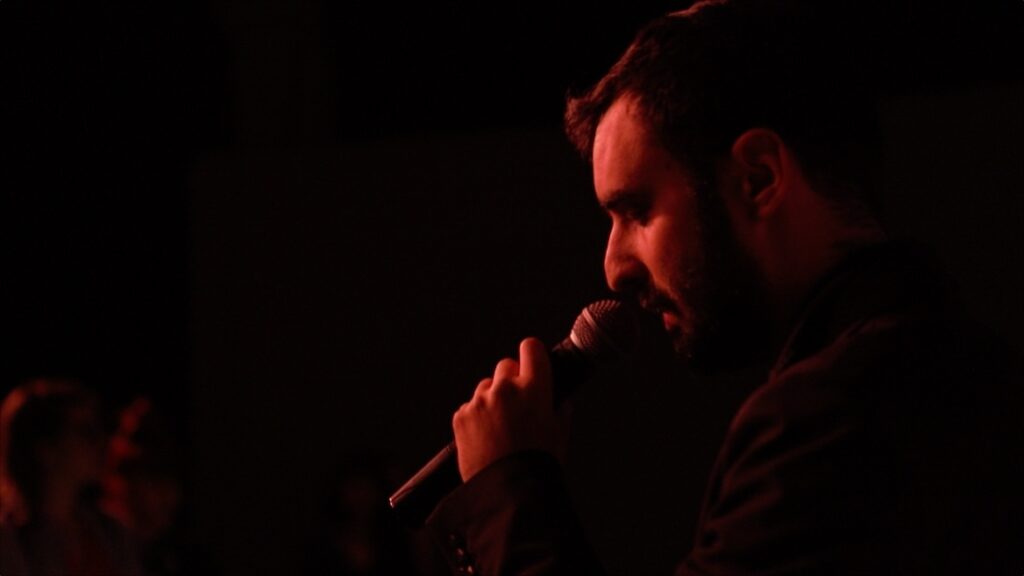
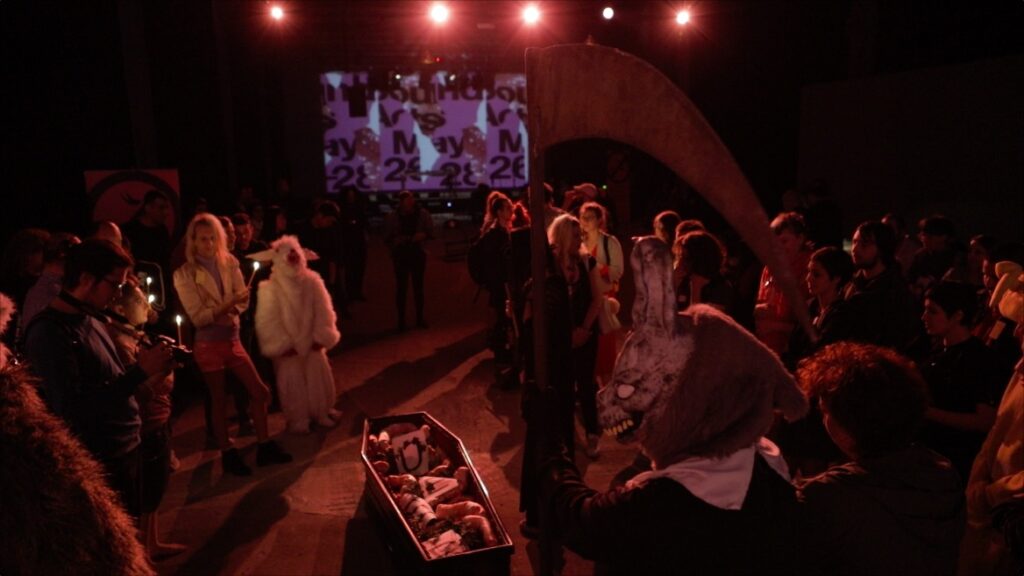

Documena
@Athens Bienalle & other locations [Jan 2017 — Apr 2017]
Initiated and directed by Athanasios Anagnostopoulos and Fil Ieropoulos and later joined by a larger group of artists, Documena (incorporating Documena TV-on-Demand) was a project that sought to respond to how contemporary art production engages with the intense European crisis, coinciding with documenta 14 and intending to examine the latter’s decision to voluntarily relocate itself from Kassel to Athens (“Learning from Athens”) along with the ideological presumptions that seem to guide such a choice.
The Documena interventions and TV-style chat-show were a continuous disruption to the mundane local art scene during the art fair’s stay in Athens and the most rigorous and severe critique to the neo-orientalist and naively patriotic discourses of documenta14’s theoretical premise.
The Documena team co-designed and participated to the opening of the 6th Athens Biennale “Waiting for the Barbarians” and its online trailers, as well as completely took over the Biennale’s exhibition space (Bageion Theatre) for the closing event “Resurrection with Documena” on the 15th of April 2017.
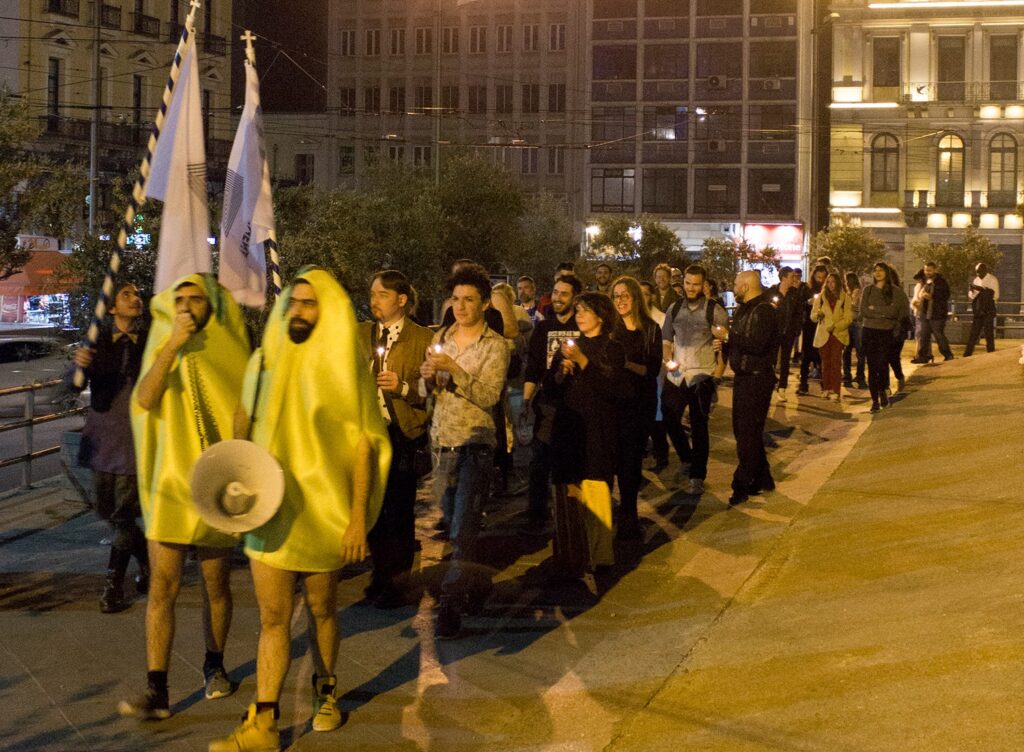
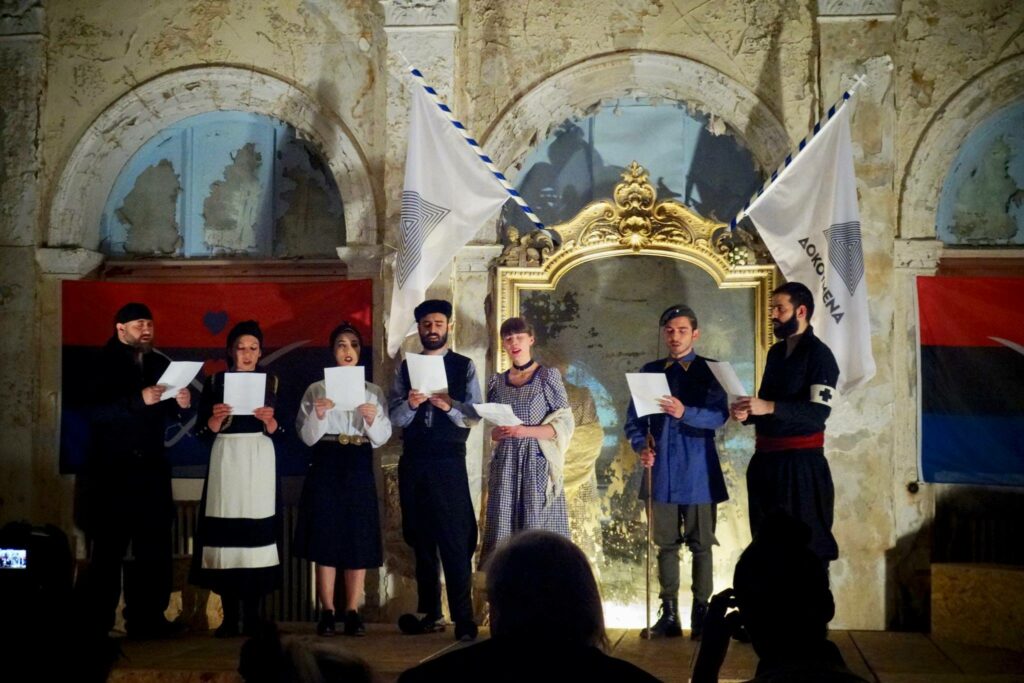
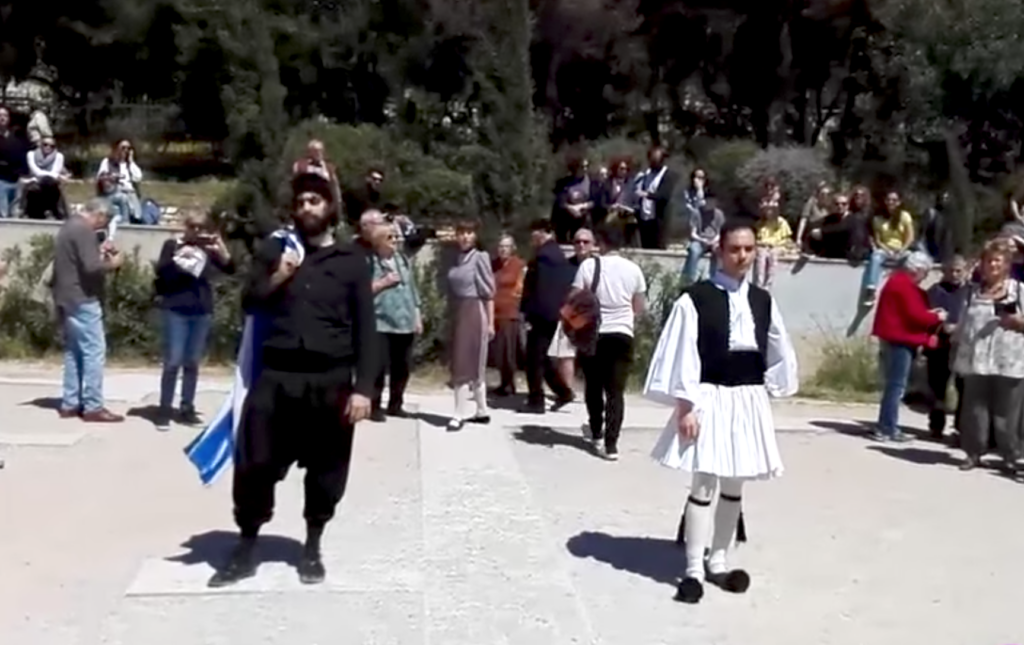
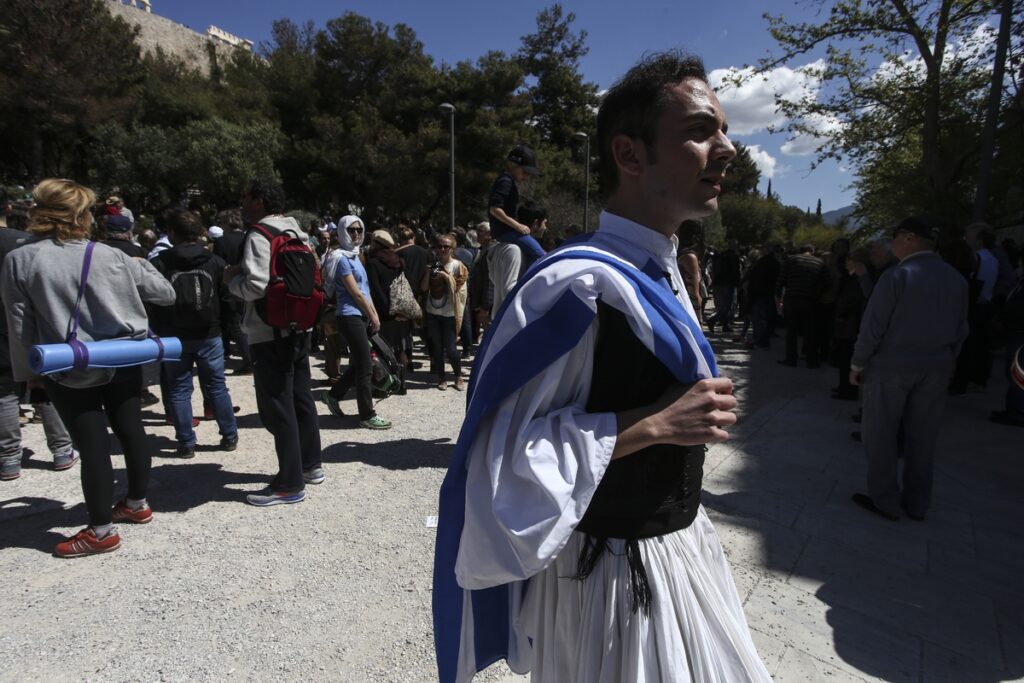
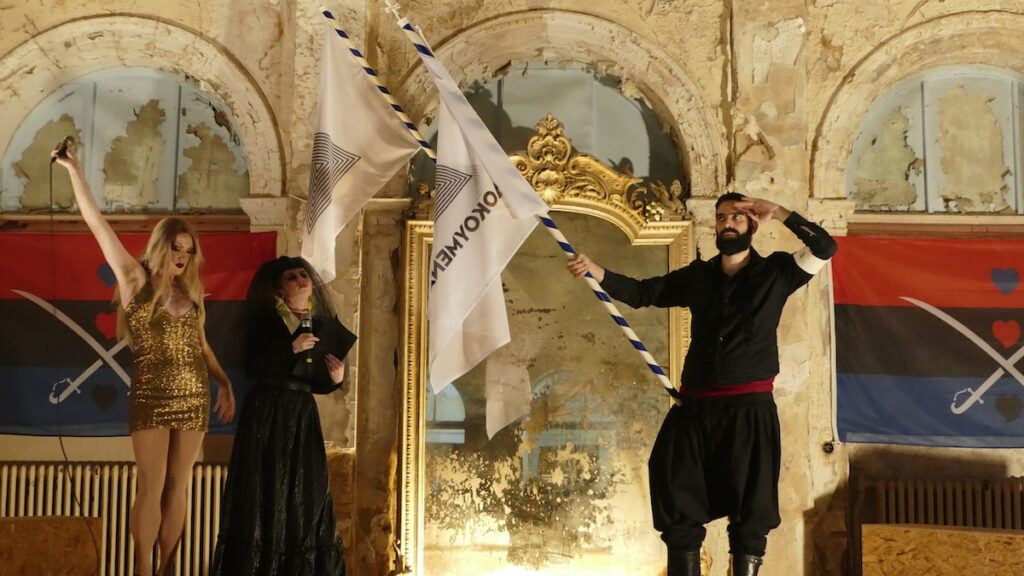
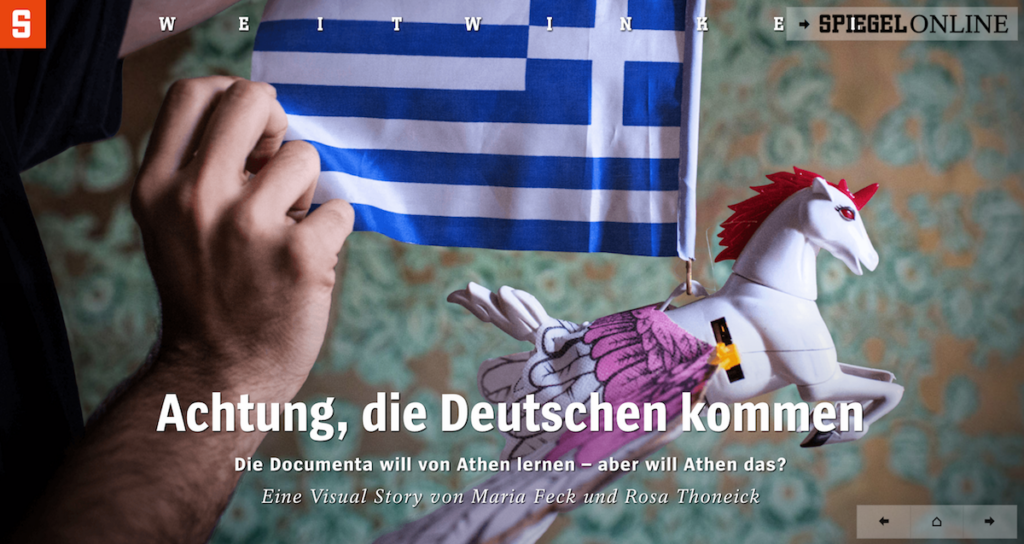
14 Days in the life of a spicy pizza
@Athens School of Fine Arts [May 2016]
Α multimedia study on symbiotic psychosis, this project was initialy streamed live from the Athens School of Fine Arts. Something between a puppet-show, a music video, a telemarketing channel and a personal confession, the work asked viewers to combine a complex thread of connections and associations. The two characters appear both in real time and in the form of memories/fantasies represented by doppelgänger puppets.
The couple presented at the work suffers from folie-a-deux and discusses the nature of their symbiotic predicament. Theoretical texts, diary entries and delirious extracts evolve in a multi-reflexive dialogue. Pieces of identification reproduce obsessions, recycle fantasies and generally things go really wrong or scarily right. All this takes the form of a journey through spices’ scents. This work has mutated a number of times before finally coming together, yet its various manifestations always somehow self-destruct, adding the final touch to this work’s thematic about the discomfort of coexistence.
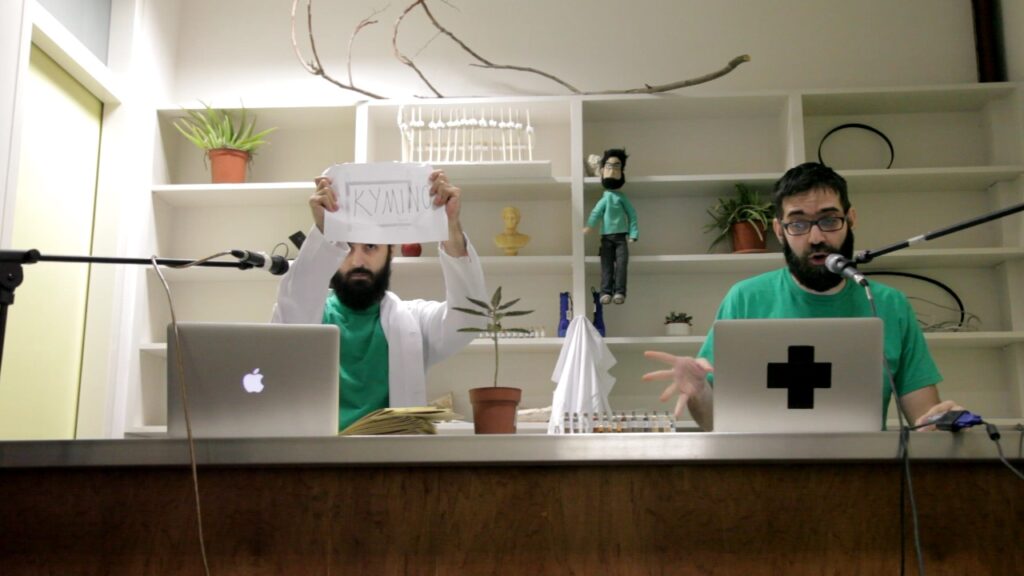
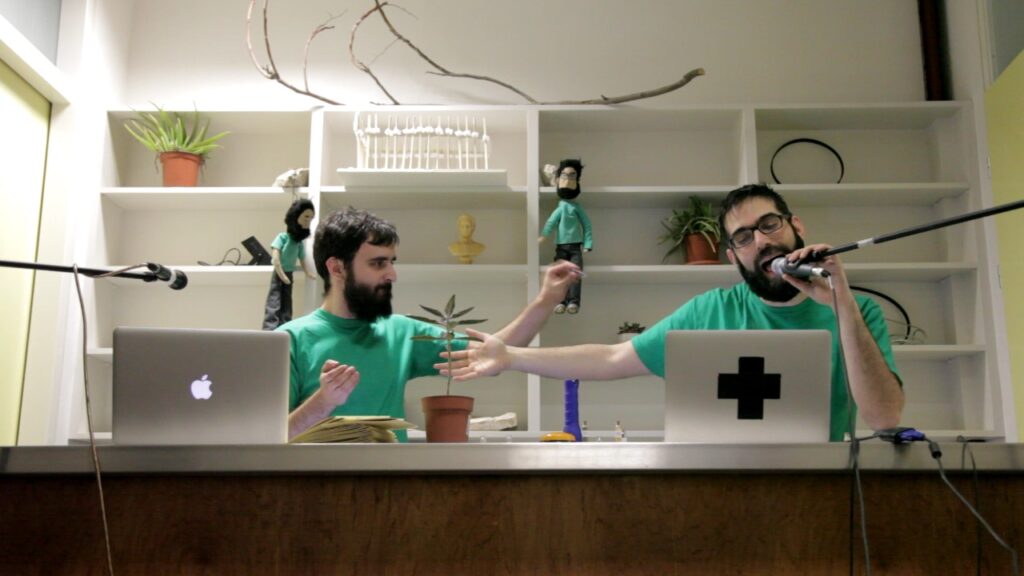
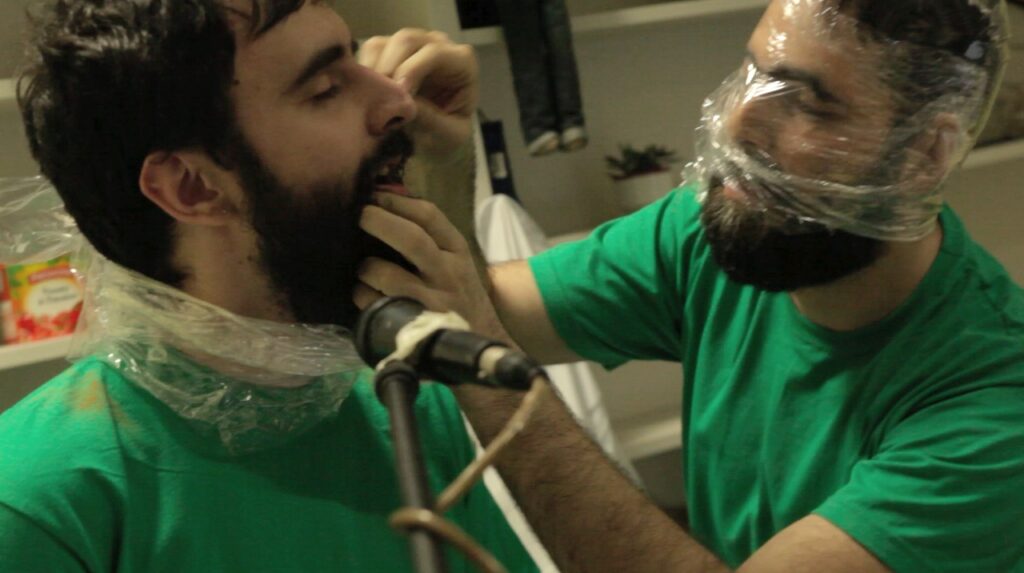
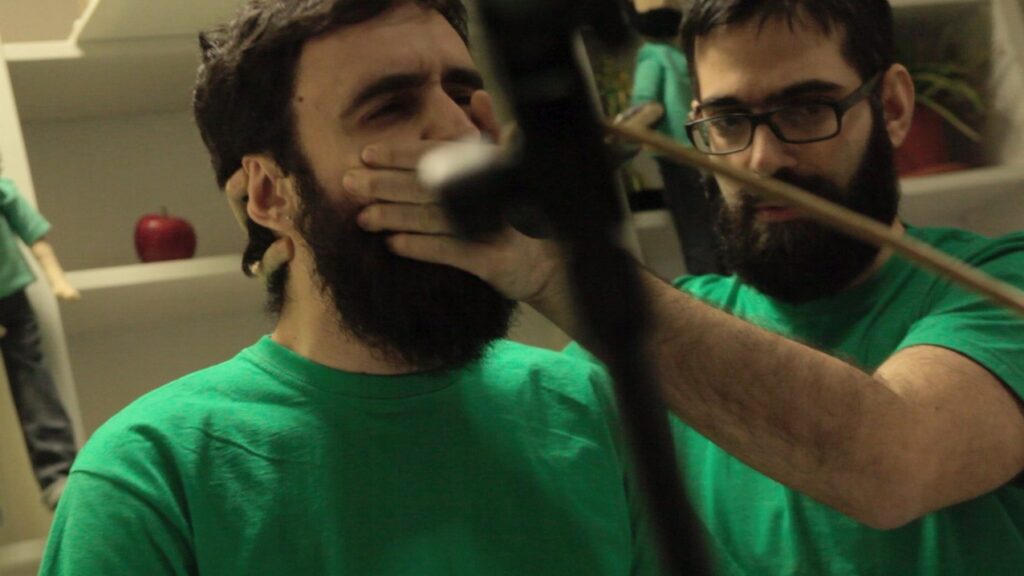
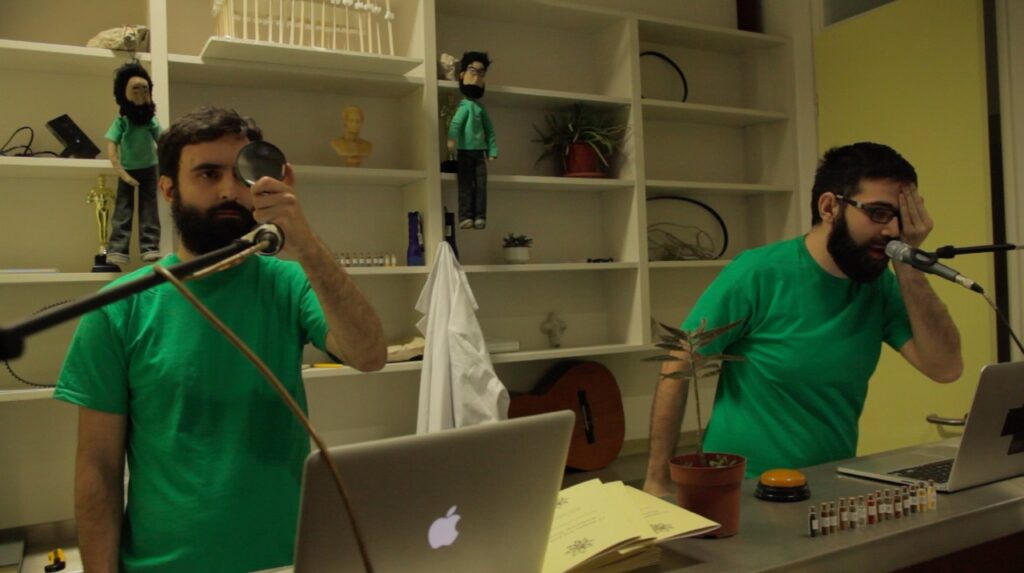
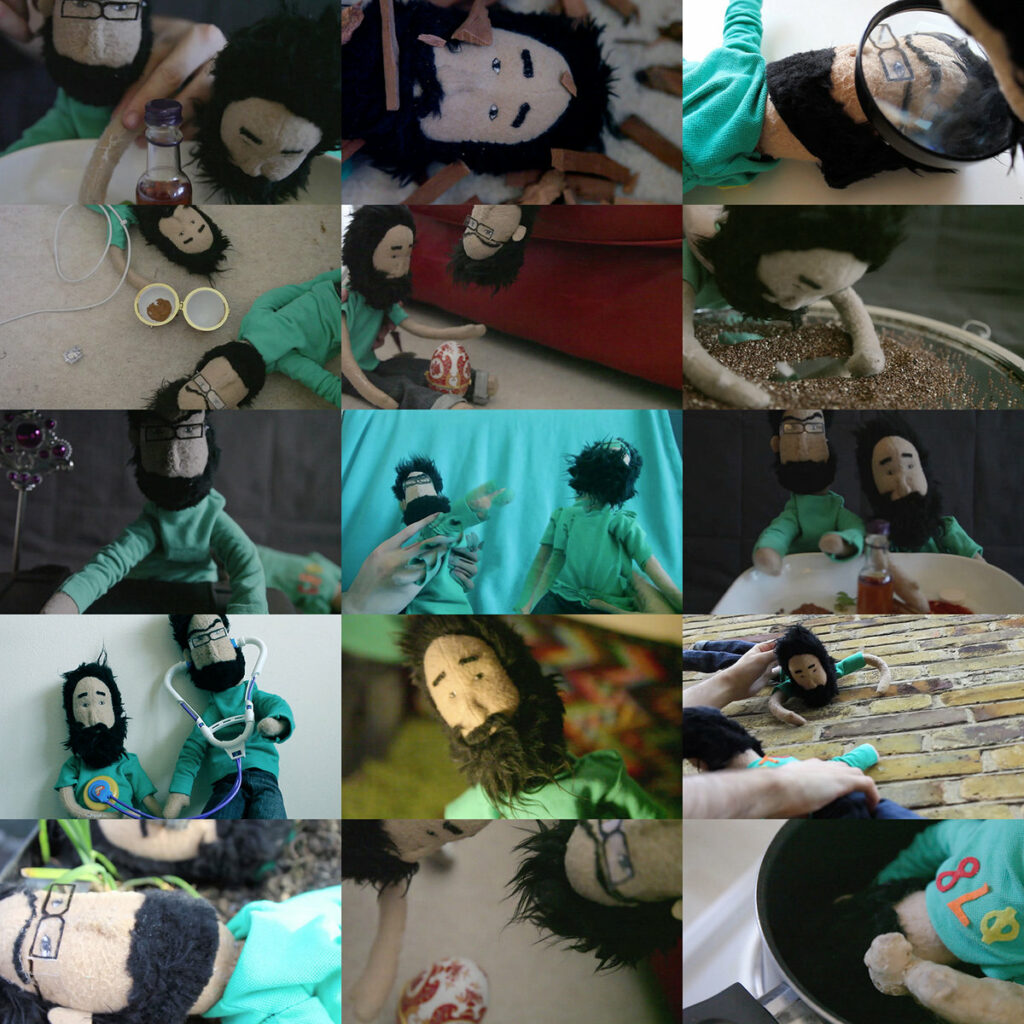
Hellenic Awakening
@Onassis Cultural Centre [Apr 2016]
Bringing together conspiracy theories about the greek language, pseudo-scientific analyses, neonationalist rhetoric and institutional critique, this was intended to be FYTA’s most vicious performance, attacking the greek art establishment itself, while taking place at the foyer of the Onassis Cultural Centre. Built in the style of a public-lecture-meets-indoctrination-ritual, the presentation mixed various types of unreasonable and reasonable rhetorics resulting in a psychotic overidentification spectacle about greekness and artistic purity.
In this showcase, FYTA encountered the limits of grand institutions more than any other spaces they have performed in. The overidentification effect melted with reality somewhere on the way, as during the performance FYTA realised that a large part of the exhibition’s audience actually rejoiced in the smart-arse neonationalist rhetoric. In the end, this was FYTA’s most tragic attempt at being relevant in a hopeless place. The limitations of such an extravagantly grotesque institution (Onassis Stegi) and such irrelevant exhibition (the Hypnos project) were felt on their skin. In that sense, The Hellenic Awakening can be considered either their biggest flop or most successful work to date, depending on one’s perspective.


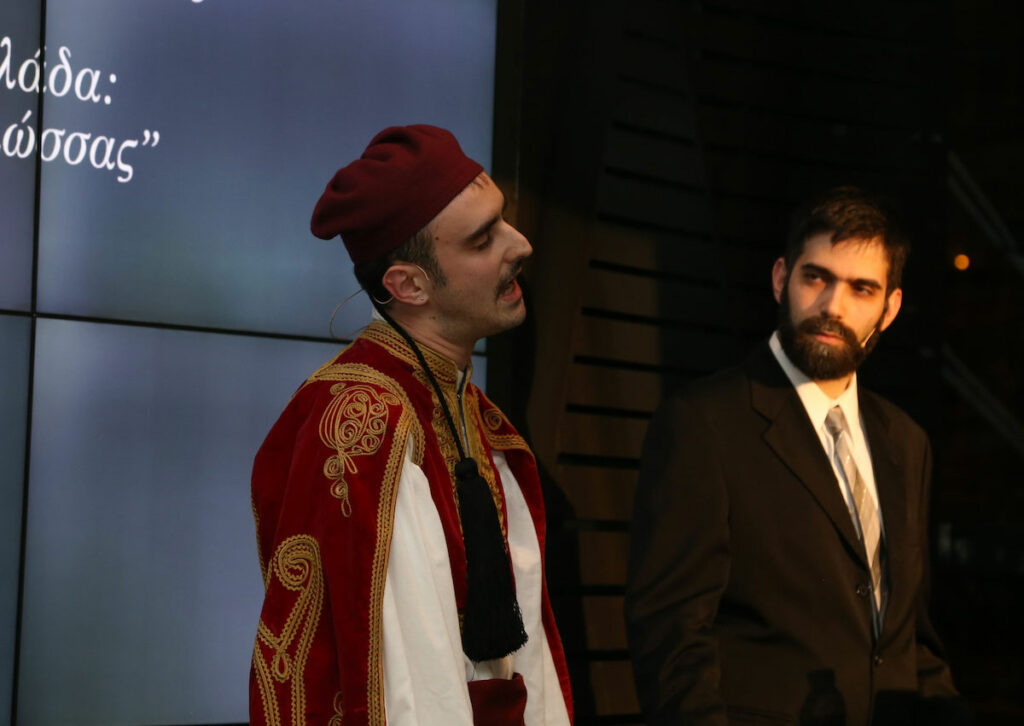
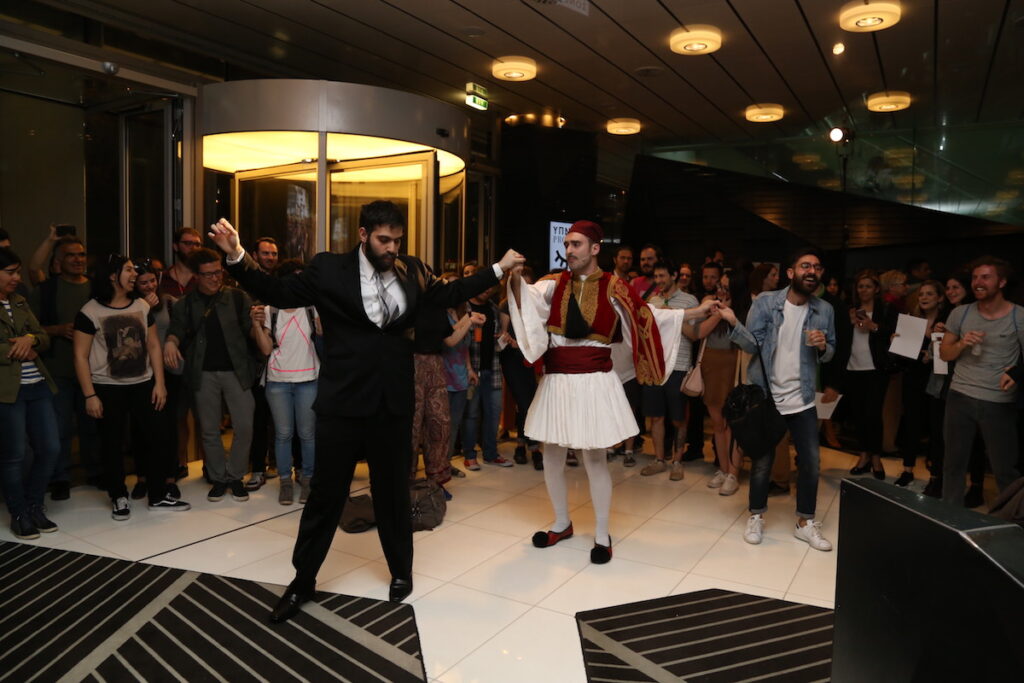
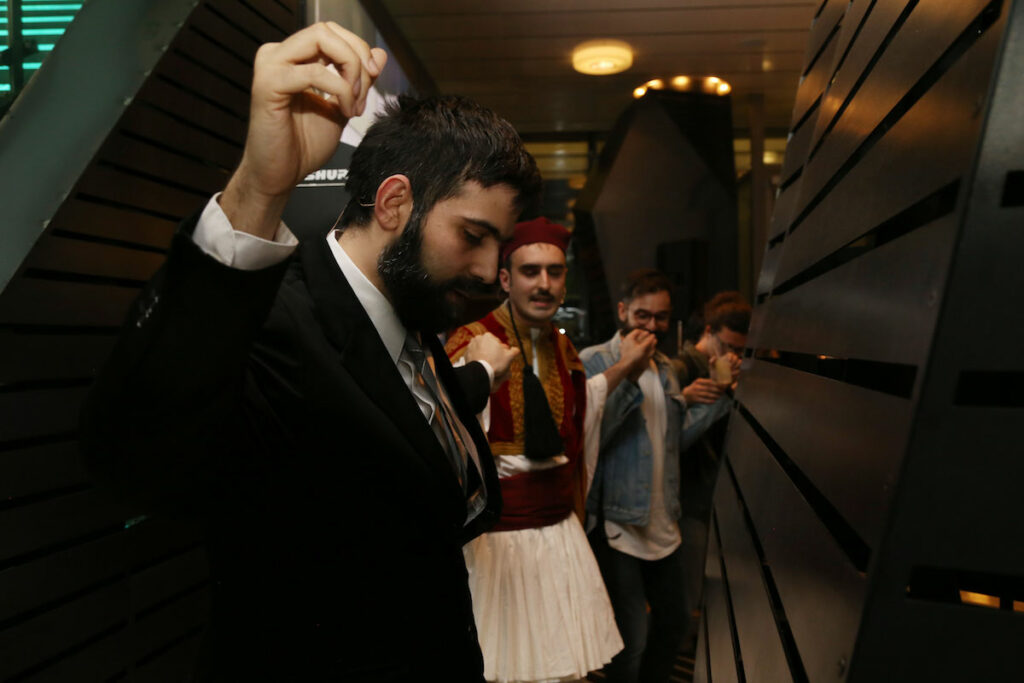
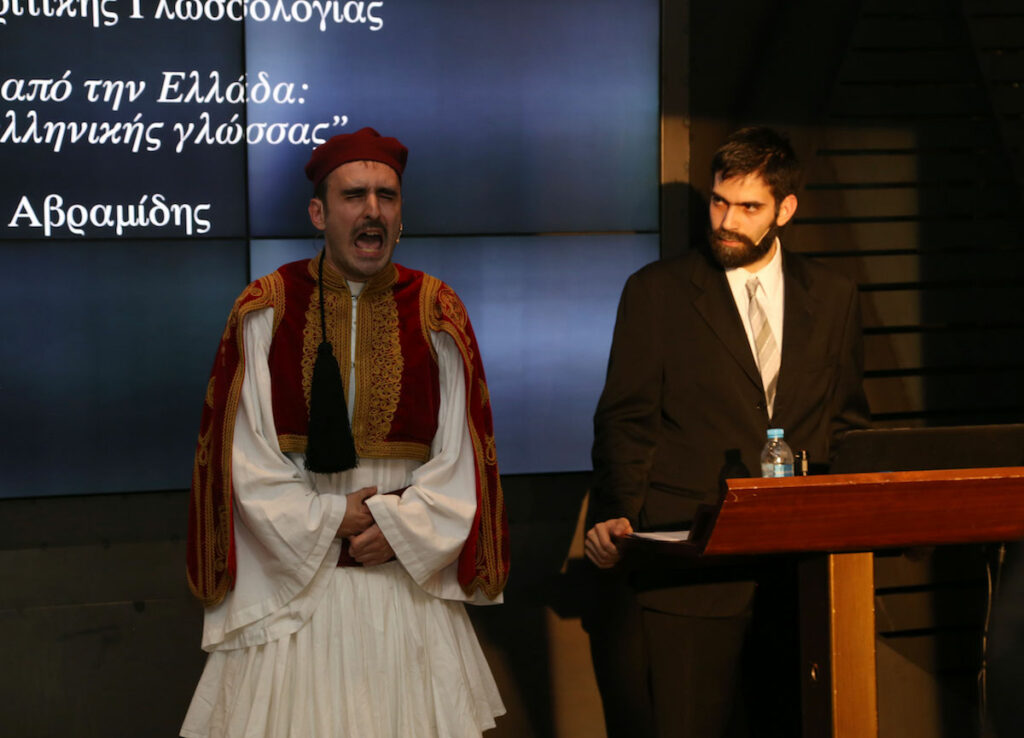
Marinator
@online [Mar 2016]
At the beginning of 2016 a large collaboration between the Marina Abramovic Institute and greek arts organisation NEON brought to Athens the groundbreaking [sic] Abramovic method, presented as part of the exhibition As One. The project showcased the work of 30 greek performance artists who were trained by Marina Abramovic herself. The greek performers had the opportunity to showcase their work on a daily basis for 7 weeks.
After the announcement of the titles and descriptions of all performances in the promotional material of As One, FYTA identified the underlying common themes and structures of those performances and built an algorithm that could generate thousands of similar projects and artists. Marinator™ is an online content generator. Each time a user clicks on the ‘marinate’ button, Marinator™ generates a new, random combination of an action, analysis, title, face and name. Surprisingly the results are often as realistic or even more realistic than the official descriptions taken from the exhibition’s website. According to quantitative data, the average user needs to do about eleven marinates before suspecting the randomness of the generated output.
Programming by k-risc
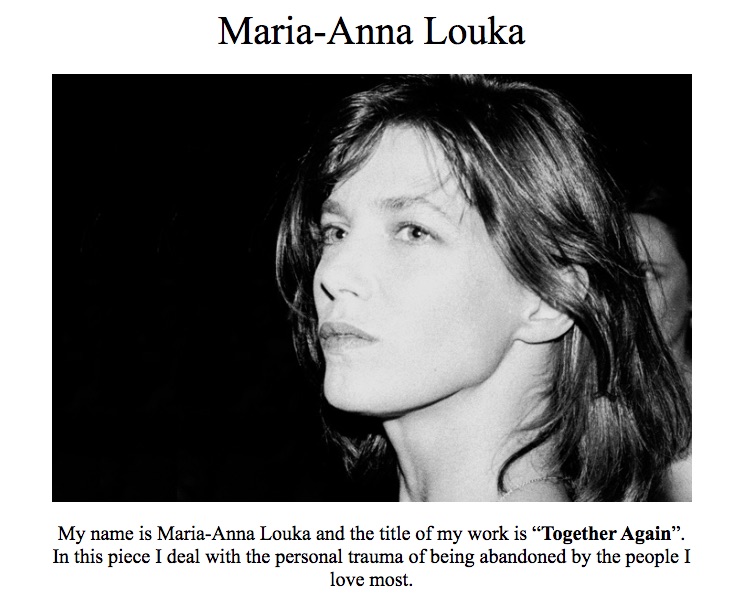
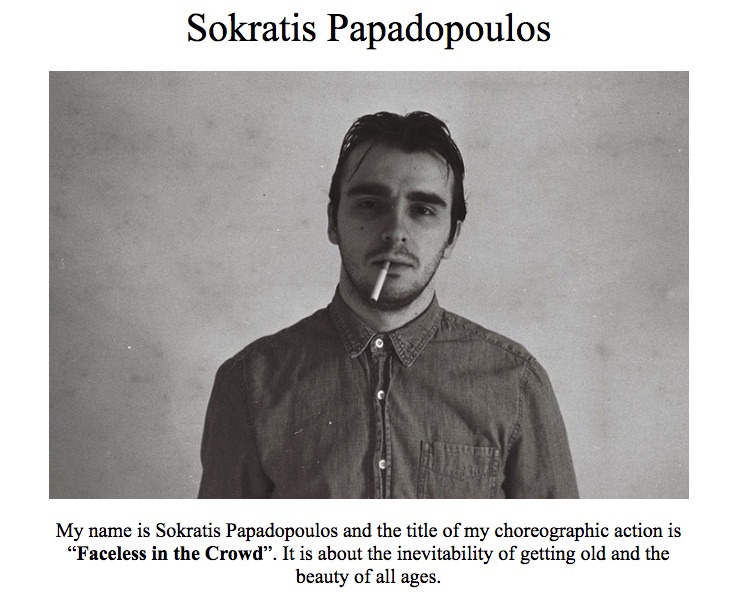
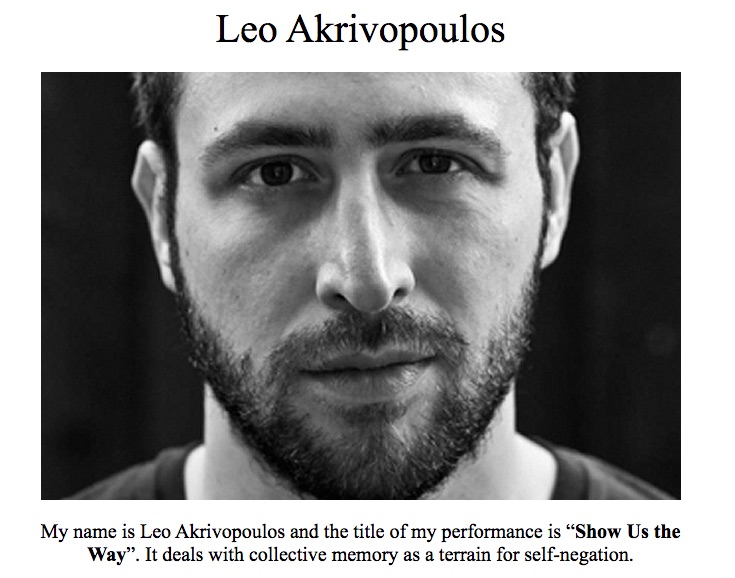
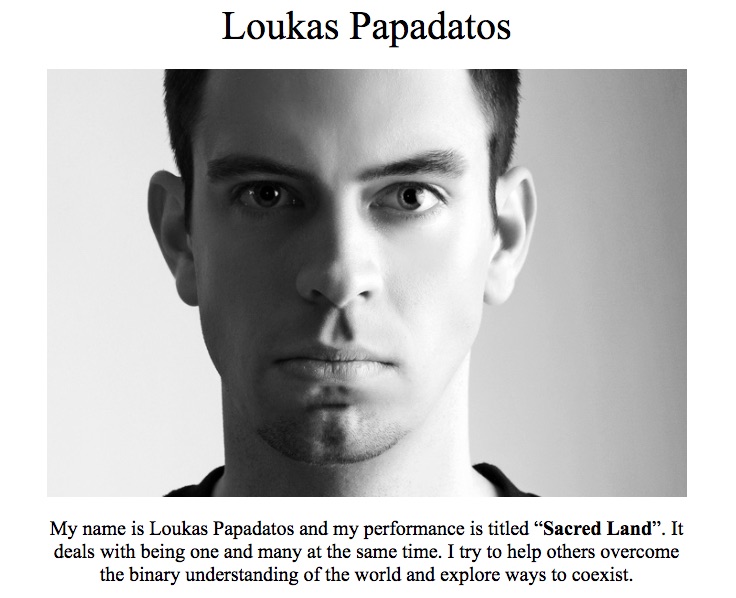

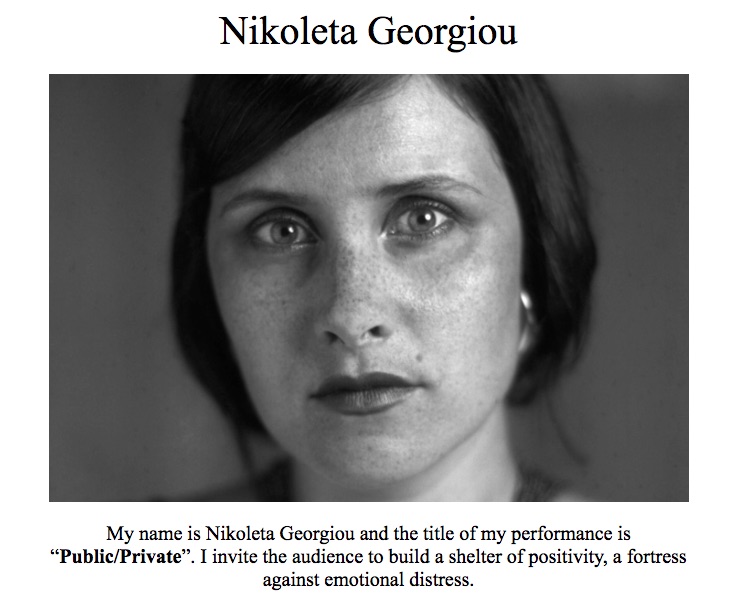
FYTA vs New Museum saga
@online [2016 — Jan 2019]
In 2016, FYTA were contacted by New York’s New Museum to participate in an exhibition showcasing up-and-coming artists of the athenian scene, co-organised with the DESTE foundation and Benaki Museum. While FYTA initially agreed to participate a few months later and after creating a first draft, the curator informed them that there was no artist fee or budget for works, which felt outrageous considering the size of institutions involved. What made it ever worse was the supposed sentimental tone of the curator’s email. As a response, FYTA refused to participate and created a crowdfunding spoof for the support of the costs of the exhibition, which was accompanied by a big-choir-80s-charity-style song about poor artists, based on the melody of Quincy Jones’s big charity hit “we are the world”.
This incident instigated a four years saga / feud with DESTE foundation and the New Museum. The conflict culminated with the institutions reaching out for another collaboration (without an artist fee) in 2019 in the context of their second Athenian exhibition titled “The Same River Twice” (no pun intended?). You can find a detailed account of the conflict with all relevant documentation including email exchanges, running commentary, relevant videos and images on the website linked below.
The work was endorsed by W.A.G.E. (Working Artists and the Greater Economy) an international organisation that fights for the rights of artists and artworkers.

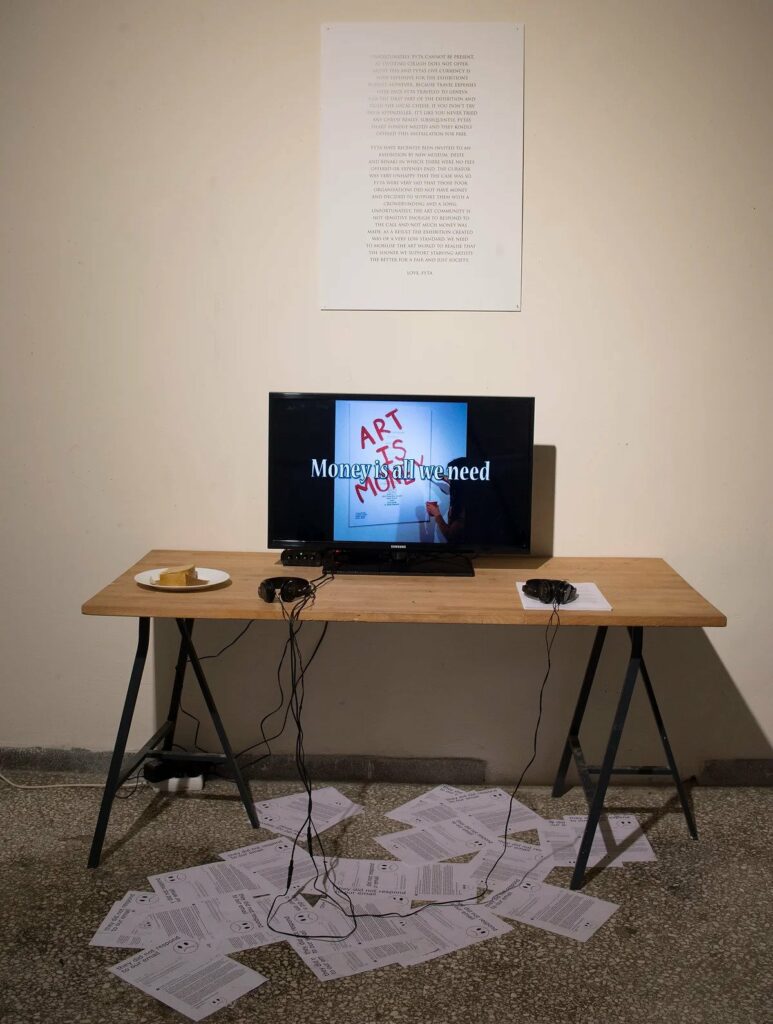
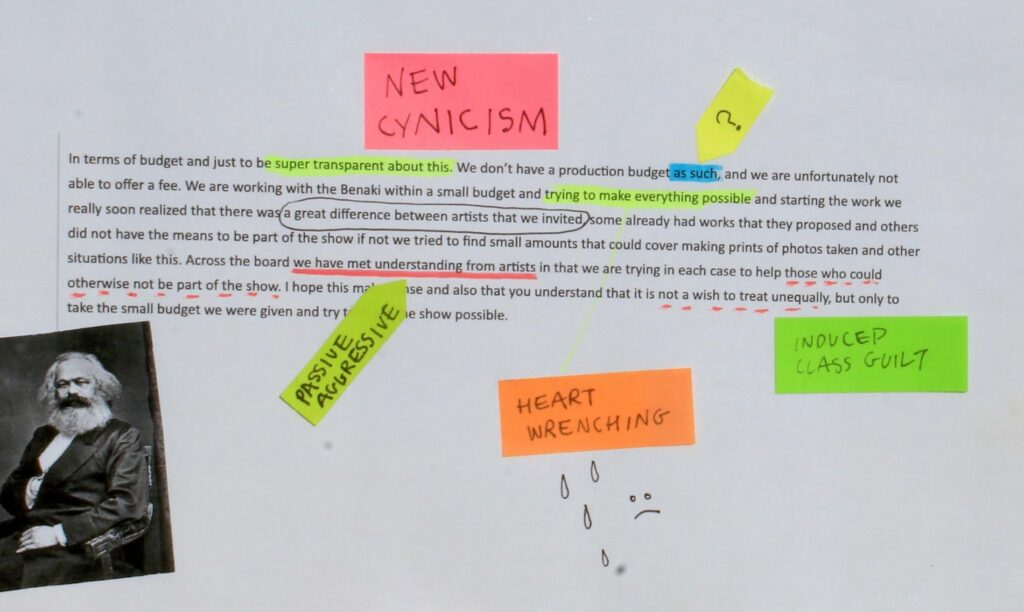


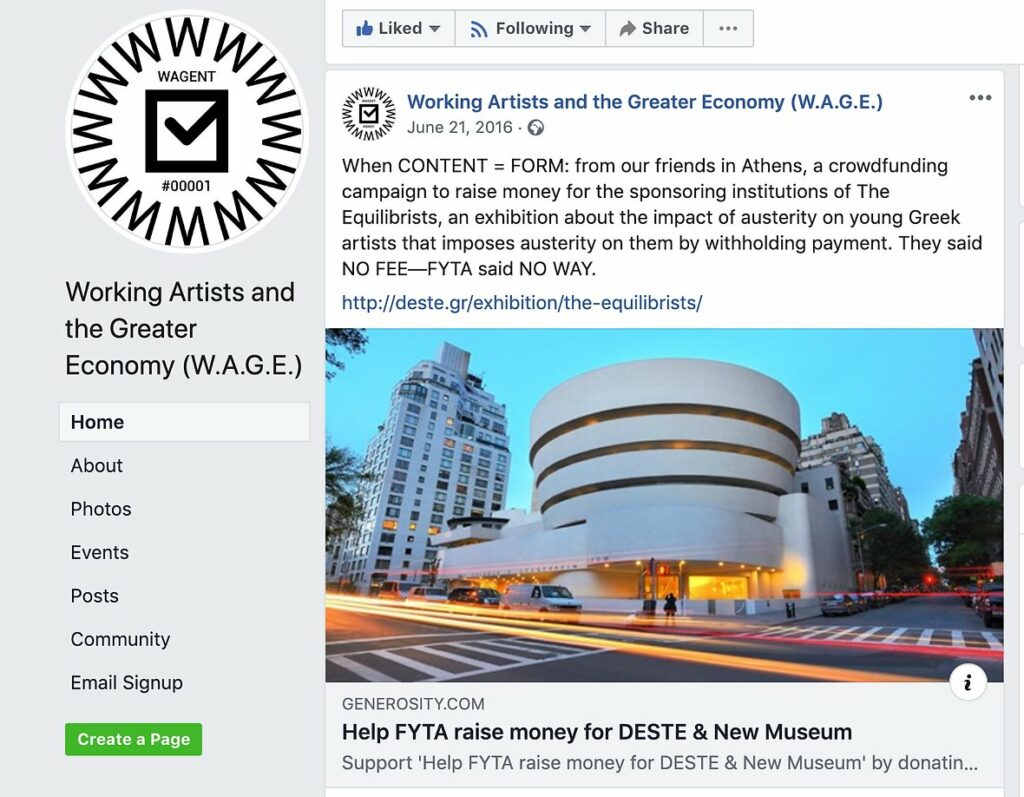
n(EURO)logy
@Batiment d'Art Contemporain, Geneva [Oct 2015]
In this performance/situation that took place at Geneve’s Bâtiment d’Art Contemporain, FYTA presented themselves as doctors/cardinals, paying respect to the beauty of western culture and warning about the foreign dangers against European values. The main bulk of the three-part performance took place within a confined room that resembled something between a cult’s basement and Clockwork Orange’s reform clinic. In order to enter the room, visitors were asked to answer a questionnaire with politically complex (and often quite literally impossible to answer without acquiring a reactionary position) questions. Once inside the room, the audience was met with apocalyptic cardinal DJs repeating freedom mantras, bloody scenes at the funeral of Europe and psychotic doctors talking about the superiority of European cheeses.
With the participation of V. Kostayola and S. Bebeza
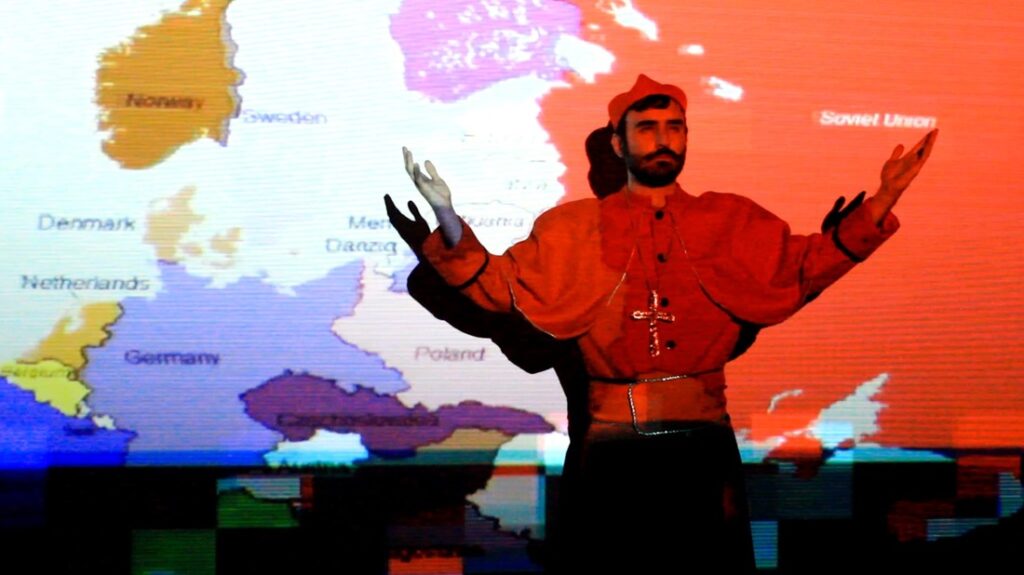
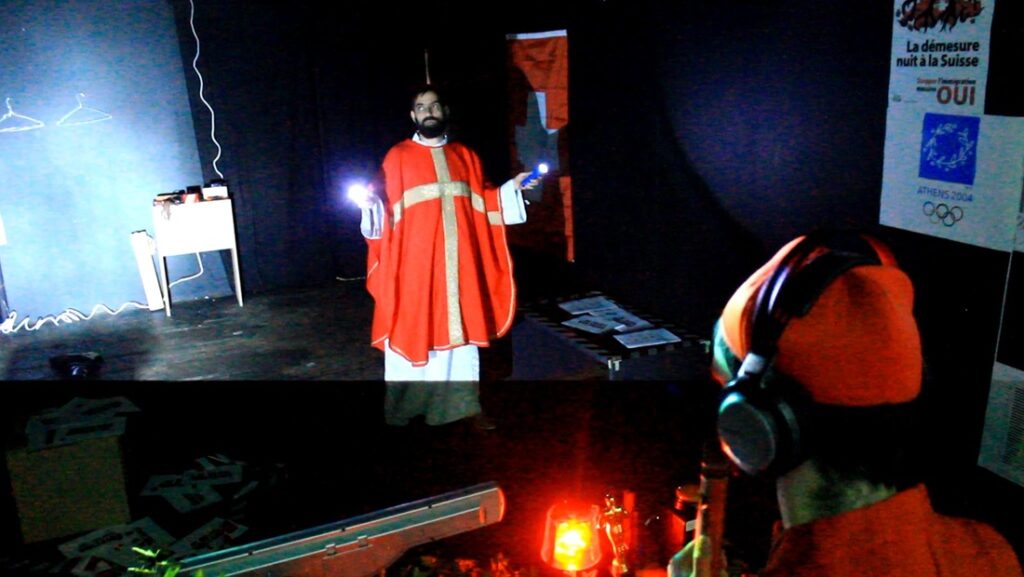
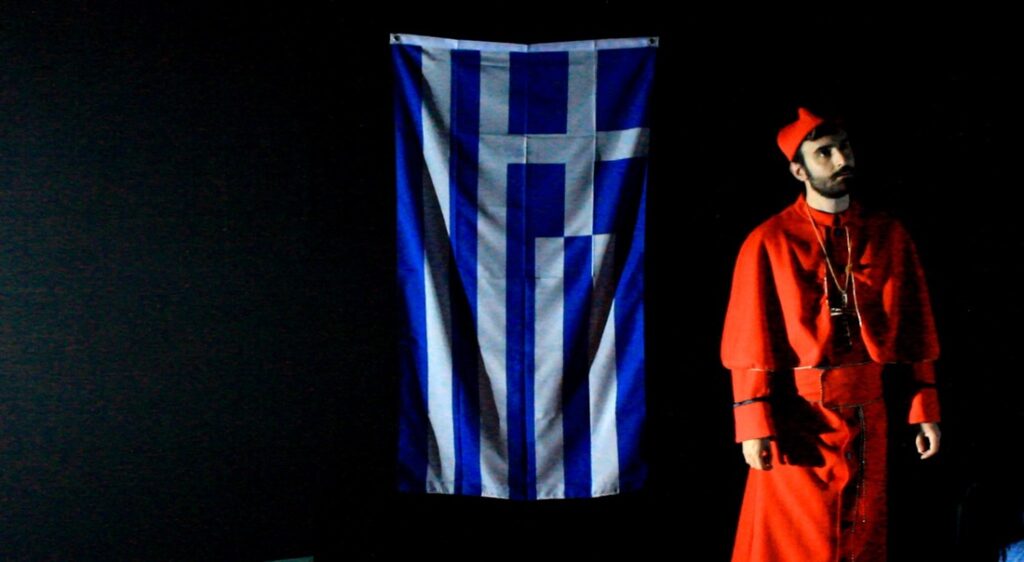
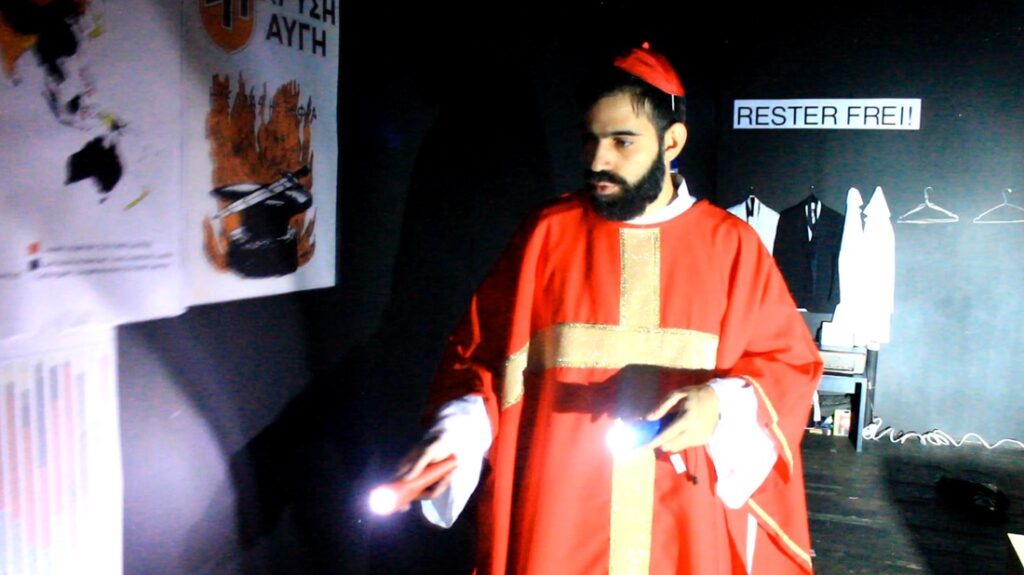
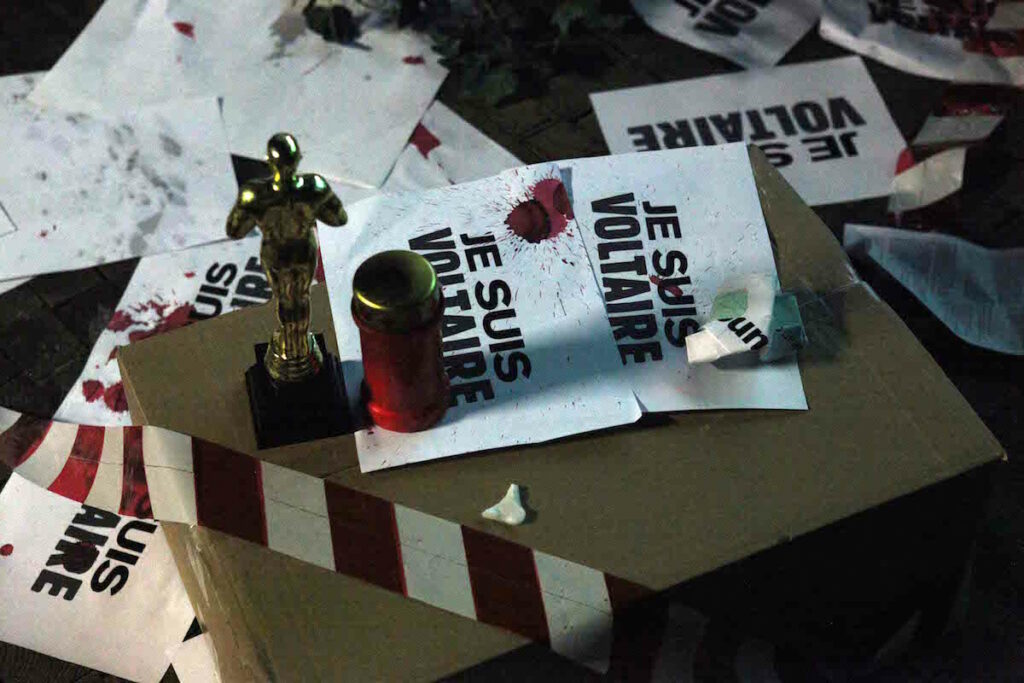
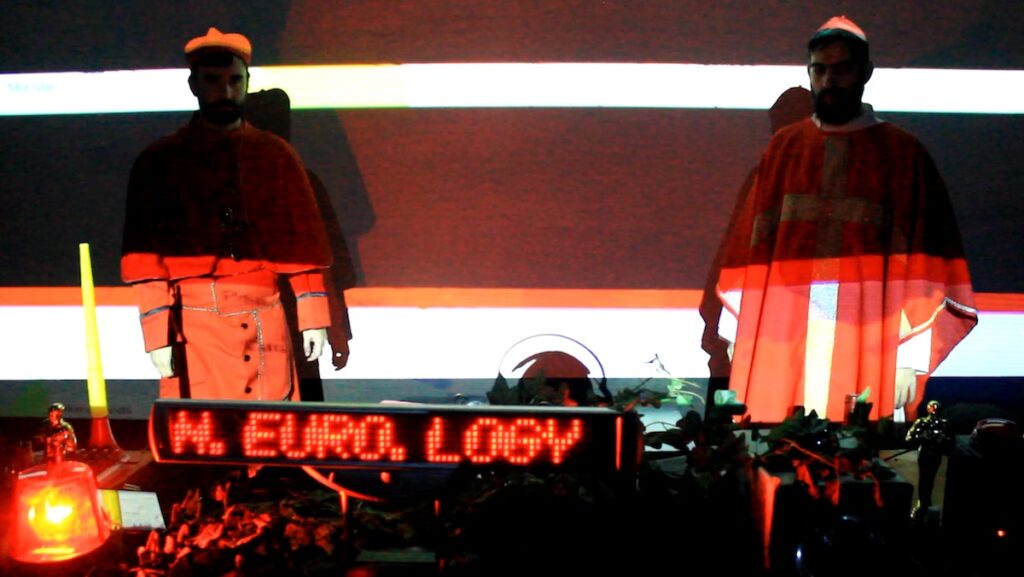
Glüh/Birne
@nGBK, Berlin [Dec 2014]
Glüh/Birne was a multimedia delirium where (post)-political indignation meets (anti)nationalist enjoyment – all with a queer ethos and apocalyptic aesthetics! Dressed as annoying-pears, FYTA took the stage with the task to re-present nature in its raw and un-natural origins, a nature that is monstrous and, as they claimed, ultimately very greek.
Using the term Glüh/Birne, a pun on the German words meaning light, pear and bulb, FYTA built a borderline truth about language, nature, national identity. Displacing what is seen as the socially-uniting commonsensical truth and replacing it with another, ever-elusive type of common sense, which is irritating and contradictory yet stubborn-minded and pseudoscientific, Glüh/Birne could be seen as a powerpoint presentation for the post-truth generation.
In this de-naturalising project, FYTA aimed at the total alienation of the audience, as well as themselves (in fact, in the single presentation of this work at NGBK in Berlin, they actually argued with each other on stage). Lost in a meta semiotic sea of stimuli, the audience falls into structural despair.
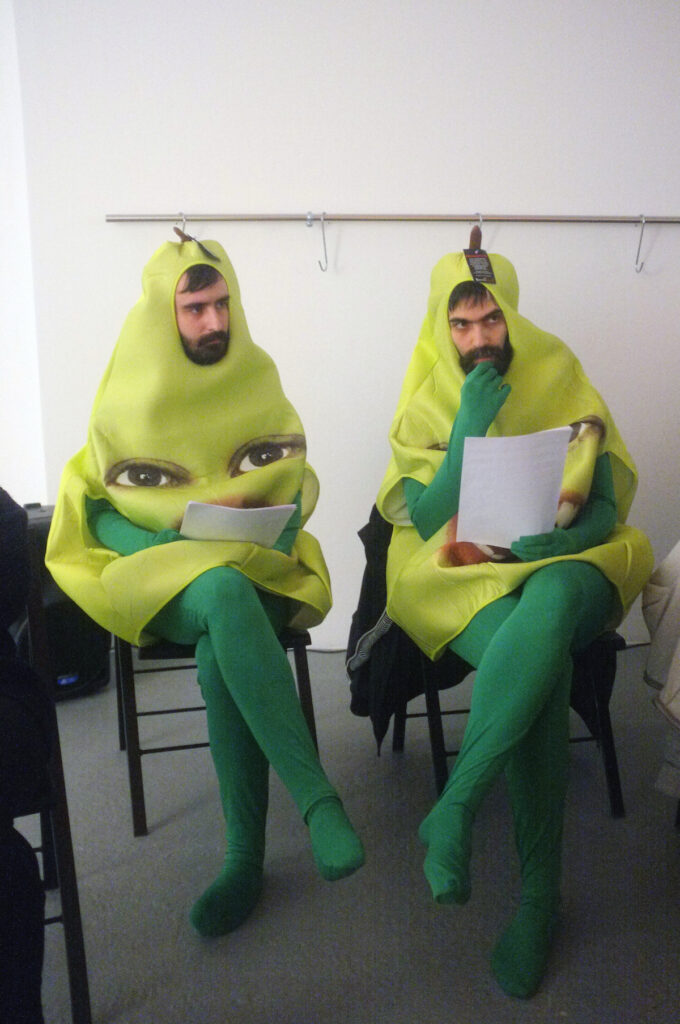
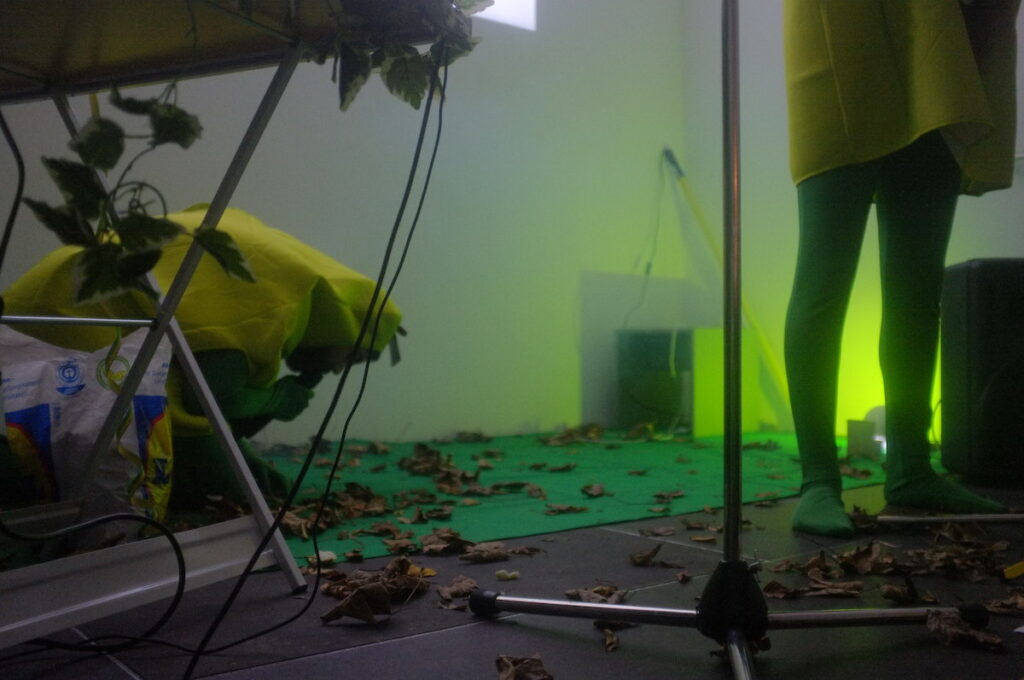
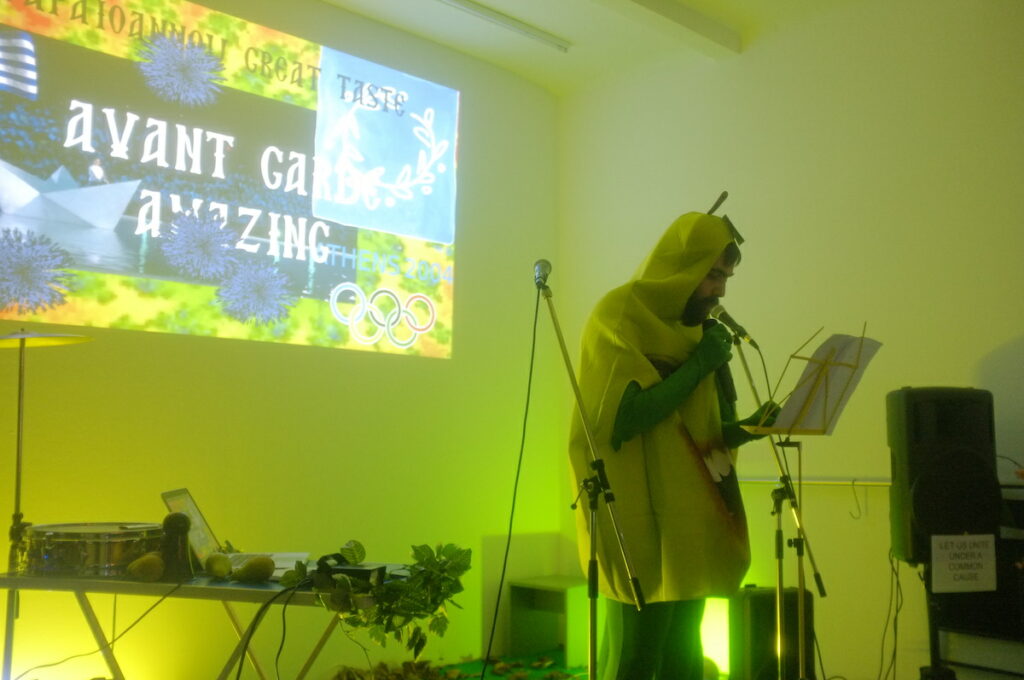
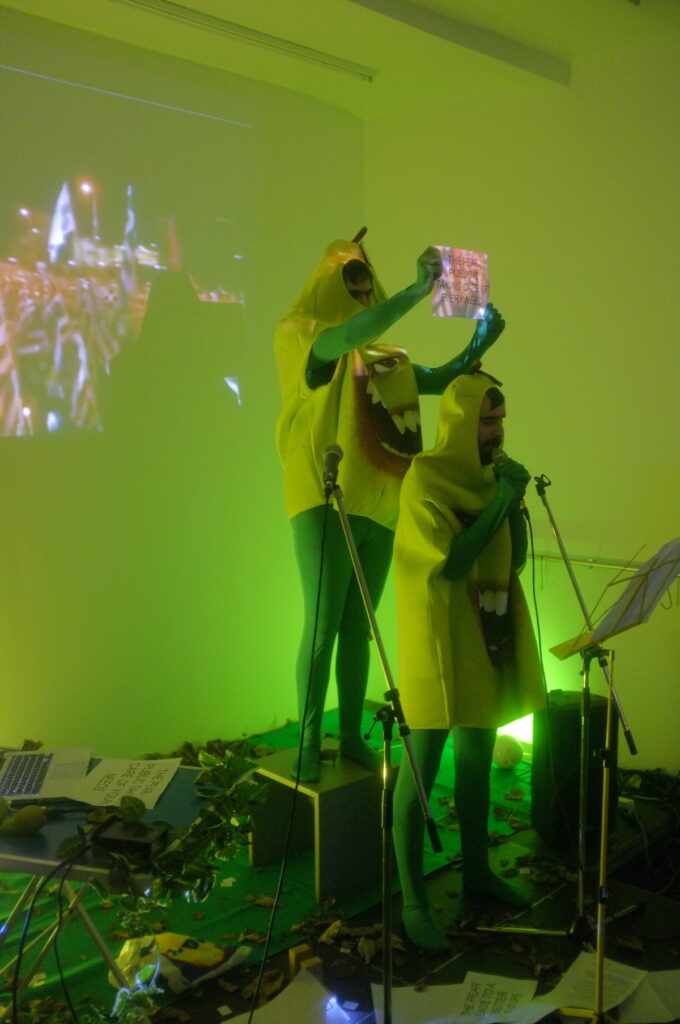
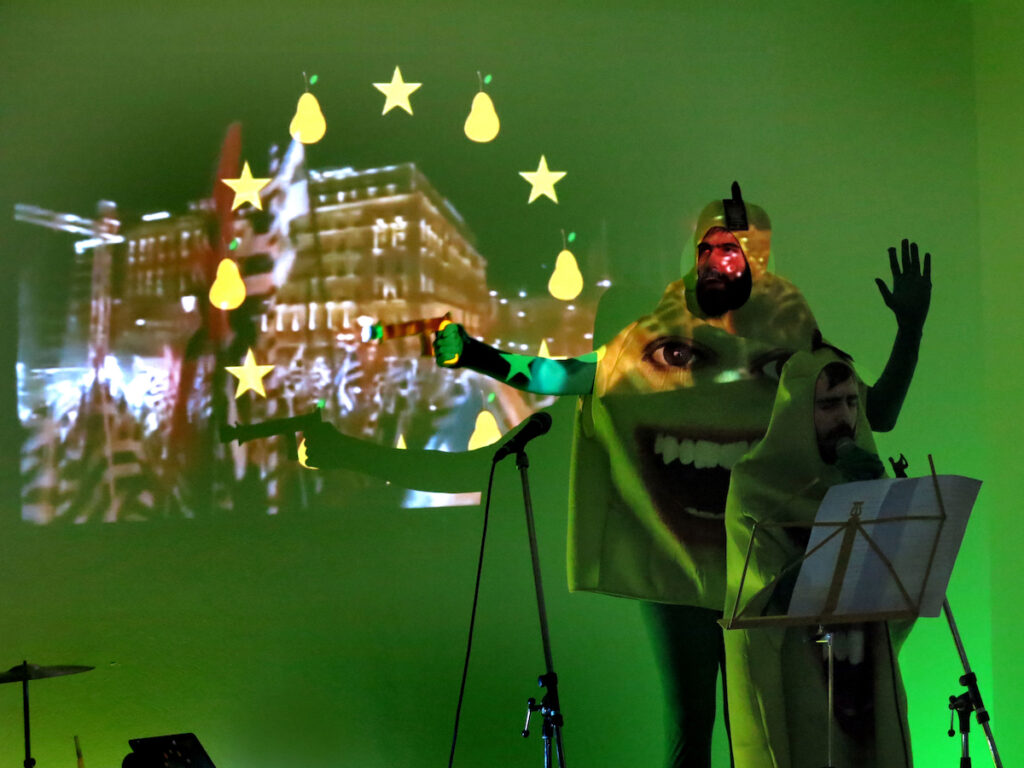
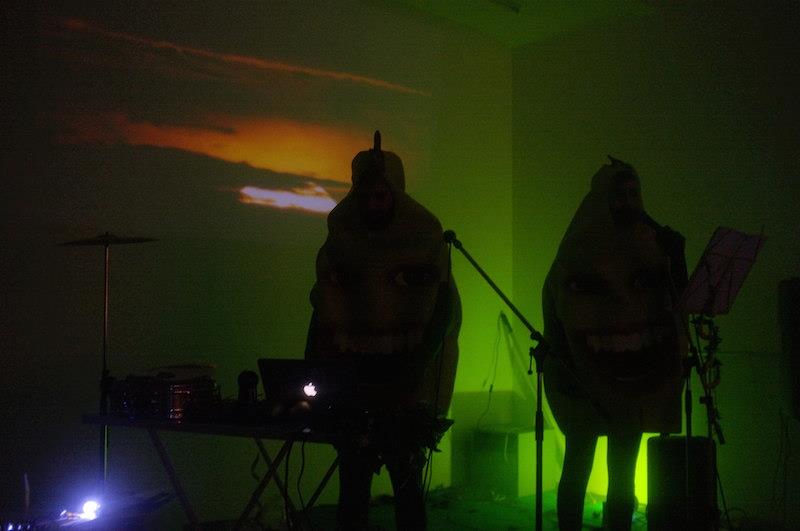
Pokemon Poetry
@Various Locations [Jun 2014 — 2018]
Pokémon Poetry was a multimedia project in progress. The project started as a fanzine consisting of nine short poems, each one written about a specific Pokémon character. The poems were then turned into songs and given a heavy lied-like treatment for piano and voice. Composer and pianist Alexandros Drosos and mezzo-soprano Ioanna Forti worked on the scores and produced a small song cycle, which was premiered live at the queer festival Sound Acts in 2015. They were also released on a very ltd edition cassette by Fytini.
Pokémon Poetry was started as a meta-commentary on various discussions around the ‘internet generation’. Often in these discussions the generation that grew up in the late 90s and early 00s is presented as completely cynical and incompetent to identify with any genuine emotions (instead expressing themselves through irony or distanciation). Exactly at this point, we built a project that combined raw (almost romantic) sentimentality, traditional means of expression (lyrical verse, piano and voice, music with classical influences) and a thoroughly post-modern point of reference: Pokémon. In a sense it was an attempt to create an instant classic, using a hypothetical time lag, i.e. trying to think what the audience / researchers of the future would want to find of FYTA’s contemporary time, when looking
back. In 2018, a live performance of Pokemon Poetry took place at ATOPOS CVC in the context of #TextMe_Lab series of events.
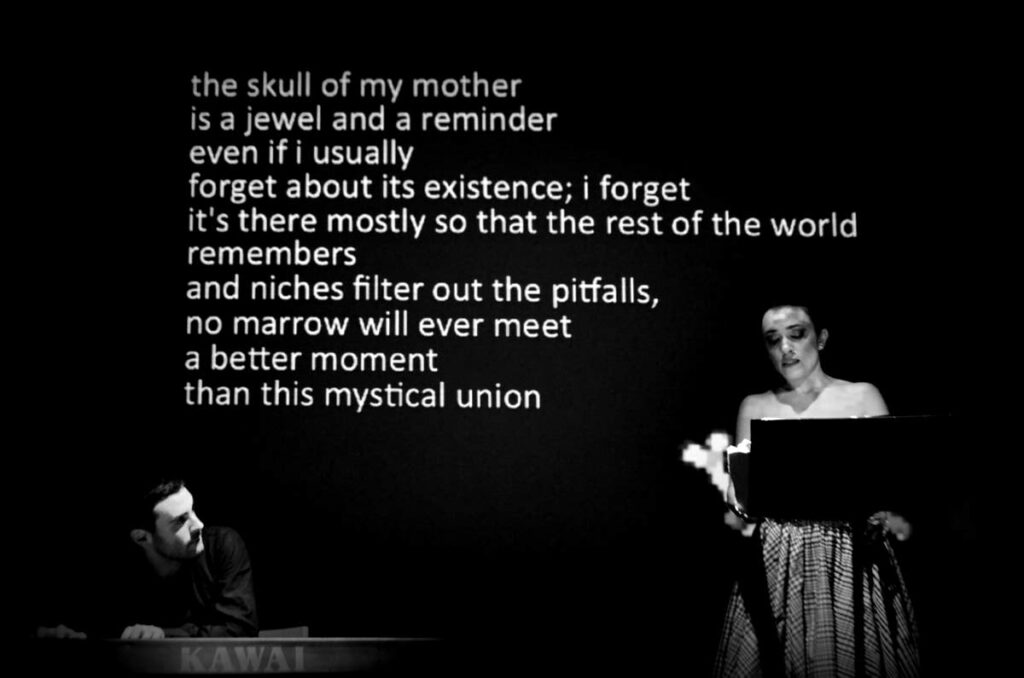
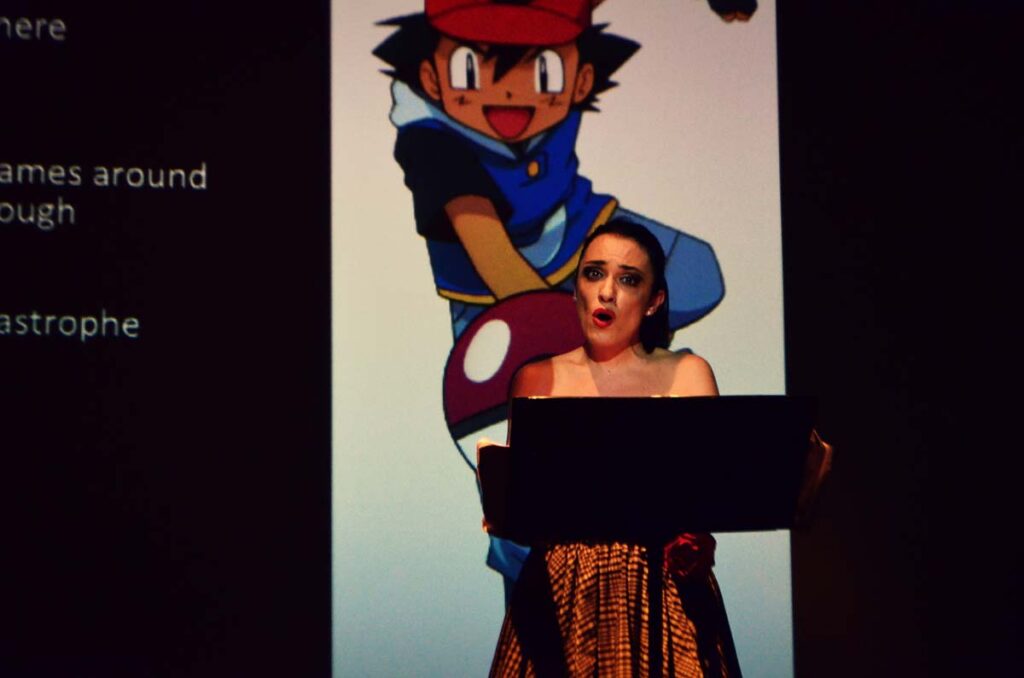
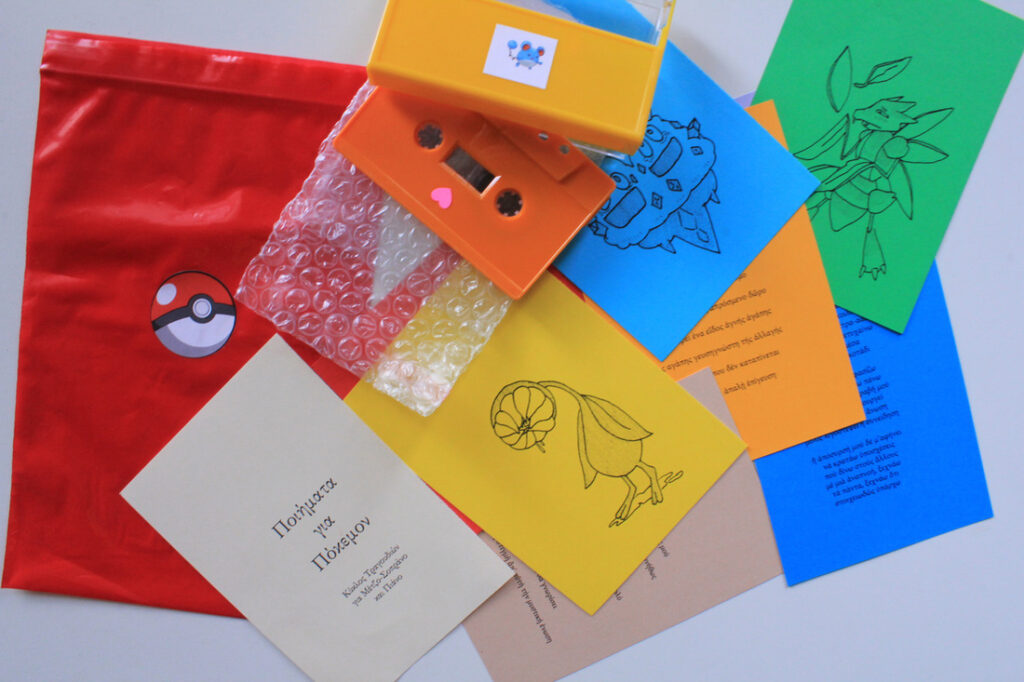
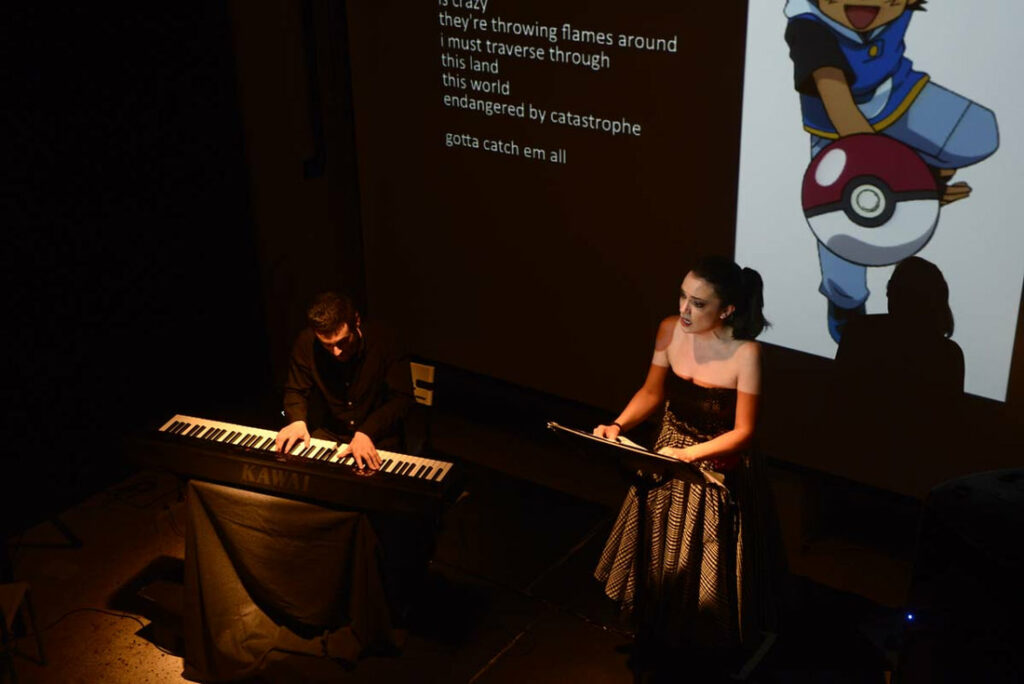
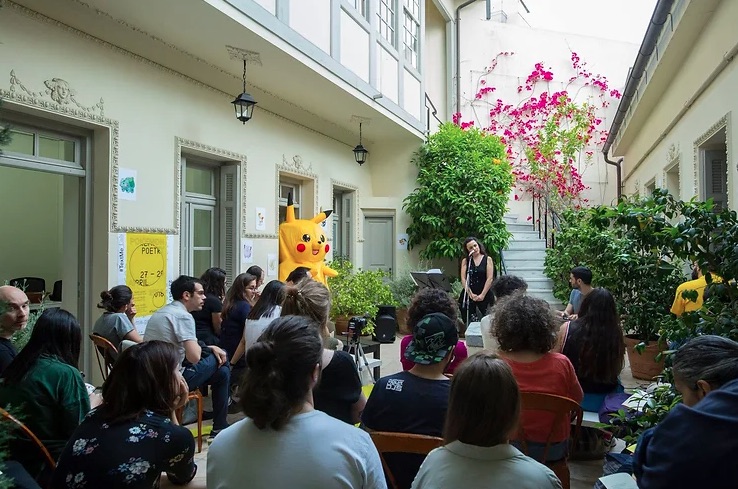

Genes of Stupidity
@Online [Feb 2014]
Playing with nationalist clichés about the alleged racial superiority of greeks but also a generalised web conspiracy-mania, FYTA presented an imaginary study correlating stupidity with a particular gene in the DNA of the greek population. The research, appearing as part of a genetic project of a large English university, also posed a question on a scientific discourse that builds psychosocial analyses on controversial genetic data. Despite the ridiculously naive initial position that suggests ‘greeks’ fall behind mentally due to genetics, and despite the minimal effort put so that the video looks reasonably ‘realistic,’ it became viral in just a few hours, with thousands of reposts and playbacks. The hundreds of abusive comments on youtube and facebook bypassed the obvious troll-ish character of the video and preferred to build an entire conspiracy surrounding the dark intentions of foreign powers seeking the elimination of Hellenism. The patriotic comments came from sources all through the political spectrum: from the far right all the way to the anti-austerity left.
The project Genes of Stupidity was created in collaboration with biologist-artist Astero Kappa
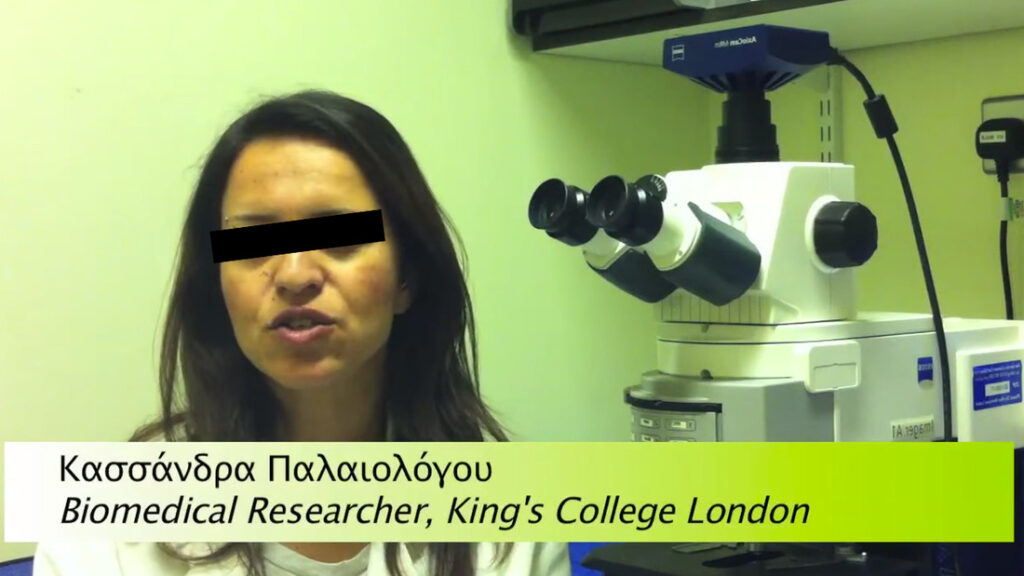
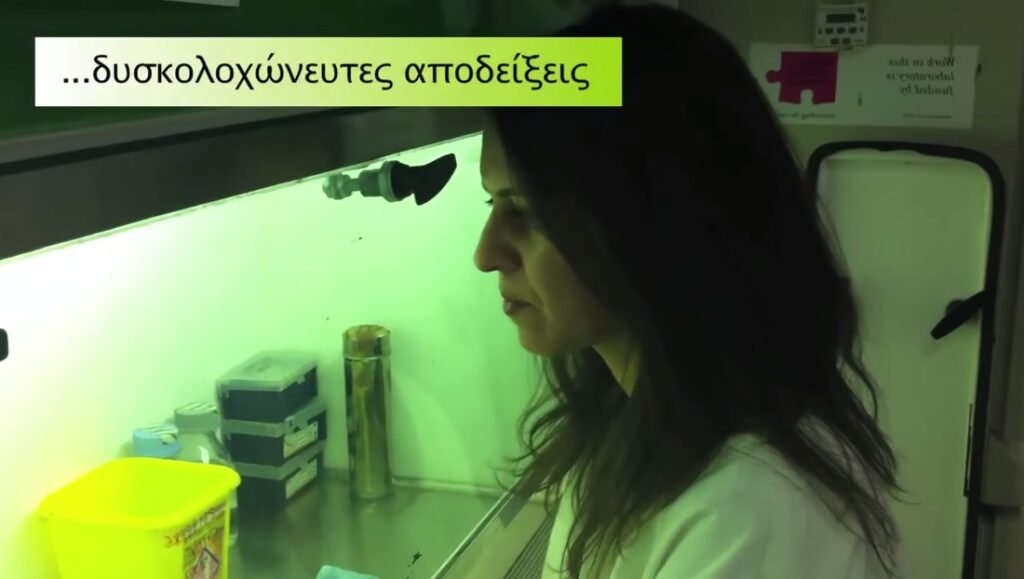
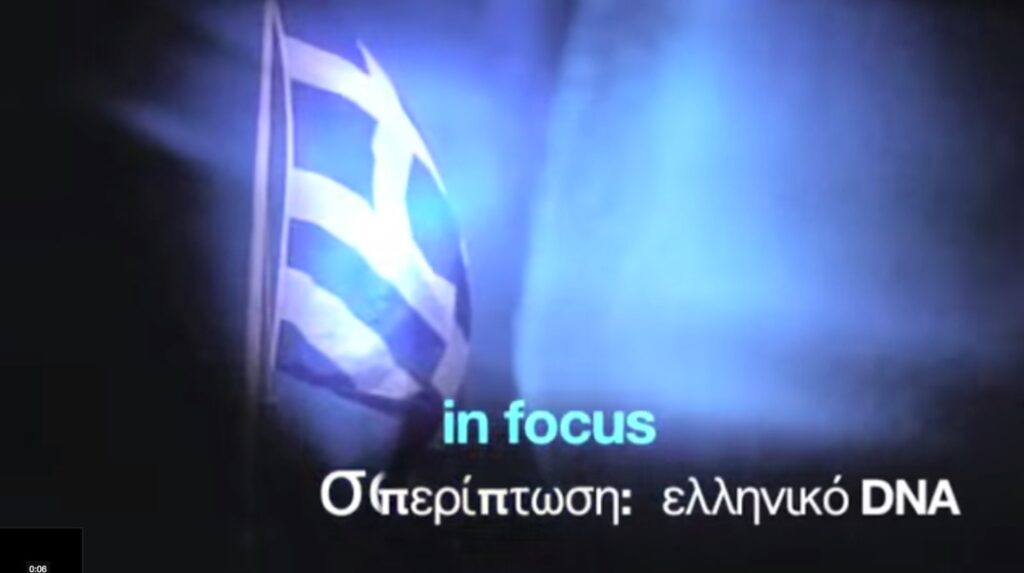

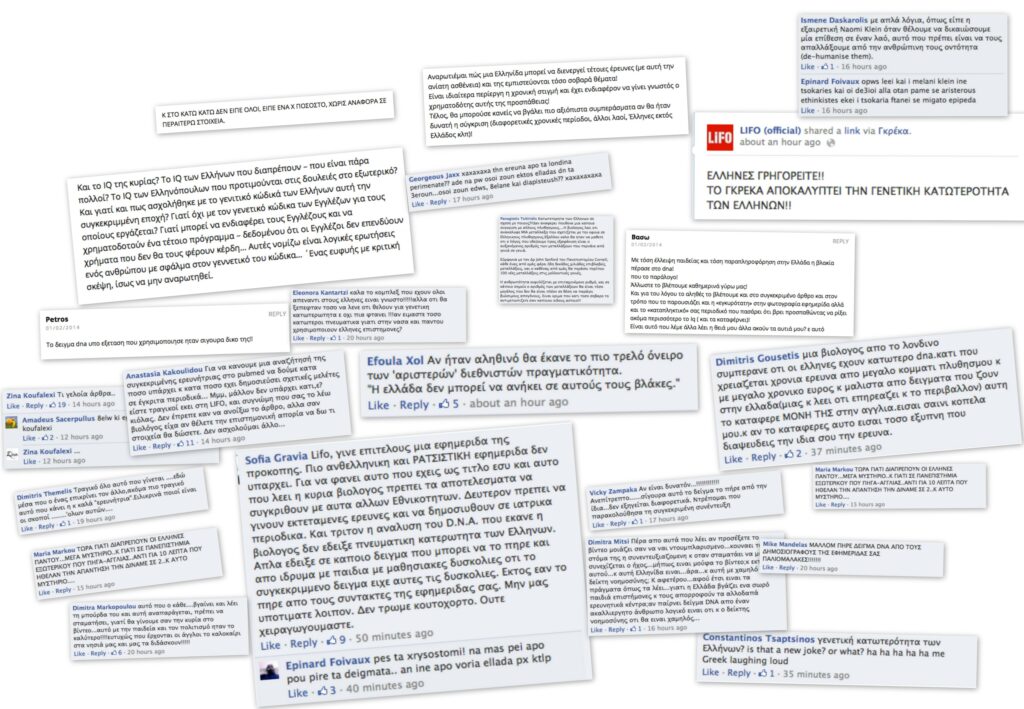
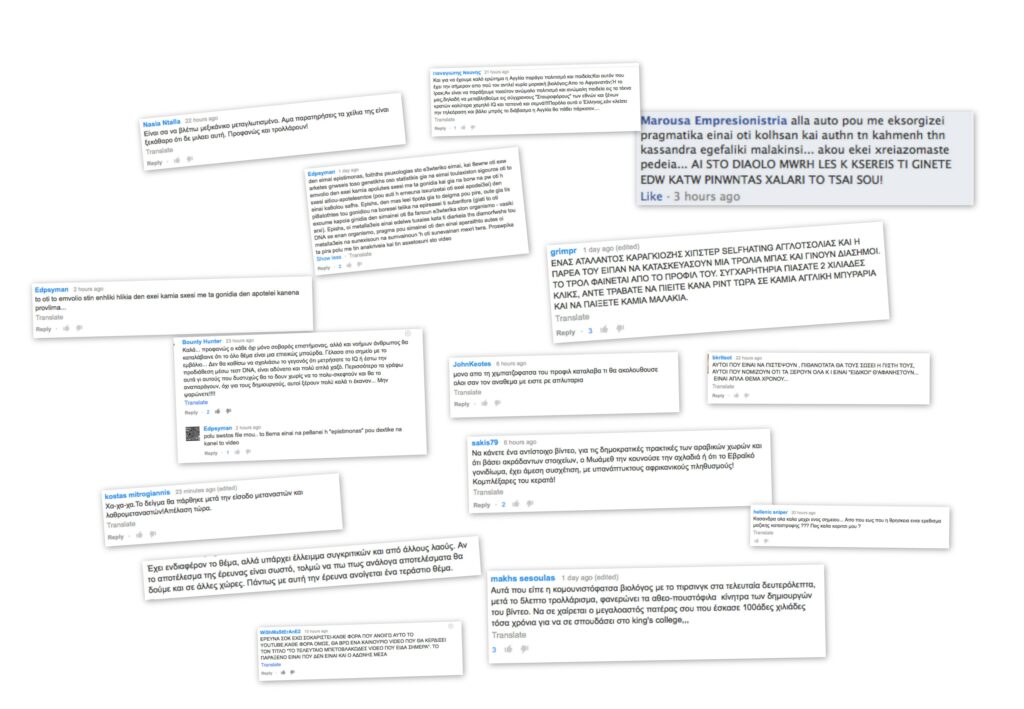
Action ST
@Panke Berlin [Oct 2013]
Odysseas Elytis (nee Odysseas Alepoudelis) was one of two greek poets who were awarded the Nobel Prize in Literature in 1979 (the other being Giorgos Seferis). Elytis’ romantic modernism not only introduced and canonised a new way of writing in greek but most importantly helped in establishing a new understanding of greekness as such. In Elytis’ work, one encounters a transcendental version of greekness that combines both minimalist white-washed antiquity and byzantine times, both paganism and orthodox Christianity, both epic classicism and quotidian peasant life of the Greek countryside. His beautifully written poems have constructed the 20th c. version of intellectual greek nationalism. Elytis’ “Aksion Esti” was set to music by leftist composer Mikis Theodorakis in the 60s turning the poem into a symbol of resistance during the military dictatorship. Anyone growing up in greece is indoctrinated into the melodically toxic world of Elytis, early on.
In Action ST, a series of psychoanalytic encounters with the poem were set up, in order to exorcise it once and for all from the lives and souls of the participants. In Action ST ,the poem transmutes into delirious screams and compulsive movements, a childish improvisation on nationalist trauma.
The Action ST team was Sophia Apostolidou, Alex Dimitriou, Maria Dolores, Foivos Dousos, Alexandros Drosos, Even Steven, Fil Ieropoulos, Alpha Kartsaki, Mariza Tsari, George Tziouvaras
Filmed by Tony Mines in Berlin
RIP Tony xx
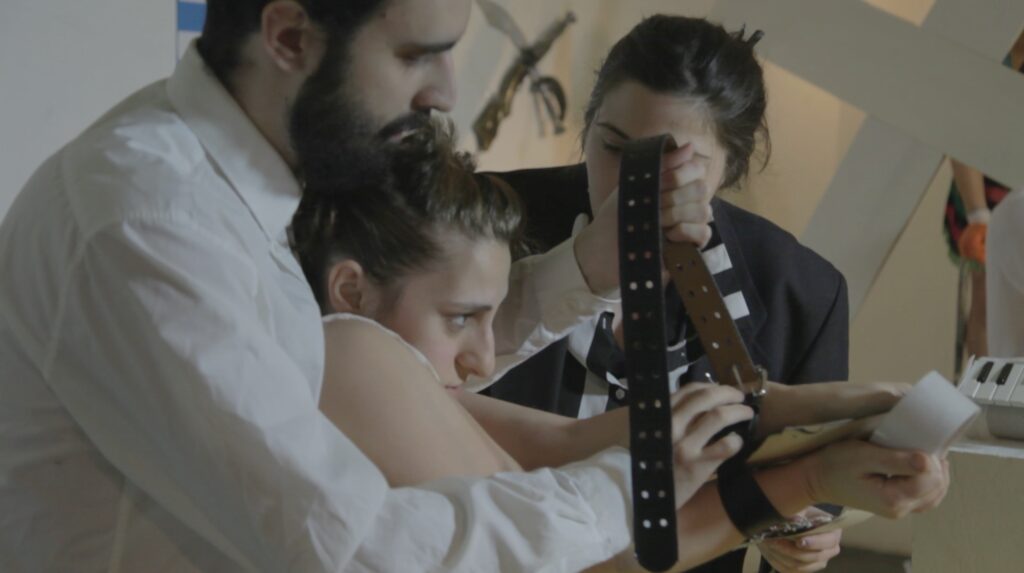
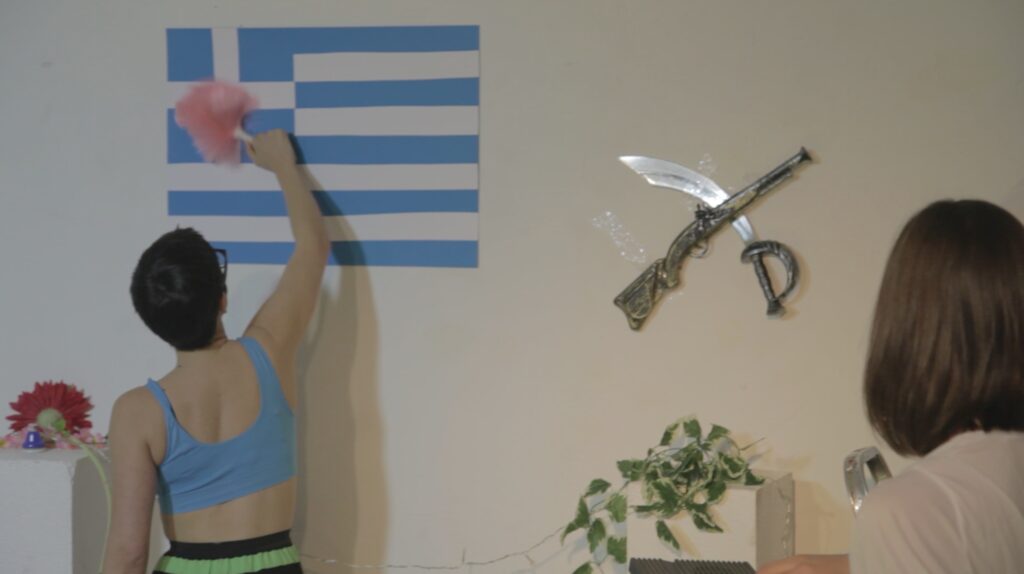
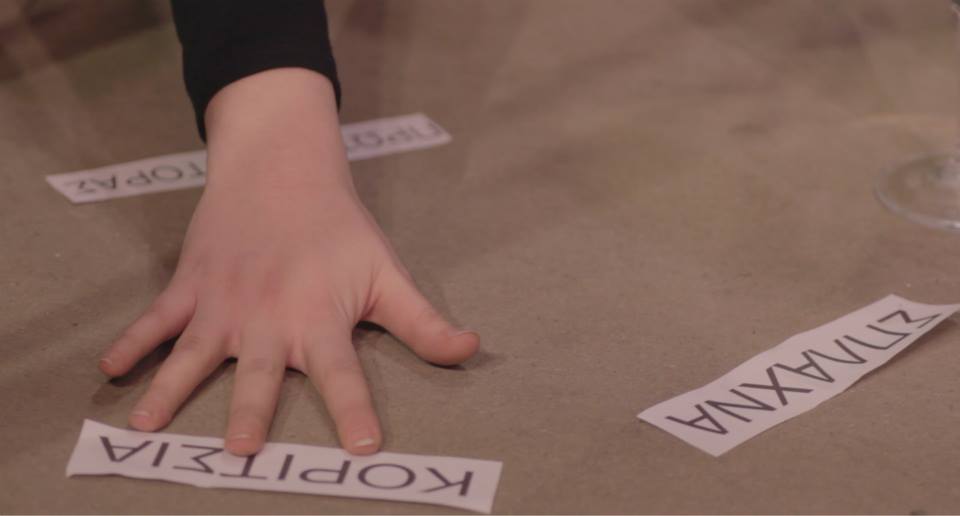

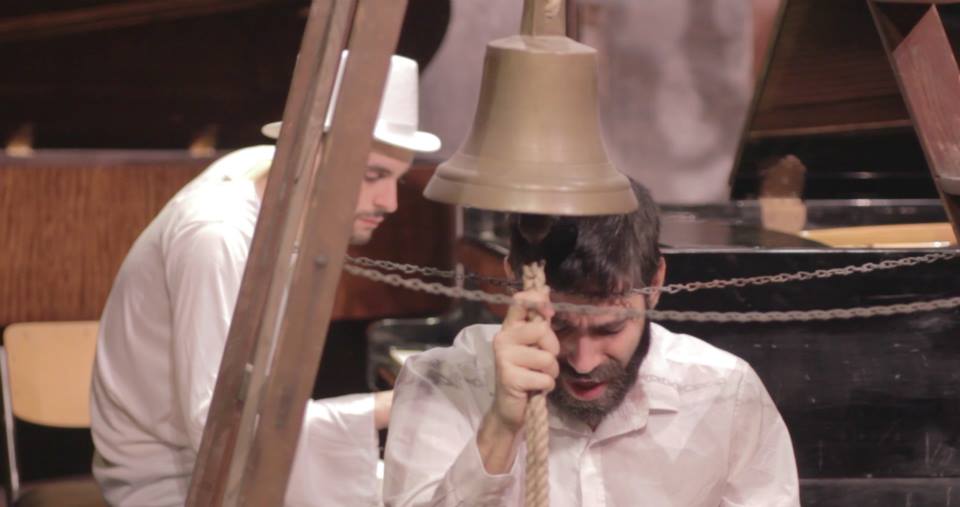
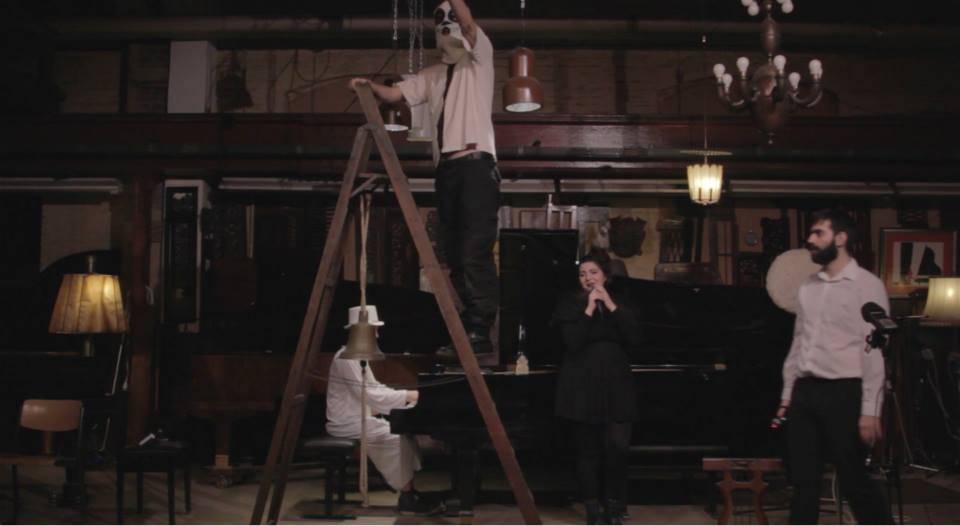
The 100 Worst Greeks
@Athens Biennale [Sep 2013]
The 100 Worst Greeks came as a response to the reality show / documentary by greek TV channel SKAI The 100 Great Greeks, where the public voted on who they think the greatest greeks of all time are. In an attempt to denaturalise ‘common sense’ and the notion of implicit consensus, this alternative list included a medley of intellectuals, fascists, university, professors, TV personalities and artists, creating legitimate questions about what really connects these people.
For the production of the results, FYTA recruited a public online survey which drew over 1500 participants in only a few days and used quantitative methodologies of the social sciences to analyse the results, pushing the methodological tools of statistics to their most ridiculous boundaries. Undoubtedly this is FYTA’s work that has caused most criticism, as the public found unacceptable the way prominent players of greek history coexist in a list with other, not so prominent. In an argument they had with the audience, a visitor, unable to understand why the great were placed next to the despicable, exclaimed: “well, if you want to know, YOU are even worse than Plato!”
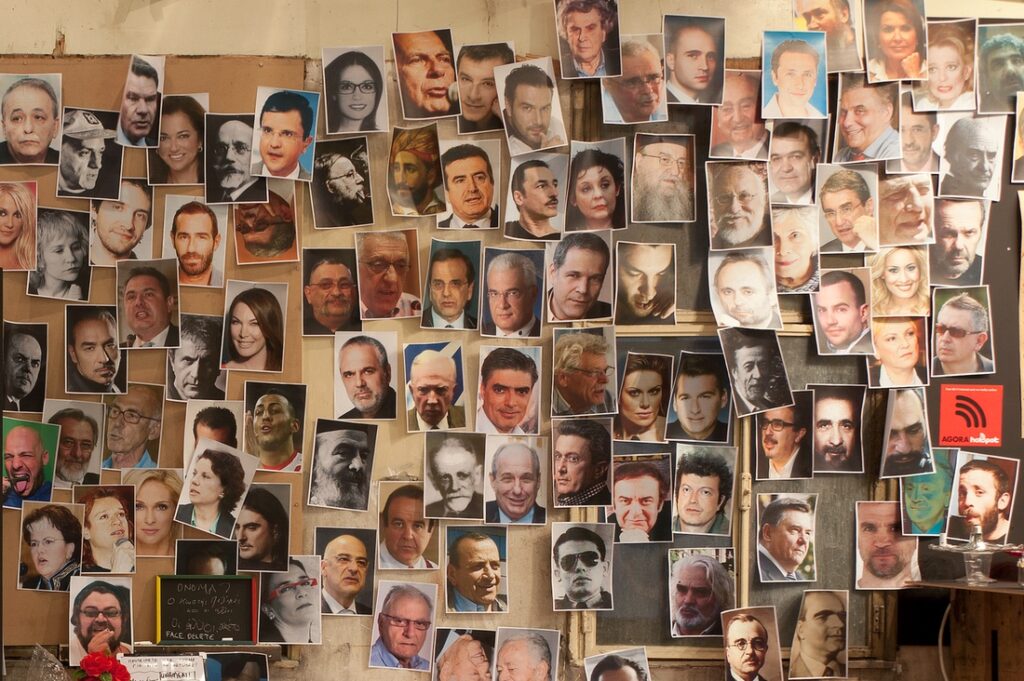
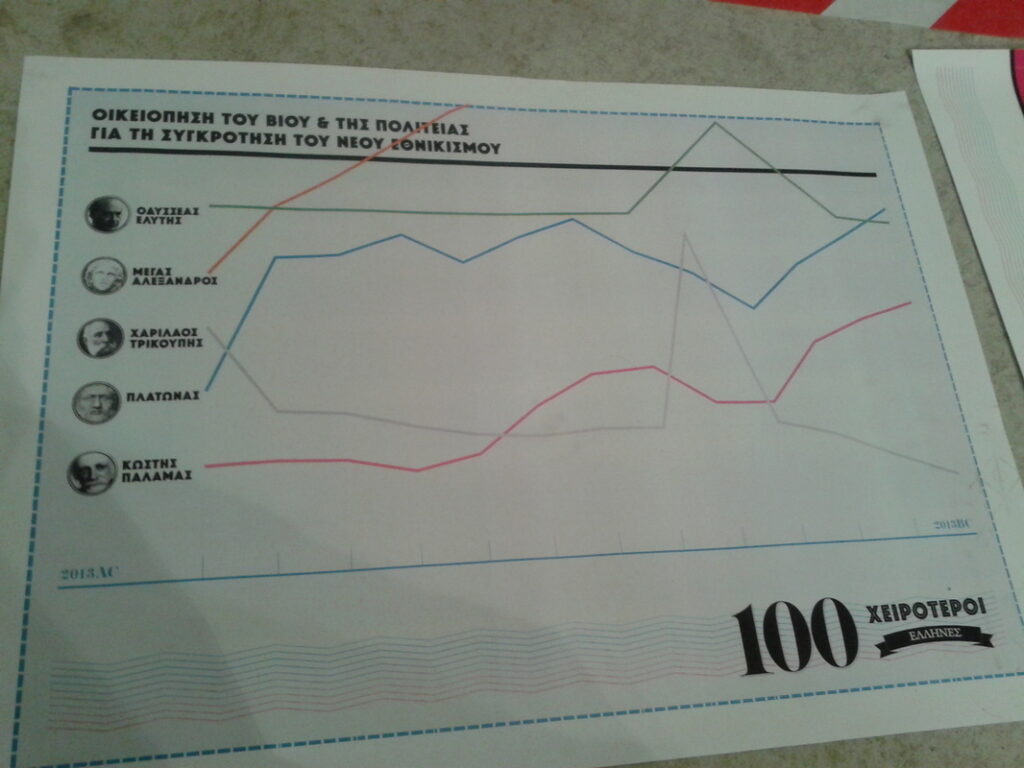
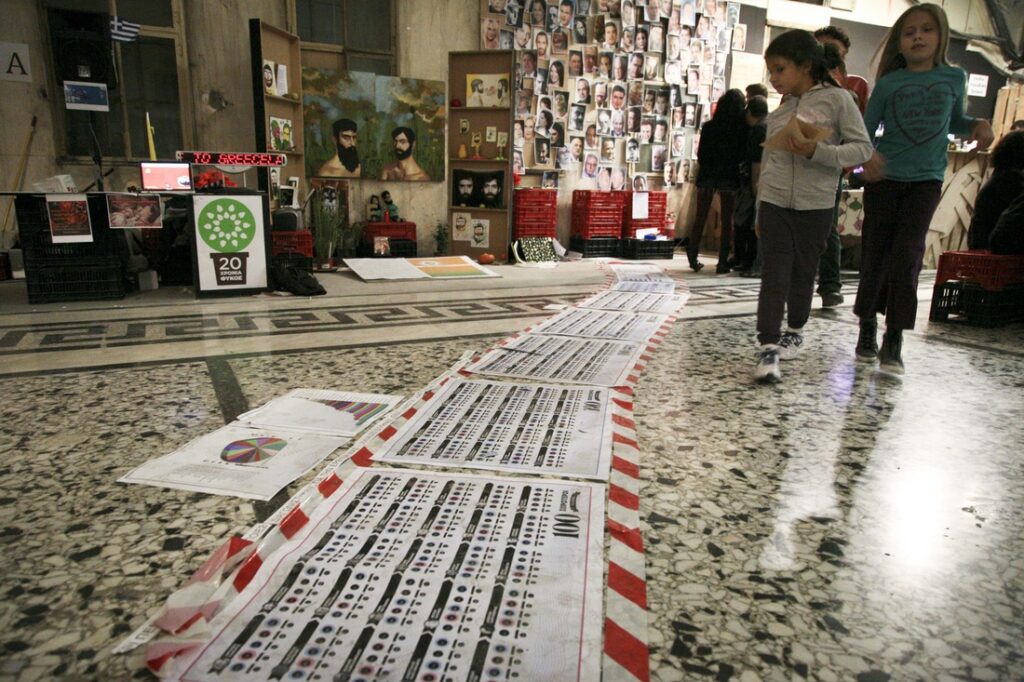
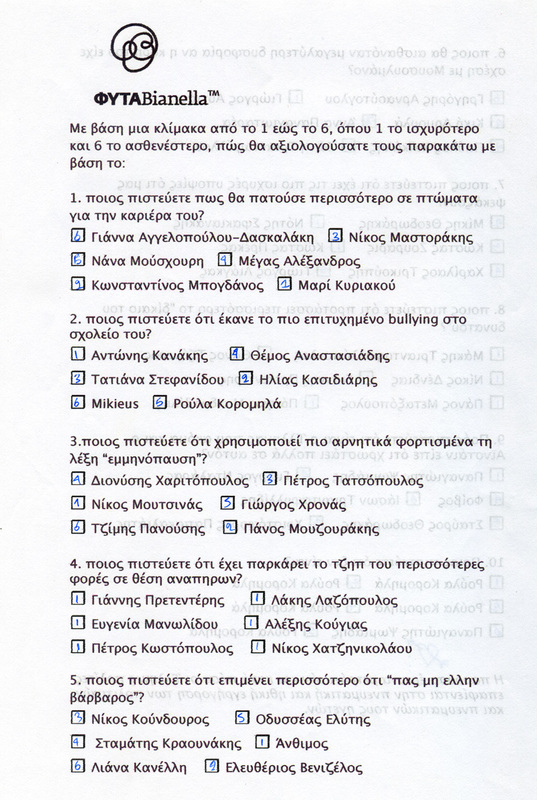
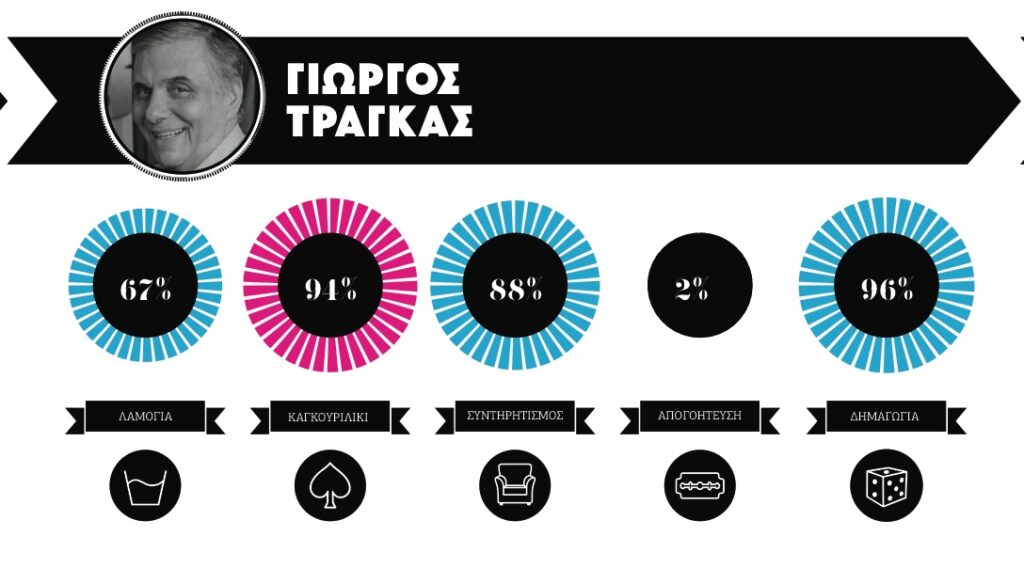
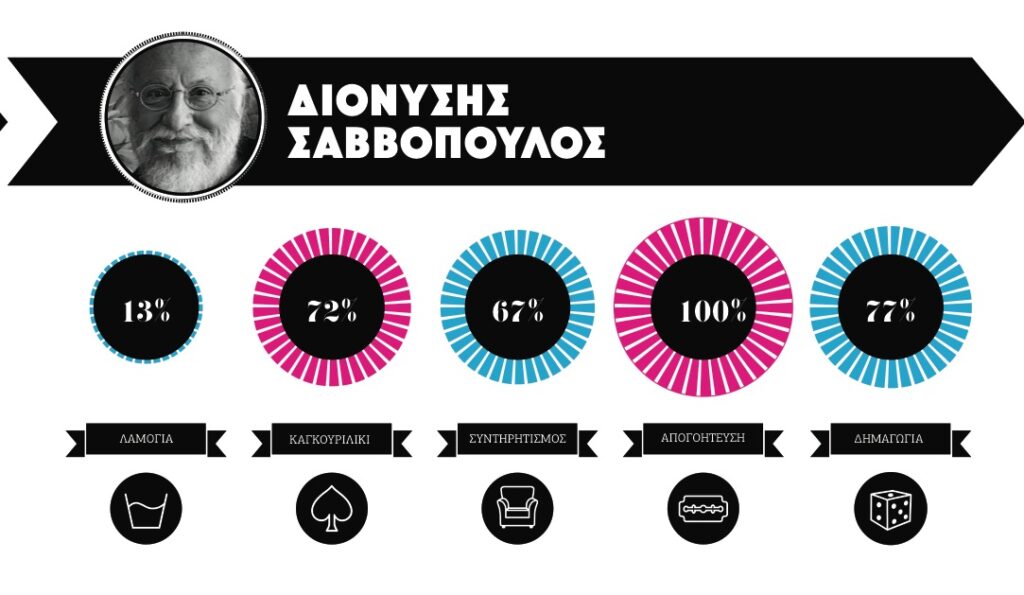
IMF: It Gets Better (Pinkwashing Version)
@Athens Biennale [Aug 2013]
As part of the viral campaign It Gets Better (launched in order to discourage young queers from committing suicide), several large corporations and organizations put together their own It Gets Better video in order to show that not only do they care about gay rights, but they actively participate in a kind of gay activism.
The It Gets Better videos of organizations such as the IMF essentially signify the transformation of the gay liberation movement and struggles into supposedly well-integrated parts of Western liberal democracy. A distortion, which amongst other problems, presents homophobia as an issue outside of a Western context (often projecting the problem on immigrants, the poor and those living in distant parts of Africa and the Middle East). Within this new context, described by Jasbir Puar as ‘homonationalism’, crimes of the colonialist and racist West are washed up in the name of an alleged anti-homophobia. At this point, FYTA intervene with cheeky onscreen text, highlighting the ideological (and psychoanalytic) background of what is said.
In 2015, post-colonial theorist Rahul Rao discussed this artwork in his article ‘Global Homocapitalism’ for the journal Radical Philosophy.
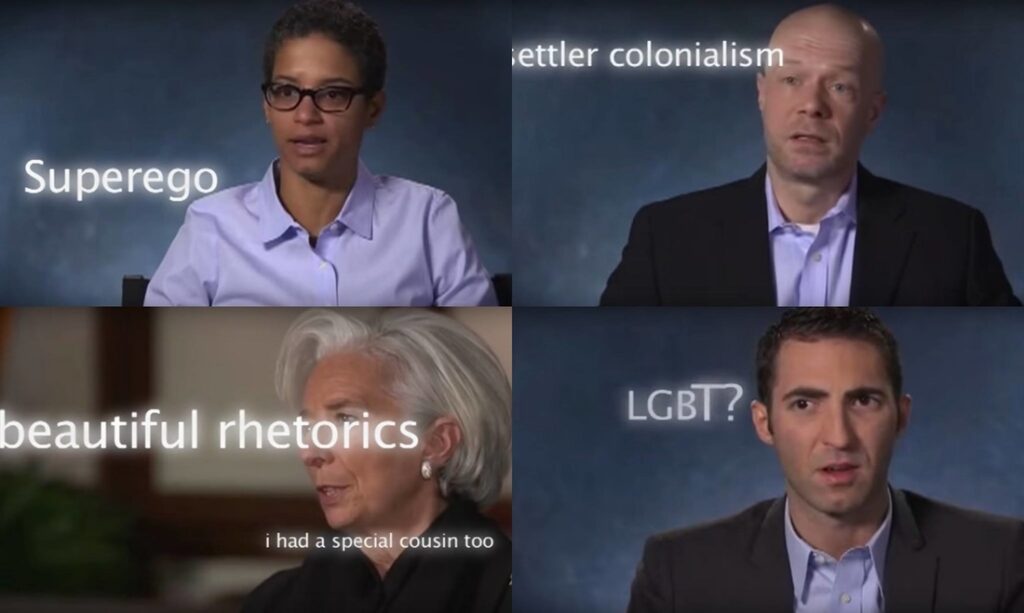
Alvorada Dourada
@Various Locations [Jul 2013]
In this collaboration with performer Pedro De Senna we opened up a discussion around the rise of the greek far right, while at the same time thematised the fetishisation of the greek language as an integral piece of nationalistic discourse. In a controversial move aiming at denaturalising the position of the greek language, we introduce a Brazilian neo-Nazi, who – in order to refine his extreme-right-identity – decided to learn greek. It is a responsibility of every great neo-Nazi, the video tells us, to be fluent in greek.
The first steps in the new language are made through learning racist slogans and then by singing folk-pop songs. The boundaries between every-day greek culture and its alleged fascist diversion blur. Greek language through its metaphorical and metonymic slides oscillates between innocent artistic expression to racial hatred and back again.
This work was to be horrifyingly prophetic for Brazilian politics, as it anticipated the rise of Jair Bolsonaro in Brazil. Pedro De Senna has since produced the sequel to this performance, titled Aurora Dourada, which he presented in 2018 at our festival “The Garden of Dystopian Pleasures”.
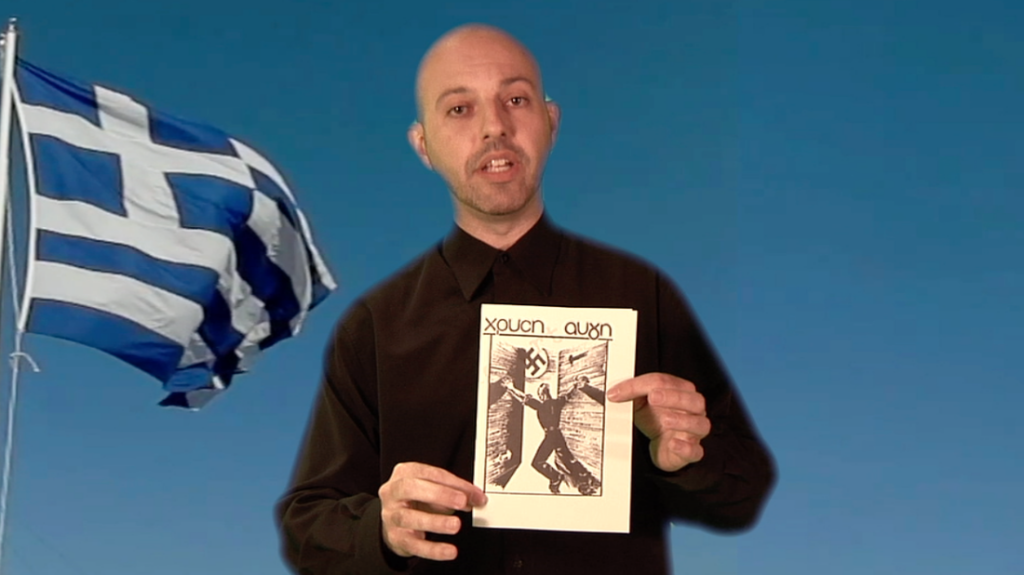
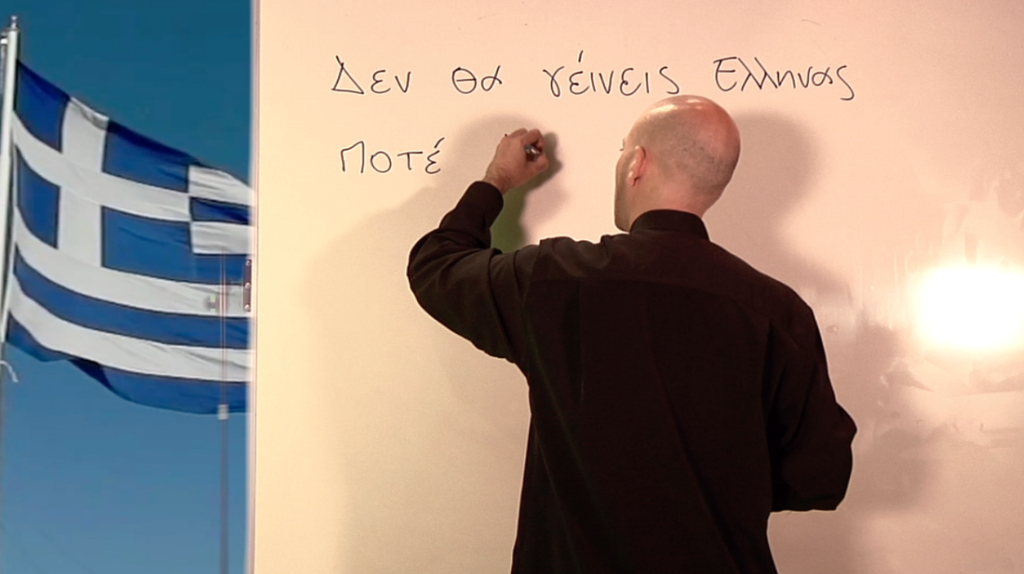
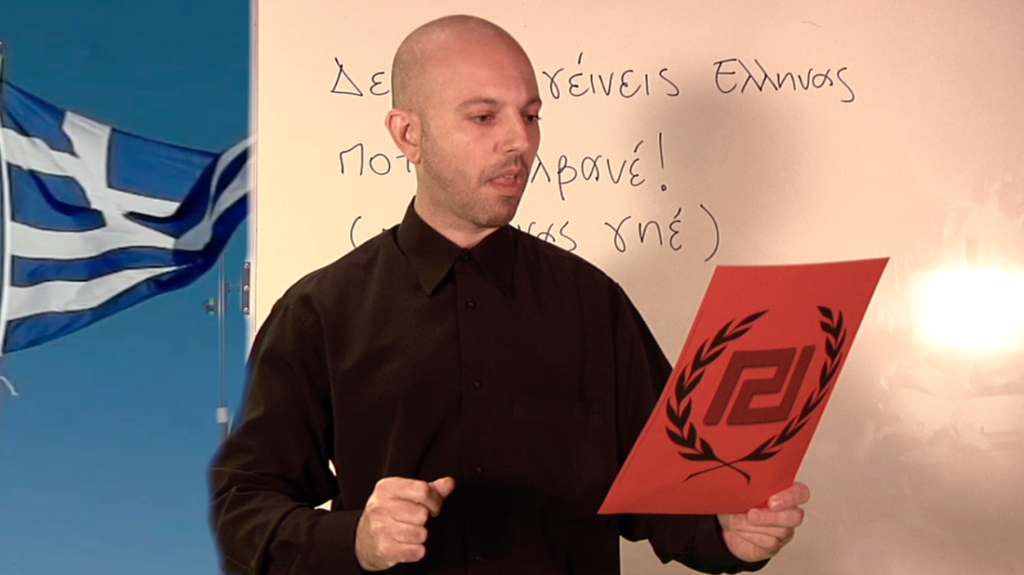
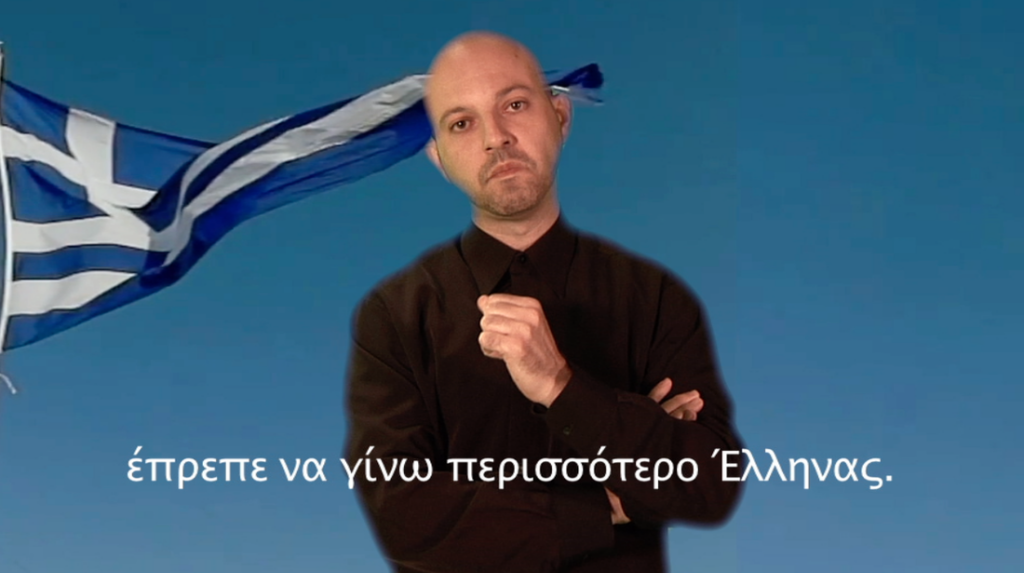
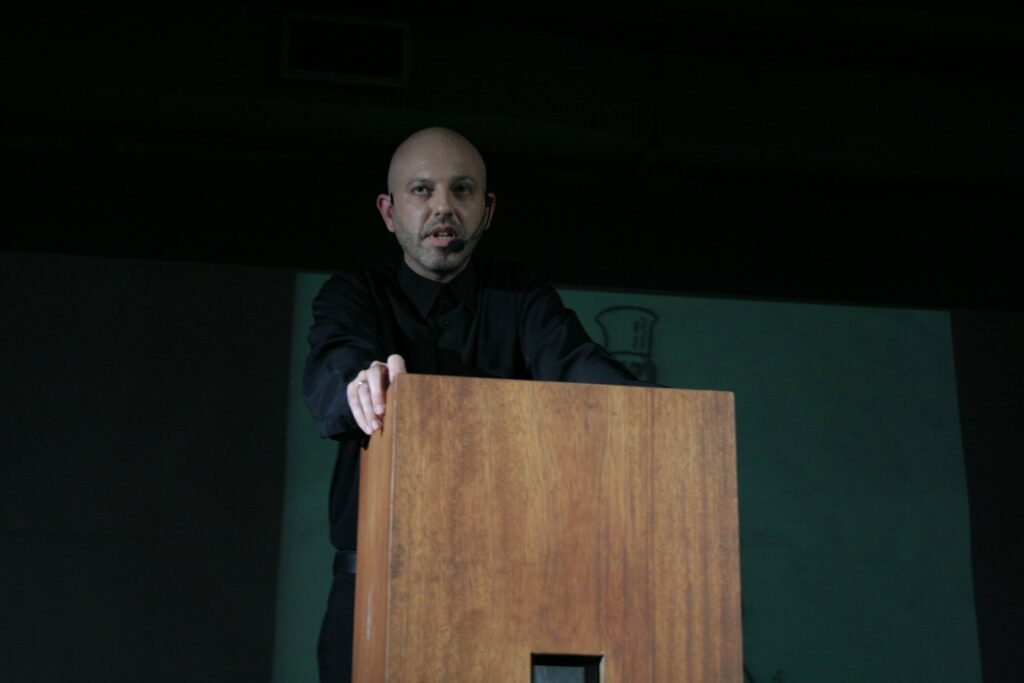
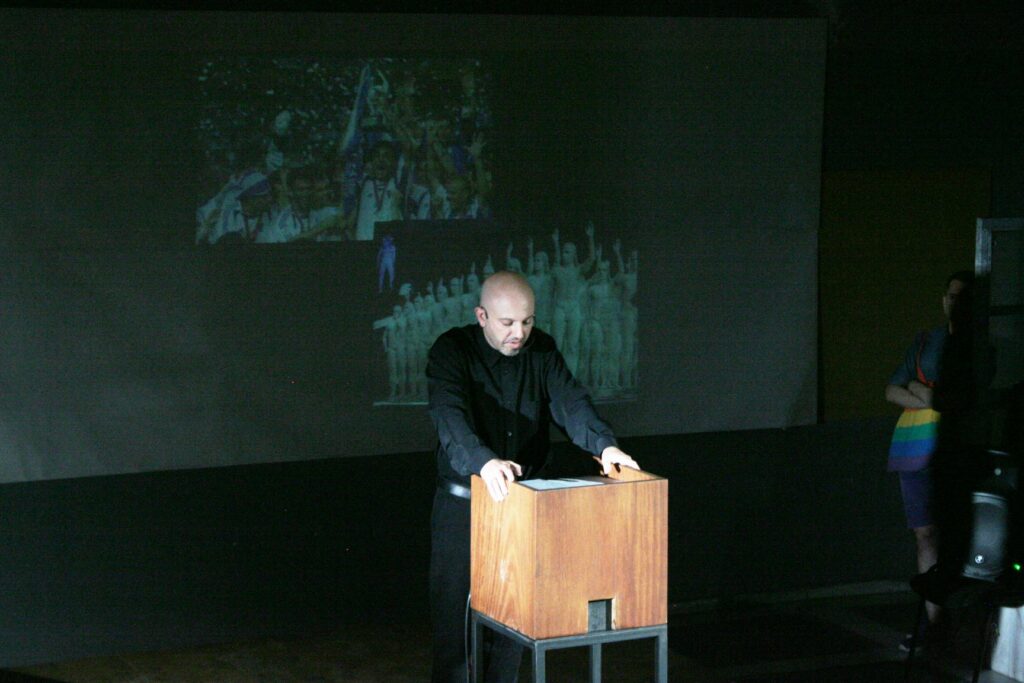
FYTA the Band
@Various Locations [2012 — 2014]
FYTA started very much as a band, a musical project influenced by early-80s DIY post-punk messthetics scenes, creating a mixture of spoken-word/poetry, sampling and instruments they can or can’t play. The fluxus-like approach to composition was accompanied by the conceptual construction of the brand of a band, using the clichés of alternative music and hinting towards KLF’s The Manual.
Initially covering their faces with plants and giving confusing interviews in hip blogs, they constructed a myth of a super-cool anti-band, managing to be considered a must by even the most coolness-driven platforms around, while being harshly critical to those very platforms. Strongly influenced by (or even ripping-off) German anti-music group Die Tödliche Doris, as well as greek situationist trio Dimosioypalliliko Retire, FYTA constructed every single next move carefully, following their first shy LP with a heavy self-referential ‘second-album’ which was released with an audio commentary by the band (DVDstyle). Within a year from the time of their formation, they recruited 20 different artists to make covers of their material, an unacceptable gesture of self-importance, while a year later they released a best-of collection (which actually consisted of unreleased material). They also participated in other people’s albums, officially split three times, presented material ‘live’, wrote letters to record labels and created imaginary beefs with other artists. In a public statement in 2014, they announced that they got bored of music and decided to move on. They still release music occasionally to this day.
